- Starting a Business
- Growing a Business
- Small Business Guide
- Business News
- Science & Technology
- Money & Finance
- For Subscribers
- Write for Entrepreneur
- Tips White Papers
- Entrepreneur Store
- United States
- Asia Pacific
- Middle East
- South Africa
Copyright © 2024 Entrepreneur Media, LLC All rights reserved. Entrepreneur® and its related marks are registered trademarks of Entrepreneur Media LLC

How to Start an Event Planning Business: Your Comprehensive Guide Not sure how to become an event planner? Use this step-by-step guide to launch your event planning business from scratch.
By Laura Tiffany Edited by Brittany Robins May 21, 2024
Key Takeaways
- Event planning can be a great business if you have the right skills.
- People need help executing personal and professional events of all sizes.
- Based on how you structure your business, your startup costs will vary.
Opinions expressed by Entrepreneur contributors are their own.
Some people have a special ability to plan parties — whether they be weddings, large corporate events or smaller gatherings. If you have a knack for tackling complex problems and making big days run smoothly, you might have a future as a professional event planner. Whether you choose to work alone or with a team, starting an event planning service is no small task. Here are some important questions to consider before launching an event planning business, and a step-by-step guide to starting and scaling your business.
Related: Find Your Event-Planning Niche
What is an event planning business?
Event planning is the art and science of ideation, planning, coordination and operation. When a major event needs to run smoothly — whether it's a trade show, nonprofit gala or a major anniversary — people will enlist an event planning service or coordinator. Event planners are key service providers who ensure event production and execution goes off without a hitch , most often used for purposes like:
- Corporate events, like after-work cocktail hours and galas.
- Educational conventions, like graduations or conferences.
- Major promotional events including product launches and fashion shows.
- Celebrations and social events including parades, weddings, birthdays and reunions.
The primary duties of full-time or part-time on-site event planners include:
- Researching venues and vendors prior to the event.
- Selecting the appropriate site for the event.
- Event design and team-building for project management.
- Creating budgets and running fundraisers if necessary.
- Coordinating decor, entertainment and food for the event.
- Sending invitations to attendees.
- Coordinating transportation for attendees to and from the event.
- Arranging accommodations, including seating charts and place settings.
- Coordinating tasks for onsite event personnel, including caterers or entertainers.
- Being on call for any questions or problems that arise in the event-planning process.
- Supervising activities at the event site.
Why do people hire event planning services?
People primarily hire event planning services for two reasons: So that hosts and guests don't have to focus on the inner workings of the event, and so that the event runs smoothly from beginning to end.
Consider a wedding. Many engaged couples hire event planners or event planning services to coordinate, organize and carry out their wedding plans. This helps the couple enjoy their special day and gives them the freedom to focus on getting married rather than worrying about details like catering, parking or the timeline.
Some events are so complex — particularly those with hundreds of guests or more — that it's almost impossible to properly plan and organize them without the help of a specialist. Knowledgeable, experienced event planners know how to organize groups of people, how much food to provide and other details that can make or break an important event.
Related: The Price Is Right: Turning a Profit in the Event Planning Business
Who should become an event planner?
You might consider becoming an event planner if you're organized, love hosting parties and find the challenge of coordinating large events to be thrilling. Planners handle many moving parts at once, some of which require overseeing chaotic work and competing agendas. Event planners also often work weekends and holidays since these are the days when most people schedule events.
Many event planners have backgrounds as managers or coordinators in other industries. The events industry, both for wedding planning and other events, requires excellent communication skills. Obtaining a bachelor's degree in public relations , marketing or related fields can be helpful but is not required. You should also consider acquiring certification for your event planning service, as it can help you cultivate relevant professional skills and attract more job opportunities. Meeting Professionals International (MPI) offers a list of degrees and certificates from various colleges and universities.
You can also become a Certified Special Events Professional or Certified Meeting Planner , both of which are offered by the MPI or the International Live Events Association (ILEA). By earning these certifications , potential clients will know you have the training and experience necessary to take on a complex event.
How to start an event planning business
Step 1: form your company.
To get your event planning business off the ground, you must first form a company, file the right paperwork and create a business plan — which should include the following details:
- The business's name.
- The business's tax structure (Sole proprietorship, LLC, S corp etc.).
- What services you'll provide.
- Market research .
- A management plan.
- Financial factors, including how you'll turn a profit.
Related: Check out these business plan templates to get started.
You'll also want to apply for an employer identification number (EIN), which is essentially a social security number for your business assigned to you by the Internal Revenue Service (IRS). This will allow you to operate your business independently of your personal affairs, help you hire employees and make it easier to file taxes quarterly.
Step 2: Choose your target market
Building on the research you performed to create your business plan, it's essential to find the right market for your services. For instance, if you want to primarily work with weddings, you need to determine how many other planners are in your area, how much you should charge for your services and what offerings you'll need to be competitive.
By doing enough research ahead of time, you'll know exactly what kind of clients to target and what their expectations will be. This will help you advertise your event planning service to be competitive relative to other local planners.
Step 3: Make a financial plan
When you start an event planning business, you'll have to consider not only startup costs but also how the enterprise will grow and how many clients you'll need in order to be profitable. For instance, working from home and primarily by yourself will keep costs low. But if you hire employees, rent office space, or expand to new markets, your monthly expenses will significantly increase – all of these things can add up.
You can always scale your business after acquiring steady work. You may start off as a one-person event planning service that only takes on small events. As you earn money from successful jobs, you can hire employees and rent a warehouse for your equipment, like cameras, chairs and more. You don't have to have all of the growth questions answered when you launch your business, but you should at least have them in mind.
Step 4: Understand the work involved and consider hiring employees
For your event planning service to be successful , you need to fully grasp the nature of each job and determine if — or when — it's time to hire employees. This will vary event to event, so you'll need to determine how much work each event will require. Even the smallest event demands careful attention to detail and advance planning, but as you acquire experience you'll become more adept at forecasting how much help you'll need, if any. For instance, you might hire two or three people to be on-site for a specific event, just to make sure things run smoothly.
Related: The Event Planning Recipe for Success
Step 5: Settle on a price structure and fee basis
How you price your event planning offerings will impact how much business you attract. You can determine your pricing structure and fee basis by things like:
- The market segment you serve: For instance, nonprofit events may have different fee structures than weddings or corporate events. By understanding your event type, you'll know how much to charge and how to structure your fees.
- Your location: If you live in a place with a higher cost of living or a competitive events market, you'll need to price your services accordingly.
- Your reputation: As your business gains a reputation for success — and especially if you're so busy clients are competing for your services — you'll be able to charge a higher premium.
Step 6: Start marketing your event planning service
Once you know how much to charge your clients, it's time to start marketing your event planning service. Consider using tools like Google ads, social media profiles and other digital marketing efforts like email to get the word out about your business. You may even consider newspaper ads, flyers in public buildings or other traditional low-cost marketing tactics . As your business grows, so too will your reputation, meaning you'll likely have to spend less on marketing once you're known. Before you get there, though, it's important to dedicate significant time and resources to marketing your services (learn more here about the tools and strategies that should be part of creating your marketing plan).
Related: 8 Savvy Ways to Promote Your Event Planning Business
Costs of starting an event planning business
The costs of launching your business will vary greatly based on where you live, what kind of clients you work with and how large you intend to scale your operation. At a minimum, you'll need to pay fees to incorporate your business , purchase basic technology like a computer, buy business insurance and spend money advertising. But there are many other potential costs, including certification programs, hiring additional employees , renting office space and more. Here's a breakdown of common expenses associated with event planning, as well as a range of what it might take to get your enterprise off the ground.
Consider Startup Costs
As with any business, the startup costs for event planning vary by the region, the size of your operation and the type of clients you attract. Below are estimates that will help you determine what you can expect to spend in your first year.
| Rent ( ) | $0 | $5,700 |
| Technology and supplies ( ) | $1,000 | $5,000 |
| Licenses and Fees ( ) | $250 | $1,000 |
| Payroll ( ) | $0 | $5,000 |
| Advertising ( ) | $100 | $1,000 |
| Legal ( ) | $120 | $1,500 |
| Insurance ( ) | $400 | $1,200 |
| Accounting ( ) | $1,000 | $5,000 |
*All figures are estimates and subject to change based on factors including location, business size and clientele.
Check out Entrepreneur's other guides and resources today.
Want to be an Entrepreneur Leadership Network contributor? Apply now to join.
Editor's Pick Red Arrow
- You Might Unknowingly Rely on This 100-Year-Old Business . Its Third-Generation Leader Reveals the 'Secret Sauce' for Lasting Success — and $850 Million in Annual Revenue .
- Lock This Brilliant 'Cohort' Trick Can Help You Come Up With a Business Idea Worth Millions
- How to Maximize Every Hour of Your Day for Unstoppable Productivity
- Lock Billionaires Warren Buffett, Bill Gates, Jeff Bezos and Mark Zuckerberg Have 3 Habits for Success in Common — But Very Different Routines. Which One Resembles Yours?
- Here's How to Save on Fast Food This Summer — And Even Score Some for Free
- Lock This Flexible, AI-Powered Side Hustle Lets a Dad of Four Make $32 an Hour , Plus Tips: 'You Can Make a Substantial Amount of Money'
Most Popular Red Arrow
Sam's club is removing a beloved free perk and members are not happy: 'no benefits for the cost'.
Disgruntled Sam's Club members are complaining on social media about the new change, effective August 19.
This 27-Year-Old Started a Side Hustle on Facebook Marketplace — Now the Gig Earns Over $500,000 a Month
Valentina Zapata wanted "something positive to do on the side" — and it turned into a major money-maker.
How Much Does It Cost to Develop AI? The CEO of an $18 Billion AI Startup Reveals the Current Price.
There's a sky-high bar to creating AI, and an expert says it will get even more expensive.
These Creative Marketing Hacks Can Help Deliver Big Returns For Your Bootstrapped Startup
When resources are tight, creativity becomes your most valuable asset in marketing. In this challenge lies an opportunity to innovate, stand out and boost marketing ROI.
Get AI Photo Editing Support with This $150 Deal
Act fast during this limited-time price drop.
Is Franchising a Good Side Hustle? It Depends on These 3 Factors
As a franchise consultant, I am often asked whether franchising can be done on the side while continuing to work in a full-time corporate position. The answer? Ultimately, it depends on your circumstances. Here's what I mean.
Successfully copied link
- Business Ideas
- Registered Agents
How to Start an Event Planning Business in 14 Steps (In-Depth Guide)
Updated: February 14, 2024
BusinessGuru.co is reader-supported. When you buy through links on my site, we may earn an affiliate commission. Learn more
The event planning industry is estimated to grow at a compound annual growth rate (CAGR) of 11.8% . As celebrations, conferences, and corporate events continue to grow in popularity and scope, the demand for professional event coordination keeps rising.

With new technological tools and social platforms emerging, event planners have ample opportunities to attract clients across industries. Orchestrating memorable and logistically seamless events requires keen attention to detail, extensive vendor networks, and creative vision.
This guide will help you learn how to start a event planning business. Topics include market research, competitive analysis, registering an EIN, obtaining business insurance, and other important elements of a successful event planning business.
1. Conduct Event Planning Market Research
Market research is essential to starting a party planning business. It offers insight into creating a business plan for your own event planning business, finding the top wedding planning and party planning equipment, and more.
Some details you’ll learn through event planning market research include:
- The second largest clients are non-profit organizations and associations, investing around $2.3 billion annually.
- Beyond direct spending on event planning services, the related transportation, hospitality, and catering sectors also benefit significantly from the events industry.
- According to Meetings Mean Business, conferences and events in the US directly support over 5.9 million jobs.
- Virtual and hybrid events are also projected to see dramatic growth in the coming years as digital tools expand, opening up new opportunities.
- With globalization and rising corporate budgets driving event demand ever higher across most industries, new organizers can tap into this momentum.
Success rests on building up specialized expertise, creativity, organizational skills, and an extensive professional network. The barriers to entry remain relatively low but scaling up remains challenging in this competitive sphere.
2. Analyze the Competition
Analyzing the competition is a critical step when starting an event planning business. This analysis should evaluate both local brick-and-mortar competitors and broader online players. This will help you form a solid business plan, choose the best event management software, price according to your target market, and spot trends in the event planning service industry.
First, identify event planning agencies operating in your geographic area across various tiers and specializations. Research their specific services, pricing, types of events produced, and total capacities.
Developing a comprehensive competitor grid allows new planners to map the local landscape while spotting unmet needs or gaps to fill. It also aids in benchmarking potential pricing levels.
In addition to place-based competitors, analyze industry leaders and fast-growing startups in the online space. Study their website formats, content strategy, search visibility, social media engagement levels, professional partnerships, and other digital components.
While not directly competing for local clients initially, these firms set benchmarks for best practices across SEO optimization, accessibility options, customer service infrastructure, and innovation. New ventures should emulate and learn from category leaders in the virtual world even when focused on a specific metro region offline.
By scouting the most successful online and offline players, new planners can craft differentiated value propositions and streamlined operational processes to stand apart. Competitor analysis illuminates prevailing industry norms while revealing creative directions and offerings prime for disruption.
3. Costs to Start an Event Planning Business
Launching an event planning business requires careful financial planning and cost analysis even before taking the first client. Between startup expenses and ongoing overhead, new entrepreneurs must budget adequately to turn a profit and fuel growth. Here is an overview of common costs to expect:
Start-up Costs
- Legal formation & licensing – $500-$2,000 to incorporate plus any local business permits
- Office basics – $3,000-$5,000 for basic furniture, computer equipment, software, supplies. Alternatively, you could rent some of the equipment , reducing your start-up costs but increasing your ongoing costs.
- Website development – $3,000-$5,000 for custom design and content population
- Branding – $500-$2,000 for logo design, business cards, templates
- Marketing assets – $2,000-$5,000 for advertising, printed collateral
- Initial staffing – Many planners start as solopreneurs before hiring but budget $40K+ for the first full-time employee
- Optional storefront space – $2,000-$5,000 per month for rental lease, minimal build-out budget
Ongoing Costs
- Office rental – $1,000+ per month for coworking desk or basic retail footprint
- Software subscriptions – $100-$500 per month for CRM system, design tools, productivity suites
- Contract workers – $2,000+ per month for graphic designers, writers, virtual assistants
- Professional development – $500+ for continued event planner education
- Marketing – $500-$2,000+ per month for digital ads, content creation
- Insurance – $800+ annually for general liability & event cancellation policies
- Legal & accounting fees – $3,000 for attorney, accountant/bookkeeper
- Staffing budgets – Employee salaries from $40,000+, health benefits, payroll taxes
- General overhead – Utilities, repairs, contingencies
With lean operations, new event planners can launch with around $20,000 in startup funding. However, most entrepreneurs spend over $100,000 on initial costs including full-time staff and brick-and-mortar spaces. Careful financial planning allows room for unexpected expenses while setting realistic budgets to turn a first-year profit.
4. Form a Legal Business Entity
When starting an event planning company, the legal structure you choose determines everything from day-to-day operations to personal liability exposure. While sole proprietorships offer simplicity and partnerships enable resource pooling, limited liability companies (LLCs) deliver the best blend of protection and flexibility for growth.
Sole Proprietor
As a sole proprietor, you retain full control and avoid corporate taxes. However, your personal and business assets stay the same – leaving all your funds at risk if sued over vendor disputes or event accidents. This unlimited liability generates immense stress for solopreneurs in such a high-risk sector.
Partnership
Partnerships allow you to share the workload with a co-owner through joint contributions of capital and skills. But you still bear responsibility for your partner’s managerial mistakes or financial debts. Negotiating an equitable partnership requires complex legal guidance.
Limited Liability Company (LLC)
Establishing an LLC shields your assets from any business-related claims or judgments. As an LLC owner, you cannot lose more than your invested capital. This liability buffer promotes bolder decisions to advance competitive positioning and profits over time.
Corporation
A corporation is the entity of choice for large businesses. It is the most protective, but also the most complex entity. For a small event planning business, forming a corporation would be a long and unnecessary process compared to the other options.
5. Register Your Business For Taxes
An employer identification number (EIN) serves as a business entity’s tax ID number for federal tax purposes. Just like an individual uses their social security number to file personal taxes, a business needs its own unique EIN to handle company taxes and other regulatory documents.
Event planning businesses should apply for an EIN as soon as they officially form their business structure. The IRS offers free online registration for both new and existing entities through this simple application process:
- Step 1) Provide basic information about your company including legal name, address, and ownership details.
- Step 2) Specify the reason for requesting the EIN, choosing “Started a new business” for a newly launched event planning venture
- Step 3) Submit your contact information and EIN application digitally in just a few minutes
Once obtained, an EIN enables event planners to open business bank accounts, apply for required licenses/permits, hire employees process payroll, and file annual tax returns.
Most states also require event planning companies to register for sales tax collection certificates through their revenue department websites if selling taxable goods and services. These state-level licenses link directly to your federal EIN.
6. Setup Your Accounting
Proper financial practices form the bedrock of a thriving event-planning business. From bookkeeping and taxes to banking and expenditures, optimizing these monetary flows requires specialized accounting expertise meshed with efficient software tools.
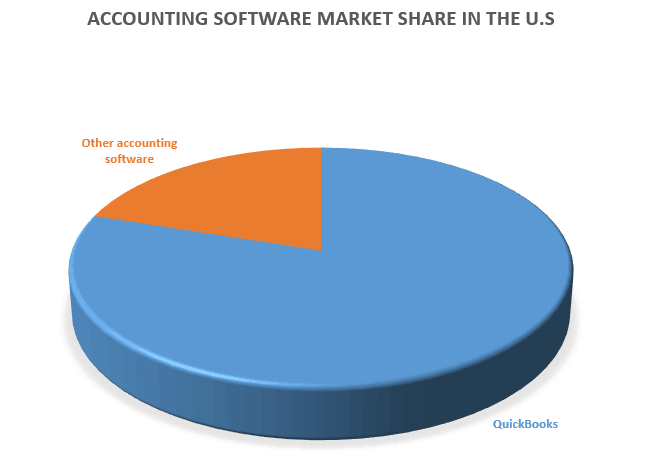
Open a Business Bank Account
After structuring your business entity, immediately establish dedicated financial accounts and tracking. Business banking simplifies separating commercial and personal transactions while enabling essential capabilities like merchant processing. Choose a checking account with unlimited transactions to maintain liquidity for frequent vendor payments.
Accounting Software
Automating entry categorization through accounting software drastically reduces paperwork and manual reconciliation needs. Packages like QuickBooks seamlessly sync with bank/credit card accounts to log all financial activity. The visual dashboards and custom reporting also provide real-time performance analytics to guide smarter decisions.
Hire an Accountant
While technology paves the path for self-service bookkeeping, partnering with an accountant alleviates tax headaches plus auditing risks. These financial specialists handle payroll, produce clean quarterly/annual statements, optimize write-offs/deductions, and ensure full compliance across local, state, and federal requirements.
7. Obtain Licenses and Permits
Before hosting their first event, new planners must secure the necessary licenses and permits to legally operate while minimizing liability risks. Find federal license information through the U.S. Small Business Administration . The SBA also offers a local search tool for state and city requirements.
- General business license – Nearly all municipalities require annual registration of any company based within their jurisdiction, regardless of sector. These straightforward licenses collect minor fees in exchange for formal monitoring that ensures compliance with zoning, building codes, and other administrative rules.
- Special event permits – Local governments or private venues mandate dedicated permits when staging occasions expecting substantial attendance like conferences, concerts, races, or large parties.
- Liquor licenses – In addition to the basic business permit, event companies hoping to sell alcohol at hosted functions in certain public places or private venues with broader beverage programs must hold active liquor licenses.
- Food safety certification – Catering elements of an event require meeting health department standards. Some regions necessitate training courses and compliance audits when handling and serving food. Mobile cart/truck permits similarly require approval based on equipment and handling procedures.
Consult local municipal portals to identify all needed licenses, then state entities for sector-specific permits around high-risk activities. Lawfully securing the proper credentials protects both planners and their clients.
8. Get Business Insurance
Even with extensive risk management protocols, unforeseen accidents or incidents at planned events can spur lawsuits that financially devastate unprotected companies. Purchasing tailored business insurance policies greatly mitigates this liability exposure.
Without adequate coverage, a single massive claim could force an event planning venture to fold by wiping out precious working capital. Common legal actions from guests, vendors, or venue owners related to injuries, damaged property, contract disputes, or negligence might seek six or even seven-figure payouts.
Paying such exorbitant settlements out-of-pocket would irreparably sink most small operators. Business interruption stemming from a canceled event could also cut off vital income flows right when legal fees swell. Top carriers like The Event Helper and Progressive offer customized protection including:
- General liability – Covers 3rd party bodily injury and property damage claims
- Event cancellation – Reimburses for canceled event loss of income
- Professional liability – Handles errors and omissions around client work
- Cyber liability – Mitigates data breaches and hacker attacks
Purchasing the right insurance begins with a needs assessment and consultation with qualified brokers familiar with the unique risks event planners face. They help tailor tiered solutions balancing premium costs and coverage limits based on potential vulnerabilities.
9. Create an Office Space
An office provides event planners with physical infrastructure enabling smooth operations, productive work routines, and polished client meetings. The optimal setup balances functionality, aesthetics, and cost based on business stage and location-based needs.
Home Office
Home offices offer ultra-low overhead with maximum schedule flexibility for solo entrepreneurs. Spare bedrooms readily transform into functional command centers for administrative work, phone calls, and virtual collaborations. Particularly benefiting rural planners not needing to meet local clients daily, dedicated spaces within a residence rent around $100 monthly.
Coworking Office
Coworking spaces like WeWork provide stylish, professional environments conducive to focus while enabling networking with other site members. Open desk rentals typically run $300+ monthly across most metro markets. For teams needing meeting rooms and private office spaces, costs scale to $800+ monthly. While positioning brands as modern companies, the variable month-to-month terms simplify growth projections.
10. Source Your Equipment
Launching an event planning venture requires acquiring key equipment to execute successful gatherings, while carefully balancing initial outlays. Savvy entrepreneurs source these vital materials both new and used from diverse suppliers:
Brand-new laptops, printers, cameras, and software pack reliability and performance but strain startup budgets. Entry-level packages sufficiently support early operations with basic Word/Excel systems spanning $300+, high-quality DSLR camera outfits from $750+, and versatile printer/scanner combos averaging around $300.
Lightly-used electronics provide immense savings over new ones while retaining plenty of utility. Scout local classifieds like Craigslist and Facebook Marketplace for laptop deals under $100 and camera gear deals up to 70% off retail prices.
Equipment rental shops provide affordable short-term access to pricey items like speakers, stages, and furniture that planning agencies cannot justify buying outright. Most inventory rents for 5-10% of the purchase price per day with delivery/pickup. Useful for outfitting large one-off events.
Long-term equipment leasing enables the use of essential assets like vehicles and expensive tech across 12-48 months for small recurring fees, avoiding major outlays. Lease approvals depend on business financials and credit history.
11. Establish Your Brand Assets
Cultivating a strong brand identity proves essential for event planning agencies striving to attract clients in crowded marketplaces. Strategic moves like securing a personalized phone system, crafting sleek visual assets, digitizing operations through polished websites, etc. boost recognition and trust in equal measure.

Get a Business Phone Number
Acquiring designated business phone numbers and extensions through advanced VoIP platforms like RingCentral conveys professionalism from first contact. Callers reach responsive representatives instead of shaky personal devices prone to poor service.
Design a Logo
A logo symbolizes the visual ethos of an events company. Bold, lively marks composed on DIY sites like Looka feel fitting for stirring experiences while minimalist icons may suit corporate planners. Clean icons also ease embroidery on shirts and other merch.
Print Business Cards
Business cards enable establishing immediate connections at venues and industry gatherings by passing memorable branded collateral. Matching the fonts, colors, and symbols from logos funded through vendors like Vistaprint ties assets together.
Buy a Domain Name
Securing matching domain names raises online visibility and credibility during digital searches for regional event support. NameCheap guides new owners through domain valuations, availability checks, and purchase processes to acquire their .com identities.
Build a Website
Building out full websites demands weighing the cost/control tradeoffs of hiring web developers versus utilizing simplified DIY sites like Wix . The former route engages experts to code custom designs while the latter enables affordable self-service creation like Fiverr .
12. Join Associations and Groups
Beyond online brand-building, event planners gain immense value by actively participating in local professional associations, gatherings, and digital communities. Tapping this hive knowledge aids continuous skills development while forging collaborations and client referrals.
Local Associations
Industry associations like Meeting Professionals International contain established groups across most metros. Monthly meetings cover trending challenges plus open idea exchange and job boards link talent with roles. Membership fees that enable access to these networks range from $100 to 500 annually depending on region and applicant experience level.
Local Meetups
Attend area business events and tradeshows like those discovered through Meetup which compile upcoming webinars, conferences, and networking happy hours. Develop authentic connections with venue managers, caterers, rental vendors, and fellow planners who later trade subcontracts on larger events. Entry fees average $20 per session.
Facebook Groups
Vast troves of experiential knowledge hide amid planning communities inside Facebook Groups like Creative Event Planners and Party Planners & Event Organisers . Digging through the innumerable archived conversations reveals referrals for all vendor types from photographers to security guards plus new angles on costs and client preferences based on geography. Signing up is free.
13. How to Market an Event Planning Business
Promoting events expertise through consistent marketing enables planners to fill calendars with coveted bookings. Balancing digital outreach scalable to wide audiences and personal relationship-building grows community authority plus positive word-of-mouth referrals.
Referral Marketing
Satisfied party and conference clients eagerly recommend services after seamlessly executed celebrations leave lasting impressions on their guests, employees, or business partners. Offer branded giveaways or discounts on future bookings to motivate sharing on social media and referring associates.
Digital Marketing
Digital tactics wield incredible reach to engage prospects plus influence search visibility:
- Launch Google Ads campaigns to display services when users search for related keywords like “corporate event planners”
- Run Facebook and Instagram ads targeted locally by interests like “conferences”
- Post TikTok videos displaying behind-the-scenes event footage
- Start a planning advice blog updated weekly with SEO-optimized articles
- Send monthly email newsletters with venue spotlights and seasonal promotions
Traditional Marketing
Traditional options establish visibility and trust through long-lasting community presence:
- Distribute printed flyers and mail promotional postcards to regional HR contacts
- Schedule radio spots on local stations before major holidays or during conference seasons
- Rent eye-catching billboard space along heavily trafficked commuter routes
- Sponsor booths at annual business or tourism conventions to meet event organizers
- Host public mixers at recently opened venues to connect with new clientele
Synchronizing digital efficiency with physical relationship-building helps event businesses continually expand influence and bookings.
14. Focus on the Customer
Delivering exceptional customer service forms the cornerstone of a thriving event-planning business. Referral rates directly tie to exceeding partner and client expectations through responsive communication, transparent pricing, and seamless execution.
Venue owners and vendors constantly evaluate new planners before trusting precious bookings to unproven partners. Glowing word-of-mouth shifts leverage during these crucial vendor negotiations as applicants showcase rave reviews from regional players.
Similarly, the corporate clients and non-profits hosting family reunions, galas, and conferences assess planner competency through each interaction. It’s vital to present polished responsive proposals, address all questions promptly, and carefully guide stakeholders from conception through the final farewell toast.
Impressing guests through personal touches like customized menus or surprises for the guest of honor sparks appreciation. When audiences leave galvanized by a perfectly orchestrated event aligned with organizational values/goals, they eagerly recommend partners for future functions.
In an industry dependent on intimacy and trust, delivering exceptional customer journeys wins repeat business and referrals that allow for sustainable company growth in competitive event markets.
You Might Also Like
January 26, 2024
0 comments
How to Start an Equipment Rental Business in 14 Steps (In-Depth Guide)
The equipment rental industry is a major market, projected to grow at a compound ...
January 15, 2024
How to Open a Tattoo Shop in 14 Steps (In-Depth Guide)
The global tattoo industry has exploded in popularity over the last couple of decades. ...
January 9, 2024
How to Start a Glass Blowing Business in 14 Steps (In-Depth Guide)
The glass blowing and art glass industry brought in over $3.54 billion in 2022. ...
January 8, 2024
How to Start a Computer Repair Business in 14 Steps (In-Depth Guide)
The global computer repair industry brought in over $34 billion in in 2024. With ...
Check Out Our Latest Articles
How to start a dog clothing business in 14 steps (in-depth guide), how to start a vintage clothing business in 14 steps (in-depth guide), how to start a bamboo clothing business in 14 steps (in-depth guide), how to start a garage cleaning business in 14 steps (in-depth guide).
How to Start an Event Planning Business in (2024): Step-by-Step Guide

Free How to Write an Event Planning Business Plan + Free Template Template
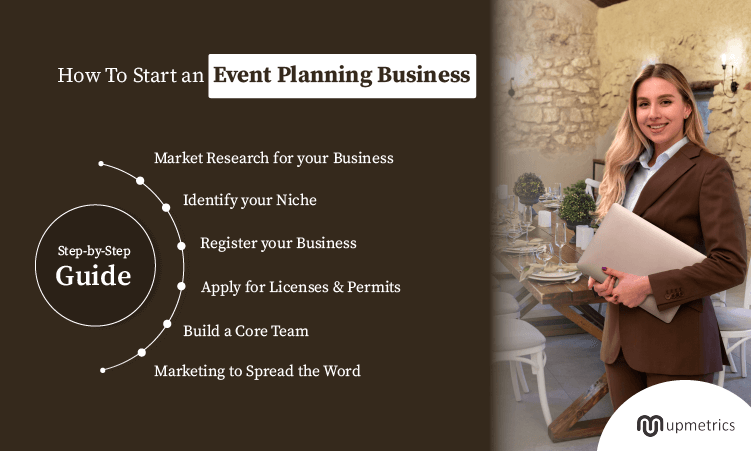
The joy of making special days and big events even more special for the attendees seems exciting right? This is what event planners exactly do.
Whether it’s birthday celebrations, weddings, anniversaries, or corporate galas, the demand for expert event planners is soaring.
Starting an event planning business can be a great move because initially it needs a small investment, and you can make good money out of it.
It is a profitable venture but if are you confused about how to start an event planning business , then let us understand it through this guide.
Get to know the basics of event planning
Before you start getting into the process of starting an event planning business, you should know the basics of event planning, like what would be your responsibilities, what kind of events are there, etc.
So let’s get started:
Event Planning is most often used for purposes like
- Social Events: Weddings, birthdays, anniversaries, reunions, etc
- Corporate Events: Seminars, workshops, conferences, product launches, award ceremonies, gala dinners, etc.
- Cultural and Art Events: Art cultural celebrations, exhibitions, music festivals, etc
Key responsibilities of an Event Planner include
- First of all, consult with your client properly before the event to understand their needs, objectives, and preferences.
- You need to build a team as per the event type, whether it is a corporate or social event.
- Prepare a budget to ensure that the event’s overall costs stay within the financial constraints of the customer.
- Choose a venue that aligns with the event’s size, and theme.
- Oversee the various vendors including florists, caterers, and photographers ensuring that they are all synchronized with the timeline.
After having a glimpse of the basics of event planning business, let’s see what is required next to start your business journey.
Quick Steps to Start an Event Planning Business
- Conduct Industry and Market Research
- Identify Your Event Planning Niche
- Prepare an Event Planning Business Plan
- Consider Startup and Operations Costs
- Paperwork and Legal Registration
- Figure Out Pricing Strategy
- Get Licenses, Permits, and Insurance
- Build a Core Team
- Marketing to Spread the Word
1. Conduct Industry and Market Research
All businesses have competition – that’s what keeps the market in balance.So it is necessary to conduct thorough research of the market to identify your competitors and the current trends.
Moreover, it also helps you understand your target customers, identify market needs, develop marketing strategies, and maintain a competitive edge.
At the primary stage of your research, you may conduct surveys to learn more about your potential clients and their problems.
Now gather information for the secondary research from online resources and industry reports. Compiling and analyzing this data with your primary research will help you highlight the areas that need attention.
Besides identifying your target market, market research is instrumental in strategic planning for the future of your business. It also helps you discover effective growth strategies by setting the targets for your business and making you aware of your competitors.
2. Identify Your Event Planning Niche
Are you aware that knowing a “niche” is a must in the Event Planning Company? A niche is a segment of the market that an event planner focuses on serving.
Identifying your niche involves determining a specific area or target audience within the broader event industry where you can focus and distinguish your services. This allows you to delve into a specific client base and build a reputation for expertise in that particular niche.
Let’s have a look at a few of the common niches and event types:
Social Events
- Wedding planning
- Baby Showers
- Anniversaries
- Bachelor/Bachelorette Parties
- Birthday Parties
Corporate Events
- Award ceremonies
- Conferences
- Corporate Meetings
- Grand Openings
- Product or Service Launch Party
So you can develop various strategies for your venture after deciding upon any of the following above-mentioned niches as per the demand in the events industry.
3. Prepare an Event Planning Business Plan
Once you know your niche, it’s time to put together your business plan, which is an essential step of any business. A well-structured event planning business plan will help you build a roadmap for your business, by setting out where you want your business to go and how you intend to go there.
This business document will include details about your business, its history, service offerings, management, financial health, and more.
A business plan becomes particularly crucial when one seeks financial support from banks or other institutions. It provides a transparent overview of your plans to attain financial and operational objectives, offering reassurance to funders about the feasibility of loan repayment.
Although, many consider it just a way to peak investors’ interest, a solid business plan can change the entire course of your small business.
Besides these, it also provides a structure for your company’s daily operations, helps you understand the market trend, provides an exit strategy, and also helps to attract key employees.
Not very good at writing? Need help with your plan?
Write your business plan 10X faster with Upmetrics AI
Plans starting from $7/month

4. Consider Startup and Operations Costs
The next foremost step is determining your financing requirements. You must have an in-depth understanding of your startup and operational costs.
You can estimate your startup costs by listing down the essential startup supplies, insurance costs, licensing requirements, office space, and associated expenses.
The operational costs include venue costs, decoration costs, employee salary, marketing, advertising costs, etc.
5. Paperwork and Legal Registration
Setting up the paperwork and legal registration for your event planning company is an important step to ensure that you are committed to legal norms.
First things first – before you start your event planning business finalize the legal structure and do business as (DBA) name of your business.
Brainstorm different names and pick something that reflects your business idea.
You can also opt for the DBA (Doing Business As) name. It allows the business to operate under another name other than the formal business name.
Register your Business Name
Once you have a name decided, it’s time to register your business entity with the state and local government. This will ensure that your business name is yours and you can do the business using that name.
Register your Business Structure
A business structure describes how a company is legally organized. This is an essential part.
You can choose from different business structures like operating as a sole proprietor (if you’ll be running the company on your own), a partnership, as well as other entities that provide limited liability (which ensures you won’t be held responsible for the company’s debts or other actions).
Get an EIN: Federal Tax ID Number
The process for this can vary, so you can reach out to the office of your state’s Secretary for specific guidance. Moreover, obtaining an Employer Identification Number (EIN) from the IRS Internal Revenue System is essential.
Once you have your EIN, you can open a business bank account, apply for a loan, and separate your personal and business finances.
6. Figure Out Pricing Strategy
The pricing structure depends on the market segment you serve, your potential customers, geographic location, expertise, and most importantly your competitor will help you decide your fees.
How you price your event planning services will impact how often you get requests.
You can determine your pricing structure as follows:
Hourly Rate: Initially, some event planners might charge around $25 per hour, while experienced planners can command rates exceeding $100 per hour. Corporate events tend to bring in rates about 30% higher than social events.
Flat Fee: This is a common approach where you charge a fixed price for your event planning services, often including a percentage of the total fees from vendors.
Percentage of Total Event Budget: Some planners prefer charging a percentage of the overall event budget, which could range from 15% to 20%.
Vendor Commission : A few planners choose to decrease their charges or may charge nothing for their services instead they prefer to make their income solely from commissions received from vendors they work with.
7. Get Licenses, Permits, and Insurance
Licensing and legal requirements are important in starting and running your own event planning business.
Common licenses you need to run this business are:
- Business License
- Special Event Permit
- Liquor license
- Fire/fireworks permit
- Health and Safety Permit
- Seller’s Permit
Insurance: While not a permit or license, having general liability insurance, and possibly professional liability insurance, is highly recommended to protect your business from potential liabilities.
8. Build a Core Team
Hiring employees is a crucial step. The team you set up will be the business’s backbone, helping you effectively manage and execute events.
Here are key roles you need to consider when building your core team:
- Event Coordinator
- Marketing and Communication Specialist
- Sales Representative
- Logistics Coordinator
- Administrative Support
You can hire event planners from Zippia, Upwork, Workstream, and also through LinkedIn.
9. Marketing to Spread the Word
You need to build effective marketing strategies to spread the word about your business to attract clients and establish your brand in the competitive world of events. You also need to set some marketing budget.
Here are some key areas to consider:
Target Audience
Who are you trying to reach and cover? Understand their interests, objectives, and event planning needs.
Developing a Strong Brand Identity
First, see what makes your service stand out. Developing a strong USP(Unique Selling Proposition) will help you grow your business by making it recognizable in a competitive market.
Build a professional website
Create a website that is visually appealing, informative, user-friendly, and easy to navigate.
Content Marketing
Be active on social media platforms like Instagram, Facebook, and Pinterest, sharing visually appealing content and engaging with your audience.
Showcase your successful events and satisfied clients to demonstrate your capabilities. Post the reviews of your customers on social media accounts.
Now you might be pretty much clear about how to kick-start an Event Planning Business.
To launch successfully, it’s essential to have a deep understanding of your target market, a solid business plan, and a clear grasp of the legal structure and financial aspects of running the business.
You’ve got everything now! What are you waiting for? Let’s start your journey as an event planner.
The Quickest Way to turn a Business Idea into a Business Plan
Fill-in-the-blanks, AI-assistance, and automatic financials make it easy.

Frequently Asked Questions
What do you need to start an event planning business.
To start an event planning business, you’ll need several key components:
- Business Plan
- Market Research
- Legal Setup
- Financial Management
- Branding and Marketing
Do you need a degree to start an event planning business?
Technically speaking, you don’t need an event planning degree to become a professional event planner. However, there are certain qualities, skills, and certificates to help you attract clients when you start the event planning industry.
A degree in a field related to events planning, design, and management may give you an edge. All other skills can be developed over time.
How can I find clients as a new event planner?
You can get your customers through:
- Building an online presence
- Collaborations with known faces
- Referral Programs
- Advertisement
Should I register my business as an LLC, sole proprietorship, or corporation?
Each structure has pros and cons, so consult with a legal or financial advisor for the best fit:
- Sole proprietorship: Easiest to set up, but you have unlimited personal liability.
- LLC: Offers some liability protection and is relatively simple to manage.
- Corporation: More complex setup, but provides greater liability protection and tax benefits.
What skills are required to be an event planner?
To become a successful event planner, you may not need formal education, but you do have to master these skills:
- Communication Skills
- Networking skills
- Adaptability
- Negotiation Skills
- Budget Management
- Level-headed and calm under pressure
- Attentive to details
- Humble and Responsive to Clients’ Needs
About the Author

Shyam Dua is a seasoned tax professional with 40+ years of experience & a mentor at SCORE. He stands out due to his exceptional business planning skills. With a keen eye for detail and a strong financial acumen, Shyam crafts compelling business plans that pave the way to success. A CPA with a philanthropic heart, Shyam's strategic expertise, and dedication make him an invaluable asset in shaping thriving business ventures. Read more
Reach Your Goals with Accurate Planning
- Website Planet
How To Start an Event Planning Business in 6 Easy Steps [2024]

- Short on Time? Here’s A Quick Guide to Starting Your Event Planning Business
- Do market research and write a business plan. Identify your target market, analyze competitors, and outline your business structure and strategy to ensure your venture’s success. Ideally, your event planning company should offer something unique and better than competitors.
- Choose a name and register an LLC. Pick a unique, memorable name and legally establish your business by registering it. I recommend using ZenBusiness for hassle-free LLC formation 1 as it offers free formation with freebies like compliance services.
- Apply for tax IDs and obtain permits and licenses. Secure your Employer Identification Number (EIN) and apply for any necessary permits or licenses to operate legally. Though not mandatory, you will need an EIN to hire or open a business bank account.
- Open a business bank account and get funding. Keep your personal and business finances separate by opening a business bank account. You can also explore funding options like loans or investments to support your start-up if you wish to go national or expand.
- Acquire any required materials, resources, or outsourced services. Ensure you have everything needed to operate, from equipment to third-party services. As an event planner, you’ll also need to build a network of suppliers and professionals like florists and photographers to fulfill your event requirements.
- Launch and market your company. Build an online presence using a website builder like Squarespace to attract and engage customers effectively. It’s a code-free builder featuring tons of stunning website templates and AI tools that allow you to design a site for your event business quickly with no design or coding experience.
- 1. Do Market Research and Write an Event Planning Business Plan
How Do I Do Market Research for My Event Planning Business?
What should i include in my event planning business plan.
- Business offerings: Describe what your event planning business provides, detailing every service available, such as consultations and specific event planning packages. You may also sell or hire out complimentary products and services like decor and floristry.
- Target market and competitors: Identify your target customer and your competitors. Highlight reasons why potential customers might choose your business over others. You can also include other key takeaways you discovered during your market research.
- Business structure and operations: Explain the roles within your business and its organizational structure. Clarify whether you operate independently, with partners, employ, or use outsourced services, and who’s responsible for what in the company.
- Customer acquisition and retention strategies: Detail your approach to marketing your business and attracting and keeping customers. Marketing, advertising, networking, competitions, referrals, and other promotional activities all fall into this category.
- Financial projections: Provide an overview of your anticipated revenues and expenditures and explain the financial mechanics of your business. If seeking investment, specify the amount needed, its intended use, and your repayment plan.
- 2. Choose a Name and Register Your Event Planning Business
- It’s important to choose a name that is catchy and memorable .
- Consider a unique name that conveys the specific services you offer , whether it’s weddings, corporate events, or social gatherings.
- Make sure the name is easy to spell and pronounce , which will help with word-of-mouth marketing and online searches.
- Additionally, you might want to include keywords related to event planning in your business name to improve SEO and attract more organic traffic to your website.
ZenBusiness: Hassle-Free LLC Formation with Amazing Support 1
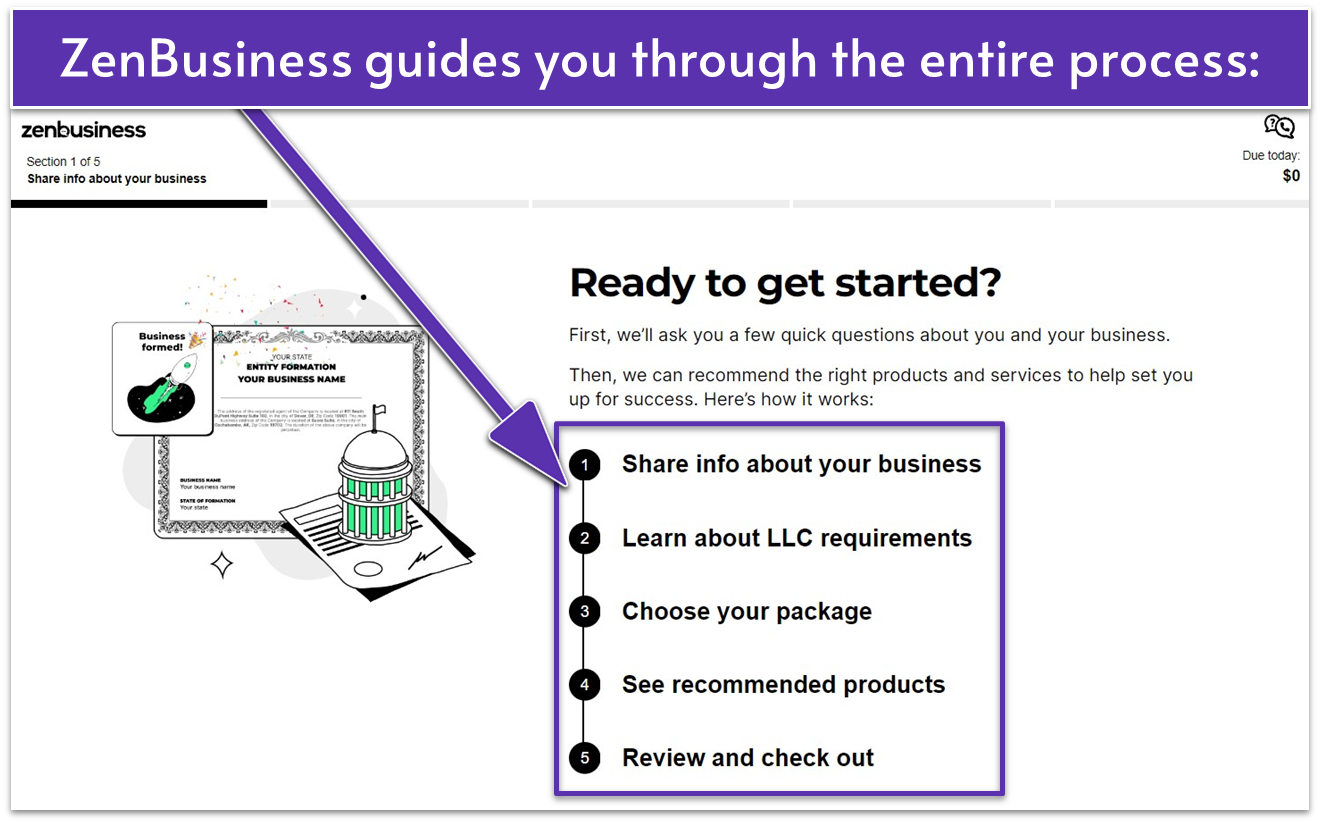
- 30-day Money Pro trial. Money Pro is ZenBusiness’ proprietary accounting software that assists you in tracking expenses and income, as well as taxes. All you have to do is link your business bank account.
- Website builder. ZenBusiness has its own no-code website builder featuring website templates and drag-and-drop elements. Use of it, a domain name, and a business email address are included with ZenBusiness’ Premium LLC formation plan.
- $5,000 Grant Program. ZenBusiness’s Grant Program awards 40 grants to community-oriented small businesses each year. Only ZenBusiness customers are eligible to apply.
Tailor Brands: LLC Formation and Branding In One Package 1
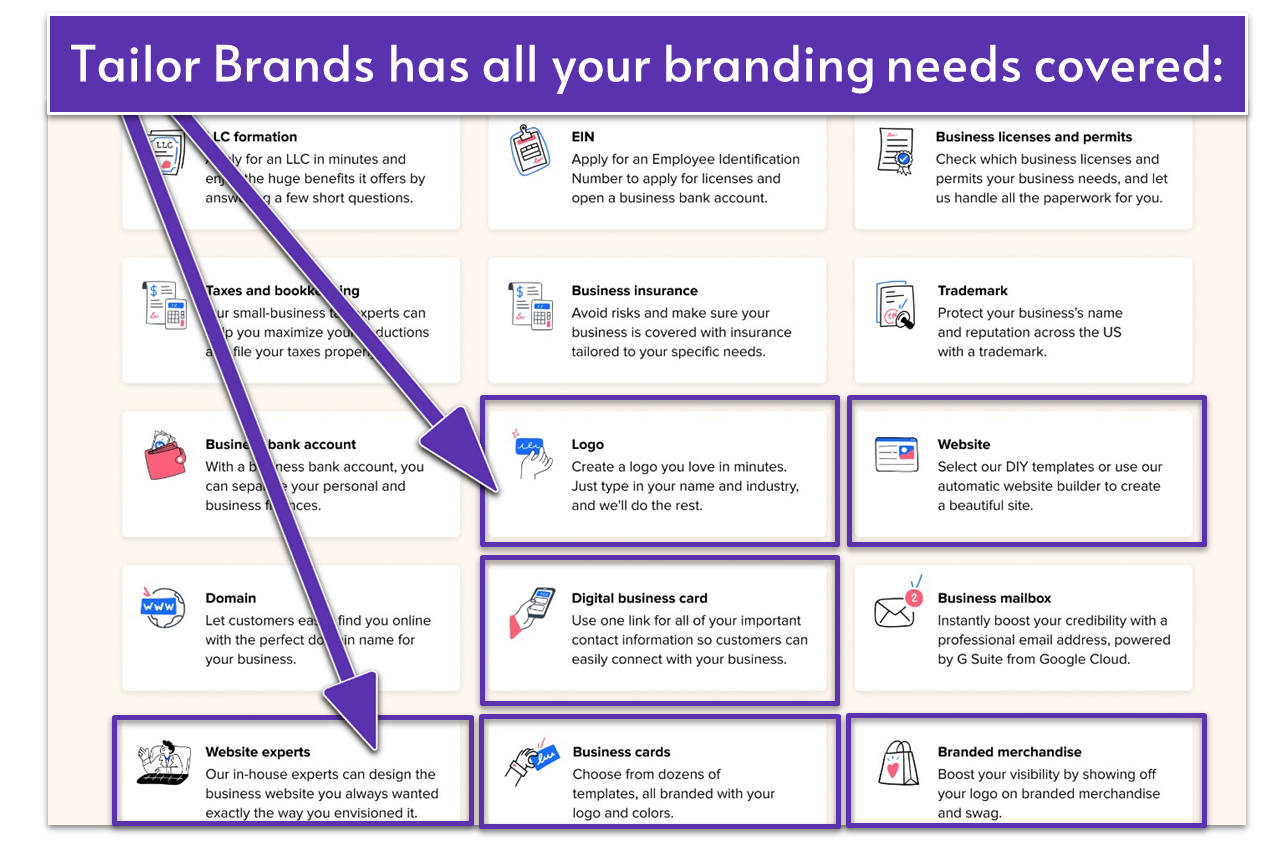
- Business license and permit check and registration. Tailor Brands won’t just research the necessary permits and licenses you need. Its team will also apply for them for you. This service is available as a paid add-on separate from LLC formation.
- Affordable add-ons. Tailor Brands offers a range of add-ons, including an Operating Agreement, EIN registration, and expedited filing, priced lower than many competitors.
LegalZoom: Legal Advisory and LLC Formation at Your Fingertips 1

- Free digital welcome packet. A step-by-step checklist to guide you through the LLC setup process.
- Business Advisory Plan. You can activate or extend your legal support by signing up for a paid LegalZoom Business Advisory plan separately. The option to sign up for and pay yearly or in biannual installments further enhances accessibility to legal services.
- 3. Register for Tax IDs (EIN and/or state), Permits, and Licenses
- 4. Start Tracking Your Accounts and Get Financing
- 5. Network, Hire, and Source Materials and Third-Party Services
Building a Professional Network
Sourcing event supplies, expanding your team.
- 6. Launch and Promote Your Event Planning Company
- Securing a domain name that resonates with your brand,
- Setting up a matching business email address to communicate effectively with clients,
- And launching a well-designed website that showcases your services.
Squarespace: Stunning, Professional Templates + Useful E-Commerce Tools 1

Get an additional 10 % OFF any Squarespace plan!
This exclusive offer is only available for your first purchase.
Shopify: The Go-To for E-Commerce Website Owners 1

Try Shopify for FREE for 3 days!
See if it's right for you - no credit card required.
Wix: An All-In-One Website Builder With a Free Hosting Plan 1
Wix now has a 14 - day money-back guarantee!
Get a discounted annual plan without taking any risks.
Or, Use an LLC Formation Service With a Website Builder Included
Market and promote your event planning company.
- Social Media Advertising: Utilizing platforms like Facebook and Instagram for targeted ads can help reach local clients.
- Local Advertising: Flyers, newspaper ads, and local radio spots can attract attention within the community.
- Networking Events: Attending or sponsoring local trade, industry, or networking events can increase your visibility and build your connections in the industry.
- Online Marketplaces: Platforms like Amazon and Etsy can be effective for selling themed party supplies or unique event decor.
- Get Your Event Planning Company Started Today
| | | | | ||
| 100% Accuracy Guarantee, 1 free year of Worry-Free Compliance services, excellent support | ✔ | ✔ (Premium plan or paid add-on only) | $0 | ||
| Free AI logo maker, branding + design tools (Elite plan only), low-cost add-ons | ✔ | ✔ (Elite plan only) | $0 | ||
| Free and paid tax and legal advisory services, digital welcome packet and guide | ✔ | ✘ (partners with Wix) | $0 |
How to Start an Event Planning Business: The Ultimate Guide

It's no surprise that starting an event planning business involves many moving parts. It can feel overwhelming, from identifying your unique selling proposition and having all the key skills to executing flawless events to getting all the required compliances. But not anymore.
In this guide, we'll discuss everything about event planning and provide a step-by-step guide on how to start your own event-planning business. This post covers everything from determining profitability to understanding the skills you need to run a successful business.
But before you dive headfirst into how to start an event planning business, let's take a step back and understand the basics.

What is Event Planning in Business?
If you plan to start your event planning business, you probably know the answer to this question. Event planning involves managing the details of large or small events, including meetings, conferences, or parties. This business is typically utilized for:
- Large educational meetings, such as graduations or conferences.
- Major promotions, including marketing events, product launches, and fashion shows.
- Corporate events , like after-work cocktail hours, trade shows, galas, and more.
- Celebrations and social events like parades, weddings, birthdays, reunions, and more.
What Do Event Planning Businesses Provide?
As an event planner, you are expected to work with clients to understand their requirements and goals and then provide end-to-end event planning and execution services to ensure the seamless and successful execution of in-person or virtual events .
Some of the services you must include are:
- Event management and coordination
- Theming, décor, and styling
- Conferencing and exhibitions
- Signage and branding
- Entertainment and talent management
- Venue sourcing and management
- Catering and food & beverage management
- Audio-visual production and management
- Logistics and transportation management
- Budgeting and financial management
- Marketing and promotion
- Security and risk management
- Registration and guest management
- Post-event evaluation and reporting
Why Do People Hire Event Planning Businesses?
There are two primary reasons why people hire event planning services:
- To allow event attendees and guests of honor to thoroughly enjoy themselves without worrying about event logistics.
- To ensure that the event runs without any glitches.
Consider a typical corporate conference, for example.
A business may hire your services to create a stellar multi-day conference while their employees and attendees can focus on networking or learning. This way, they don’t have to worry about details like catering, keynote speakers, registration, and managing the event schedule.

Advantages and Disadvantages of Starting an Event Planning Business
As with everything, the event planning business also has advantages and disadvantages. Some of them are:
- Enjoy the freedom to choose who you work with, where you work, and how you manage your schedule.
- Pull off a showstopping event, and chances are your clients will return repeatedly, thus building loyalty.
- Event planning business lets you unleash your creativity as you get to design events that are unique and unforgettable for your clients.
- Establishing relationships with reliable vendors takes time, especially in a crowded market.
- Growing your business needs adding resources or raising prices, which can be tricky.
- Most of the time, although the planning takes place in advance, you must ensure your presence in the field during the event—meaning long working hours, even on evenings and weekends.
How to Start an Event Planning Business
Here are some steps to help you start an event planning business:
Evaluate your event planning skills.
Event planning involves many tasks beyond the glamor of parties and events. To be successful, you must be able to handle various responsibilities. After all, successful event planners are masters of multitasking, with a talent for keeping calm under pressure.
For example, you’ll need to create an event theme or design, find a venue, arrange entertainment, book vendors, send RSVPs and marketing information to attendees, and balance the budget. The list goes on.
If you're unsure whether you possess all the necessary event planning skills , consider gaining some hands-on experience. Perhaps shadow an experienced planner, assist with events at a local organization, or even volunteer for a nonprofit event.
Create your event planning business plan.
A well-structured business plan is the foundation of any successful venture, and event planning is no different. Consider it your roadmap to success. Here are the key sections to include:
- Executive Summary: Summarize your business concept, goals, and what sets you apart.
- Overview : Outline your company background, structure (e.g., sole proprietorship), and essential details.
- Industry Analysis : Demonstrate your understanding of the local event planning market, including potential clients and event trends .
- Competitive Analysis: Examine your competition, identifying their areas of strength and areas you can exploit.
- Marketing : Craft a strategy for attracting clients—how will you make them aware of your exceptional services?
- Management: Detail your unique experience and skills.
- Operations Plan : Describe your day-to-day process for planning and executing events.
- Financials : Project your income, expenses, and profit expectations over your initial years of operation.

Find your event planning niche.
Finding your niche is how you stand out from the rest—it helps you specialize in a specific subset of the broader event planning industry. Also, it becomes easier for your target market to find you. Common niches and event types include:
- Business event planning: Award ceremonies, charity and nonprofit events, corporate bonding retreats, meetings and seminars, conferences, grand openings, fashion shows, experiential events, holiday parties, networking events , trade shows, and VIP events.
- Private/social event planning: Weddings, anniversaries, holiday parties, baby showers, theme parties, wedding/bridal showers, bachelor/bachelorette parties, milestone birthday parties, and murder-mystery parties.
Identify your unique selling proposition.
Identify your event planning business’ unique selling proposition (USP) to set yourself apart from your competitors. It is the reason why clients should choose your company over others.
Here’s how you can define your USP:
- Identify your target market: The first step in uncovering your event planning USP is to identify your target market. Who are your ideal clients? What type of events do they typically host? What are their pain points and needs? Understanding your target market lets you tailor your services to your client's needs and preferences.
- Analyze your competition: The next step is to analyze your competition. Who are your competitors? What services do they offer? What is their pricing strategy? What are their strengths and weaknesses? Understand your competition to identify gaps in the market and ways to differentiate your business.
- Determine your unique strengths: What sets your business apart from your competitors? What unique strengths do you bring to the table? It could be your expertise in a particular type of event, your creative approach to event design, your extensive network of vendors, or your exceptional customer service. Identify your unique strengths and use them to craft a compelling USP.
Consider funding and costs.
The events business can be lucrative, but getting started requires smart financial planning. Calculate your initial startup costs carefully. Price your services strategically so you cover expenses while remaining competitive. If number crunching isn't your strong suit, invest in a bookkeeper or accountant early on.
While exact costs vary by location and services offered, here's a ballpark range to get you thinking:
- Rent: $0 to $2,300
- Equipment: $5,000 to $17,000
- Inventory: $0 to $500
- Licenses and Taxes: $250 to $350
- Communications: $100 to $250
- Payroll: $0 to $4,000
- Advertising/Promotion: $500 to $2,000
- Legal Fees & Accounting: $650 to $1,500
- Insurance (1st Quarter): $800 to $1,700
- Miscellaneous: $750 to $1,500
- Total: $8,050 to $31,100
Remember, startup expenses don't have to be astronomical. Begin with the essentials, and scale up as your business grows.
Structure your pricing strategy.
Pricing your services is an art and a science. Factor in your location (cost of living varies), your experience level, and what your competitors charge. Most importantly, ensure your pricing allows you to cover costs and earn a worthwhile profit while remaining attractive to clients.
Remember, transparency is key—explain your fee structure clearly so there are no surprises later on.
Here are some common pricing models for your consideration:
- Hourly rate: Ideal for projects where the scope is difficult to predict upfront. Rates typically range from $25 - $100+ per hour, depending on your skills and the complexity of the event.
- Flat fee: A single charge covers your planning services. This works well for events with well-defined parameters. Sometimes, planners add a percentage of vendor fees to ensure sufficient compensation.
- Percentage of the event: Typically, this will be 15-20% of the total event cost. Such pricing structure is common for complex events, as your fee scales alongside the project.
- Day-of coordination: A specialized service, handling the on-site logistics on the day of the event itself.
- Vendor commission: In this model, your income comes from commissions from selected vendors, rather than directly from the client. This requires careful negotiation and transparency with all parties involved.
Obtain necessary legal documents and permits.
Don't neglect the legal side of your business. Taking these steps protects both you and your clients from potential issues:
Register Your Business : Choose a legal structure (LLC, Sole Proprietorship, etc.) that's right for you, and register officially with your state. Obtain a tax ID—essential for everything from opening a bank account to filing taxes.
Obtain Necessary Permits : The red tape of event planning might not be glamorous, but it's crucial. Permits vary by location, so contact local authorities to learn exactly what you need. Common examples include:
- Building permits (tents) for outdoor events that require tents.
- Business license to operate legally.
- Event permits vary by city, so contact the local government for relevant ordinances.
- Noise permit if your event is outside.
- Fire/fireworks permit, which you must check with your county.
- You can get a health permit from your county’s health department.
- You need a liquor license if you plan to serve alcoholic beverages.
- Seller’s permit, which you may need as an event planner.
- Temporary use/structure permit for vacant land or temporary space for loading areas, vendors, and parking.
Get your event planning business insured.
Obtain insurance coverage for your event planning business to protect yourself and your clients from unexpected incidents. Here are some important coverages to consider:
- Workers' compensation: This is mandatory in all states. It protects your employees (and yourself, if you count as an employee) in case of work-related illness or injury.
- General liability insurance: A must-have for any event planning business. This protects you from claims of property damage or bodily injury at an event you organized.
- Property insurance: Safeguard your equipment (tables, chairs, laptops, etc.) from theft, fire, and other unexpected events.
- Business interruption: If unforeseen circumstances force you to temporarily shut down, this can provide financial support. Think of it as backup income if things go awry.
- Business Owner's Policy: This bundles several important coverages into one convenient package, often at a good value.
Market your event planning business.
Once your business is set up, it's time to attract those exciting new clients. Here are some strategies to get you started:
- Build a Website: Your website is your online storefront. Services like Weebly and Squarespace make it easy, even if you're not tech-savvy. Invest time in making it visually appealing and easy to navigate.
- Boost Your Online Presence: List your business on directories like Yelp, Eventective, and Google My Business. This helps potential clients discover you when they're searching for event planners in your area.
- Get Social: Create engaging profiles on relevant platforms (Instagram, Pinterest, Facebook, etc.). Share social media-worthy photos, behind-the-scenes glimpses, and client testimonials.
- Traditional Marketing Still Works: Don't underestimate the power of beautifully designed brochures, flyers, and business cards. Distribute them strategically at local businesses or events.
- Get Referrals: Happy clients are your best advertisement. Encourage them to leave glowing reviews, and feature video testimonials on your website and social media.
- Strategic Partnerships: Caterers, photographers, venue owners—these businesses have the same clientele as you. Build relationships and create a referral network to mutually benefit.
Related: Read some practical event planning tips for before, during, and after the event.

What skills do you need to run an event planning business?
The basic skills needed to run an event planning business effectively are primarily soft skills, such as organizational skills, business management skills, and presentation skills. Here are some necessary skills to run an event planning business successfully:
- Attention to detail
- Customer service
- Education (staying updated on event trends) or experience
- Interpersonal relationship skills
- Negotiation
- Organization
- Under-pressure performance
Is an event planning business profitable?
Event planning has the potential to be a very profitable business venture. The fact that 89% of event and meeting leaders consider in-person events crucial for revenue growth demonstrates the ongoing demand for well-planned events.
However, the profitability of your event planning business will depend on several factors. The key to success lies in your ability to command premium rates for your services while keeping your expenses in check.
What does an event planning business do?
An event planning business organizes and coordinates various aspects of events for individuals or organizations. This includes selecting venues, arranging catering and other vendors, creating event schedules and itineraries , managing budgets, and ensuring all necessary equipment and supplies are available.
Do event planners travel a lot?
Event planners may travel depending on the nature of the events they plan. Some events may occur locally, while others may require travel to different cities or countries. Ultimately, the amount of travel required will depend on each event's specific needs and requirements.
The Future of Event Planning is Yours to Create
The event planning industry offers vast opportunities for those with an eye for detail, a flair for organization, and a knack for staying on budget. Whether your heart lies in orchestrating sleek corporate events or bringing dream weddings to life, the skills you hone as an event planner are valuable in countless contexts.
A carefully crafted business plan, paired with smart marketing and a dedication to providing exceptional experiences, can turn your passion into a truly successful venture. Find your niche, or cast a wide net—the choice is yours.
If you're ready to take the leap into the world of event planning, don't hesitate. Use this guide as your springboard. With hard work, a little business savvy, and a genuine love for creating memorable moments, there's no limit to what you can achieve.
Up next, learn some best practices in event management to create scalable and successful event strategies for your business.

John Hunter
John is the Senior Manager of Event Cloud Content Marketing at Cvent. He has 11 years of experience writing about the meetings and events industry. John also has extensive copywriting experience across diverse industries, including broadcast television, retail advertising, associations, higher education, and corporate PR.
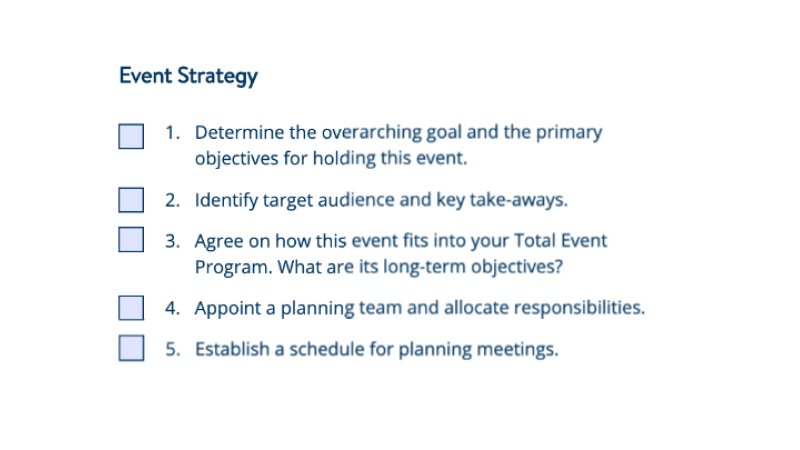
More Reading
Elevate your events with the westin tokyo, unveiling the future: a sneak peek into sonesta miami airport’s renovation, wynn is unlike anything else in las vegas.
Subscribe to our newsletter

How to start an event planning business in 8 steps
In 2020, the COVID-19 crisis changed everything for event planners. Whether the industry thinks of 2020 as a deviation or devastation strongly depends on how planning professionals adapt to uncertainty. One thing's for sure, virtual and hybrid meetings are here to stay, with the virtual market at $94 billion in 2020 and an expected compound annual growth rate of 23.7% between now and 2028 .
With all the change in the air, enterprising event entrepreneurs build social connections no matter the distance. So read on to avoid being amongst the 50% of all small businesses that fail in the first 5 years—and, more importantly, to give your new event planning venture the right start.
1) Evaluate your event planning skillset
It's common for event planning newbies to believe the business is all about showmanship, champagne, and shindigs. While that's the final product of your meticulous preparation, things behind the scenes are much less spectacular. There are a hundred to-dos that the planning professional must check off for every event to guarantee an enjoyable time for the client and guests.
Amongst other tasks, you may have to:
- Create an event theme or design.
- Find a venue.
- Arrange entertainment.
- Book vendors.
- Send RSVPs and marketing info to attendees.
- Balance the budget.
- Coordinate with staff and subcontractors.
- Decorate the space.
- Oversee the caterers and bar staff.
- Supervise the event.
If you want to start an event planning company, it might be smart to test out a job or three before making the dive. To begin, think about signing up as a personal assistant or apprentice for an experienced party planner. That way, you can evaluate whether the work is a suitable match before venturing out on your own.
Or you can look below for traits you already possess or ones you're willing to pick up as you go.
- Attention to detail. Planning events requires diligence with finances, logistics, and time management.
- Customer service. Event planners must contact their clients often. Thus, excellent customer service may help build the planner's reputation and improve client satisfaction.
- Education or experience. Knowledge of best practices and prior event planning experience help. A party planner may have also attended college or earned a certification.
- Interpersonal relationship skills. During a single event, an event planner will need to engage various people, many of whom will not be the planner's staff. Therefore, it's critical to form solid interpersonal connections and work effectively with a wide range of personalities. An event planner is the ultimate "people person."
- Negotiation. Event planners negotiate with suppliers, entertainers, and contractors to reduce expenses while ensuring the client receives what they want.
- Organization. Every event has many moving components that planning professionals must manage, and good organization is essential throughout the process to guarantee that nothing is missed or neglected.
- Under-pressure performance. Even with the finest preparation, unforeseen problems will arise during an event. Event planners must create solutions to issues fast and always think on their festive feet.
Create your event planning business plan
"Whatever you do, do it well. Do it so well that when people see you do it, they will want to come back and see you do it again, and they will want to bring others and show them how well you do what you do."
Those words are from the man who has created more magical experiences than anyone else. Walt Disney's quote sounds like inviting people to your party, and his wisdom is perfect for those who make a living by bringing folks together. But before you can show the world how well you do what you do, consider the following questions when starting your business :
- Executive Summary: How would you describe the business and your potential success?
- Overview: What's the business's background, legal structure, and other key attributes?
- Industry Analysis: What does market research reveal about the event planning industry in your area, including size, opportunity, and current trends?
- Competitive Analysis: Who are your competitors, and what are their strengths and weaknesses?
- Marketing: What is your marketing strategy to reach potential customers?
- Management: What unique skills do you bring to the business?
- Operations Plan: How will you manage the day-to-day tasks of the business?
- Financials: What are your estimated revenues, expenses, and profits for each of your first 5 years?
2) Find your event planning niche
Finding a niche is as simple as picking a subset of the broader event planning industry to concentrate on or specialize in. A niche allows you to shine in an overcrowded marketplace and helps your target market track you down. Saying yes to the wrong client is saying no to Mr. or Mrs. Right. So, find the niche that matches your expertise and focus.
Take a look below for common niches and types of events.
Corporate Events
- Award ceremonies
- Charity and non-profit events (such as fundraising events)
- Conferences
- Corporate bonding retreats
- Corporate meetings and seminars
- Fashion shows
- Golf events
- Grand Openings
- Experiential events (such as pop-ups and product or service launches)
- Holiday parties
- Networking events
- Trade shows
Private/Social Events
- Anniversaries
- Baby showers
- Bachelor/bachelorette parties
- Bridal/wedding showers
- Milestone birthday parties
- Murder-mystery parties
- Theme parties
- Surprise parties
- Wedding planning
3) Uncover your event planning unique selling proposition (USP)
Your unique selling proposition expresses what distinguishes you from every other event planner. According to top business thought leaders, in a world where clients are drowning in options and competition is fierce, 90% of a small pie is preferable to 10% of a large pie. So, for example, an enterprising event planner might create the USP, "Grand Opening Specialist for Luxury Retailers."
4) Pick your event planning business name
Are you ready for some fun? Business ideas move to the realm of reality as soon as a company has a name. Pick a name that blends your niche, USP, and expertise as an event planner. Perhaps it's as simple as Grand Openings Event Planning Company or as whimsical as Lux Influx Events. Try a business name generator , research competitors, or brainstorm with friends and family.
5) Figure out your financial plan
According to event planning tech company EventForte, profit margins in the industry can go as high as a healthy 40% . But don't rush off to the bank quite yet. To earn top dollar, you have to get those financial duckies in a row. So, if numbers are not your cup of event planning tea, you can always rely on a bookkeeper, software, or your favorite accountant. Then, when you're ready, you need to crunch your upfront costs and set up your pricing.
Calculate your startup costs
If you're starting as a side hustle, you'll need little more than a home office, computer, phone, website, some marketing materials, and event management software. It's common for people to get started for less than four or five thousand bucks. Furthermore, Entrepreneur.com estimates between $8,000 and $31,000, with the lower end for home-based business and the more expensive side for the type of business that launches with an office space and a few employees.
Structure your pricing strategy
How should you charge for your planning services? Your location, expertise, niche, and competition will help you set your fees. Below you'll find the five most prevalent ways of pricing event planning.
- Hourly rate. A typical hourly fee for a novice event planner may be as low as $25 per hour and over $100 per hour for top event planners. Usually, a corporate event generates approximately 30% higher rates than social events.
- Flat fee. A flat fee makes it straightforward for you and the client and is probably the most common arrangement. It is customary to charge a price for your services and a percentage of total vendor fees. A typical vendor commission runs from 10 to 15%. For instance, if a caterer's fee is $4,000 for an event, your cut for finding and arranging that specific vendor would be $400-$600.
- Percentage of the event. Some event planners choose to charge a portion of the entire event budget, such as 15 to 20%.
- Day-of coordination. At some point, a client will ask you for day-of coordination. This fee structure is most common for wedding planners, but it may also occur at other types of events.
- Vendor commission. A small percentage of planners opt to either drastically reduce their fees or charge nothing for their services, earning all their money via commissions from the vendors they choose.
6) Get your paperwork in order
It's just a few hurdles to jump, and you're racing toward the finish line.
a) Register your business name with the state
Before you find your first clients, you need to register your business entity with state and local authorities. Also, you'll need to pick a type of business structure such as sole proprietorship, limited liability company (LLC), or corporation.
b) Apply for your EIN
Your employer identification number (EIN) identifies your business for taxes. Surprisingly, getting one is both free and easy. Get your EIN here .
c) Open a business bank account
Once you have your EIN, you can open a business checking account, apply for a loan, and separate your personal and business finances.
d) Obtain permits and licenses
This step separates the planners from the pretenders, but it's well worth the hustle to protect your reputation and potential clients. Your state will likely require several permits and licenses for your business and events. Standard ones include:
- Building permit (tents). You need one for carnivals, political demonstrations, pop-up performing arts, races, and many other outdoor events that require tents.
- Business license. Almost all businesses require licensing with the state to operate.
- Event permit. The requirements vary by city, so contact the local government for relevant ordinances.
- Fire/fireworks permit. You must check with your county if it's legal to display fireworks for your event.
- Health permit. You can get this from your county's health department.
- Liquor license , if applicable. You'll have to get this if you're planning to serve alcoholic beverages, and you can check the Alcoholic Beverage Control board for your state's specifics.
- Noise permit. If your event's outside, you'll likely need one.
- Seller's permit. You may need this as an event planner.
- Temporary use/structure permit. There are two kinds of temporary use permits. One is for vacant land, and the other is for temporary space for parking, vendors, and loading areas.
e) Insure your event planning business
Some first-time event planners forget about insurance until it's too late. When you're dealing with the public, there's always the potential for the unexpected. Every event planner needs solid small business insurance —that's why it's essential to shop around to lock in the best deal. Check out this overview of important coverages you may need to insure your event planning business :
- Workers' compensation : This coverage protects your employees if they get sick or injured while working in your event planning business. Every state requires workers' comp, and the consequences of skipping this coverage could cause the state to close your business. (You can get a quick estimate on what you'd pay for workers' comp with our 60-second workers' compensation calculator. )
- General liability insurance : This policy protects your event planning business if you're sued for a property damage or injury claim. (Expensive lawsuits can quickly put an event planning service out of business.)
- Property insurance : This policy protects your event planning equipment, such as your laptop or other devices you use in your business or home office from perils like fire or theft.
- Business interruption : This coverage, also called business income insurance, provides financial support to your event planning business if you must close because of a covered reason.
- Business Owner's Policy: This policy bundles general liability, business property, and business interruption insurance for your event planning business in one convenient package.
7) Hire your first employees
Many event planners launch as solopreneurs, but they soon look for a personal assistant. Or perhaps you want to hire a junior planner, salesperson, or office manager. Of course, you'll need workers' compensation insurance to operate legally whenever you add that first team member. After finishing your paperwork and legal requirements, head over to the Small Business Administration for a helpful checklist.
8) Spread the word about your new event planning business
Event planners are marketers at heart. After all, who's better at promotion than party planners? Now, you can parlay some of that creativity to advertise your new business. When building your marketing strategy to attract new clients, you could:
- Build a website . Get the domain name for your business. A service with templates like Weebly or Squarespace can make this easy.
- List your local business on Google and Yelp. Sign up for your Google My Business and Yelp profile.
- Launch your social media profiles. Get your unique Facebook, Twitter, LinkedIn, Instagram, Pinterest, and other handles relevant to your niche.
- Distribute brochures, flyers, and business cards. Call it old-fashioned, but it still works, and you might get your foot in the door with new clients.
- Create word-of-mouth. Small Business owners know there's nothing better than word-of-mouth advertising, and the best way to get it is to please clients with a service they can rave about. Ask happy clients and customers for video testimonials that you can post on your website and social media accounts.
- Partner with related businesses. Businesses such as caterers, florists, and photographers can be excellent referral sources.
Bonus: Check out these tips for running a successful event planning business
You're just about ready to start your own event planning business, so it's time to break out the bubbly. But before you pop the top, perhaps you're still thirsty for more best practices. Here are a few places with knowledge you can sip on:
- Event Manager Blog : A great online library of articles, webinars, and videos covering every facet of the event planning industry.
- Meeting Professional International (MPI): "Meeting Professionals International is the largest meeting and event industry association worldwide. The organization provides innovative and relevant education, networking opportunities, and business exchanges, and acts as a prominent voice for the promotion and growth of the industry."
- #EventIcons Podcast : The hosts interview event-industry luminaries and up-and-comers, and the topics span from the everyday to the unexpected. The show has a friendly atmosphere and is a wealth of information for both beginners and seasoned experts. If you want to watch, #EventIcons is also accessible in recorded video format.
This article's been a lot to absorb. Maybe you're pondering just how to stay sane as an event planning entrepreneur .
If you're still crazy enough to start a party planning business, you can get insurance with Huckleberry in about the same time it takes to make your favorite caterer's samples disappear. (Getting a quote is free, easy, and 100% online.)
Buy business insurance online in less than 5 minutes.
No paperwork. Instant coverage. No-commitment quote.
Related Blog Posts

The content of this page is for general informational purposes only. It should not be relied on as legal, tax, insurance, financial, or other professional advice and is not guaranteed to be accurate, complete, current, reliable, or error-free. See the Terms of Service for further information about this website.
Share this post...
- Website Examples
- Website Builder Comparisons
- Hosting Comparisons
- WooCommerce
- HTTP Errors
- WordPress Errors
A Guide on How to Start an Event Planning Business

Step 1: Understanding the basics of event planning
Step 2: conducting thorough market research, step 1: defining your business objectives, step 1: choosing the appropriate legal entity, step 2: understanding taxes and finances, step 3: dealing with legalities, step 4: calculating your budget, stage 4: creating an online website using 10web, step 1: designing your brand identity, step 2: setting up an online presence, step 1: developing a marketing strategy, step 2: leveraging online advertising, step 1: investing in essential equipment, step 2: hiring and training your team, step 1: pursuing relevant certifications, step 2: continuing professional development, step 1: connecting with industry professionals, step 2: attending trade shows and conferences, corporate events, social events, music festivals and fundraisers.
Starting an event planning business can be an exciting and rewarding venture. This complete guide on how to start an event planning business will walk you through every step, from initial planning and market research to marketing strategies and client management. Learn the essential skills, tools, and insights needed to build a successful event planning business.
Is an event planning business profitable?
How do I start my own event planning business
How do I succeed in the event planning business?
Stage 1: Laying the groundwork
Starting an event planning business involves understanding the key fundamentals and conducting detailed research to understand your market. This preparation sets a solid foundation for your business.
Event planning includes organizing various types of events, such as weddings, corporate gatherings, and parties. You need strong organizational skills, attention to detail, and the ability to multitask. Basic tasks involve:
- Client meetings – discussing event details and expectations.
- Budgeting – managing client budgets while ensuring quality.
- Vendor coordination – working with caterers, decorators, and more.
- Event execution – ensuring smooth operations during the event.
Start by learning the industry norms and common practices. Consider taking courses or obtaining certifications in event planning to boost your credibility. Always stay updated with the latest trends and technologies in the event industry.
Market research is crucial for understanding your target market and competitors. Here’s how to conduct effective research:
- Determine who your potential clients are. This could include corporations, couples planning weddings, or individuals hosting parties.
- Understand their needs, preferences, and budget limits.
- Identify other event planning businesses in your area.
- Study their services, pricing, marketing strategies, and client reviews.
- Decide which type of events you want to specialize in. This could be corporate events, weddings, or large public gatherings.
- Tailor your services to meet the unique demands of your chosen niche.
Use online tools, surveys, and industry reports to gather data. This information will help you create effective marketing strategies and offer competitive pricing. Proper market research helps in crafting a business plan aligned with real-world demands and opportunities in the event planning industry.
Stage 2: Crafting your business plan
Creating a solid event planning business plan is essential. It helps you define your goals and provides a roadmap for how your business will operate.
First, you want to outline your main goals. Think about why you’re starting this business and what you hope to achieve. Whether you aim to specialize in weddings, corporate events, or large parties, establish clear, specific objectives.
Next, consider your target market. Identify who you will serve and what their needs are. Knowing your audience helps shape your services.
Finally, include an executive summary. This brief overview should highlight your business’s vision, mission, and key strengths. It provides a quick snapshot for potential investors or partners.
By setting clear objectives, you can guide your business toward success.
Stage 3: Structuring your business
When starting your event planning business, choosing the right legal structure and understanding taxes and finances is crucial. These steps will protect you and ensure your business runs smoothly.
Choosing the right legal entity is a big decision. It affects your taxes, personal liability, and ability to raise capital. Here are common business structures:
- Sole Proprietorship : Simple and low-cost. You have complete control, but also personal liability for debts.
- Partnership : Involves two or more people. Shared control and profits, but each partner is personally liable.
- Limited Liability Company (LLC) : Blends elements of partnerships and corporations. Provides personal liability protection but allows profit sharing.
- Corporation : More complex and expensive. Offers significant liability protection and is ideal for larger businesses with shareholders.
Consult with a business attorney or accountant to ensure you choose the entity that best fits your needs.
Understanding how taxes and finances work for your business is essential. Here’s what you need to consider:
- Tax Identification Number (TIN) : You’ll need a TIN from the IRS. An Employer Identification Number (EIN) is necessary if you hire employees.
- Business bank accounts : Open separate accounts to keep personal and business finances distinct. This simplifies bookkeeping and tax preparation.
- Accounting system : Use reliable software like QuickBooks or FreshBooks to track income and expenses.
- Sales tax : Determine if you need to collect sales tax. Event planners often charge for services and might need to collect this tax in some states.
- Budgeting and forecasting : Plan your budget carefully. Include costs like supplies, marketing, and employee wages. Forecasting helps manage cash flow and ensures you stay profitable.
Seek professional advice to navigate financial decisions and maintain compliance with tax laws.
When starting an event planning business, it’s important to handle legal matters. You should focus on obtaining the necessary licenses and managing insurance to minimize potential risks.
Obtaining licenses and permits
To start your event planning business, you need to obtain several legal documents.
First, get an Employee Identification Number (EIN) from the IRS. This number is used for tax purposes and is required if you plan to hire employees.
Next, apply for a business license from your local government. This license permits you to operate within a specific location legally.
Some events may also require special permits . For example, if you’re organizing a public event, check with your municipality to see if you need a permit.
Ensure to research local regulations thoroughly since requirements can vary by location.
Managing insurance and risk
Insurance is important for protecting your event planning business from unexpected issues.
Start by purchasing liability insurance . This will cover any damages or injuries that occur during your events.
Consider getting a surety bond . Some clients may require this before signing a contract. A surety bond assures them that you will fulfill your obligations.
Property insurance is also advisable if you own or lease office space or equipment.
Seek guidance from an insurance agent who can help you choose the right coverage.
Review your insurance policies regularly to ensure they meet your business’s needs. This will help you manage risks effectively and keep your business secure.
Knowing how to calculate your budget is key to starting a successful event planning business. This includes estimating your startup costs and allocating funds for daily operations efficiently.
Estimating startup costs
Starting an event planning business requires thinking ahead about all the potential initial expenses. Begin with market research to understand what you’ll need.
Here’s a list to help you:
- Office space : Rental cost or home office setup
- Licenses and permits : Business registration fees
- Equipment : Computers, phones, and other office supplies
- Marketing expenses : Website creation, business cards, and advertising
- Insurance : Public liability, professional indemnity
Create a table to organize these costs, here is an example you can follow:
| Office Space | 500 |
| Licenses & Permits | 300 |
| Equipment | 1000 |
| Marketing | 700 |
| Insurance | 600 |
Make sure to include a cushion for unexpected expenses.
Allocating funds for operation
Once your business is set up, you need to plan for operational expenses. Keep track of every expense to manage your budget effectively.
Some key areas to think about:
- Staff wages : Actual salaries if you have employees or your own earning if you work solo
- Utilities : Internet, phone bills, and office supplies
- Marketing : Continual advertising and client-engagement efforts
- Event materials : Decorations, catering, and rentals
Again, using a table helps:
| Staff Wages | 2000 |
| Utilities | 300 |
| Marketing | 400 |
| Event Materials | 800 |
Keep detailed records and regularly review your budget to ensure profitability. Allocation and adjustment of funds as needed help you stay on top of your business operations.
Starting an event planning business online is a great way to reach more clients. Follow these easy steps to build your website using the 10Web AI Website Builder .
- Sign up for a 10Web account and enter your details to create an account .

- Enter your company name.
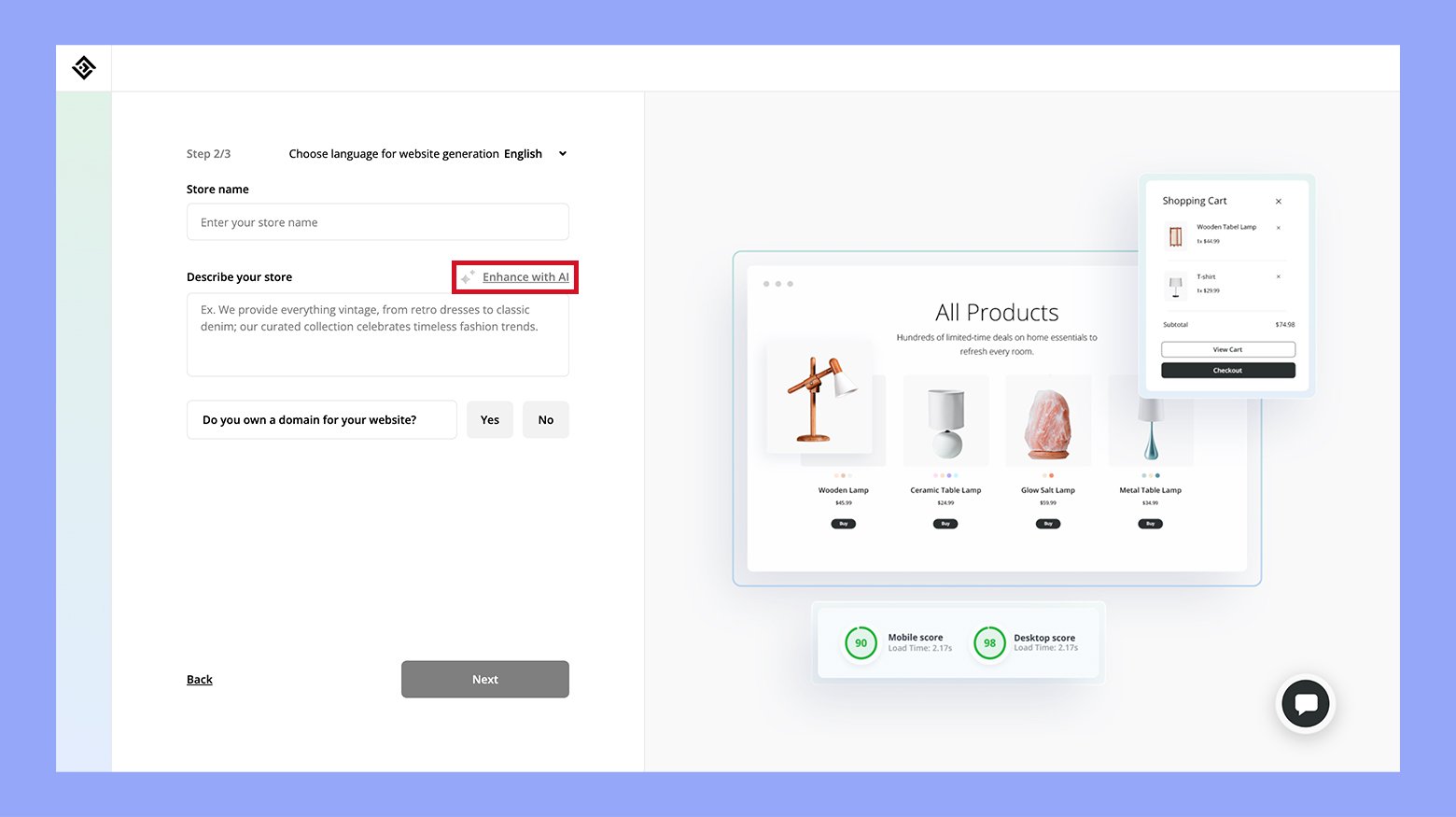
- Wait for the AI to generate your website.
After the website is generated, do the following to enhance your website:
- Choose website features
- The AI will generate features tailored to your business.
- Include items like event calendars, registration forms, and virtual event platform integrations.
- Customize your website
- Use the drag-and-drop builder to customize the layout.
- Add images, text, and other elements to match your brand.
- Preview and publish
- Preview your website to ensure it looks good.
- Click Publish to make your website live.
With these steps, you’ll have a professional website ready to attract clients.
Stage 5: Creating a strong brand
Building a strong brand involves designing a memorable brand identity and establishing a robust online presence. You need to define your mission and unique selling propositions (USPs) to differentiate your business from competitors.
Start by defining the key elements of your brand. This includes creating a name , logo , and slogan that represent your business’s mission and values.
- Name : Choose a name that is easy to remember and reflects the essence of what you do. Make sure the name is unique and checks for domain availability .
- Logo : Design a simple yet recognizable logo. Use a consistent color scheme that aligns with your brand message.
- Slogan : Develop a catchy slogan that highlights your unique selling point.
Be consistent with your brand voice and tone across all platforms to create a cohesive image. This includes your website, social media, and marketing materials.
An online presence is crucial. Secure your domain name that matches or closely aligns with your business name.
- Social Media : Set up profiles on platforms like Instagram, Facebook, and LinkedIn. Share engaging content regularly.
- SEO : Optimize your website for search engines to increase visibility. Use keywords relevant to event planning in your content.
By focusing on these elements, you’ll establish a strong and recognizable brand that attracts clients and builds trust.
Stage 6: Marketing your services
To successfully market your event planning services, it’s key to develop a solid marketing strategy and leverage online advertising to reach potential clients.
Start by identifying your target audience. Think about who would benefit most from your services, such as businesses hosting corporate events or individuals planning weddings. Knowing your audience will help you tailor your marketing efforts.
Next, create a strong brand. This includes designing a memorable logo, choosing a color palette, and crafting a unique voice for your communications. Consistency in branding builds trust and recognition.
Utilize social media to promote your services. Platforms like Instagram and Facebook are great for showcasing your work. Post photos of past events, client testimonials, and behind-the-scenes glimpses to engage potential customers.
Networking is also crucial. Attend industry events and local business mixers. Hand out business cards and talk about your services. Building relationships with other professionals can lead to referrals and collaborations.
Online advertising can be very effective for reaching a larger audience. Start with Google Ads to target people searching for event planning services. Use keywords relevant to your business to ensure your ads reach the right people.
Social media ads are another powerful tool. Platforms like Facebook and Instagram offer targeted advertising options. You can create ads that appear in the feeds of users who match your target demographic.
Content marketing can drive traffic to your website. Writing blog posts about event planning tips or case studies of past events can position you as an expert in the field. Share this content on social media and other platforms to attract potential clients.
Finally, consider email marketing. Build a mailing list of past clients and potential leads. Send regular newsletters with updates about your services, upcoming events, and special offers. This keeps your business top of mind for anyone in need of an event planner.
Stage 7: Plan for equipment and staff
To start an event planning business, it’s crucial to invest in the right equipment and hire and train a capable team that will help you execute successful events.
You will need a variety of tools and equipment to manage and decorate events. Basic items include tables , chairs , and linens . An excellent sound system and lighting equipment are also vital.
If you plan on hosting outdoor events, invest in tents and heaters . Consider equipment for food service like chafing dishes, serving utensils, and bar supplies . Save costs by renting large items initially, then buying your own later.
You’ll also need an event planning software or project management tools to keep track of bookings, schedules, and client needs. These tools help keep your organization and efficiency top-notch.
Your staff is the backbone of your event planning business. Start by hiring a mix of full-time employees and part-time staff. Key roles include an event coordinator , who manages overall logistics, and an assistant coordinator , who supports various tasks.
Hire reliable caterers , bartenders , and decorators . Make sure they have experience and can work under pressure. Look for good communication skills and a pleasant demeanor.
Training is essential. Develop a training manual and conduct workshops on customer service, event setup, and emergency protocols. Ensure everyone understands their roles and responsibilities to work seamlessly as a team.
A well-trained, cohesive team will ensure your events run smoothly and leave a lasting positive impression on clients.
Stage 8: Understanding certification and training
Certification and training are crucial for anyone looking to start an event planning business. By getting the right certifications and continuing your professional development, you can stand out and ensure long-term success.
Gaining certifications like the Certified Special Events Professional (CSEP) or Certified Meeting Professional (CMP) can enhance your skills and credibility in the events industry.
- Certified Special Events Professional (CSEP) : The CSEP certification is awarded to professionals who have shown high skill level and knowledge in special events. It involves a rigorous exam and requires several years of experience.
- Certified Meeting Professional (CMP) : The CMP certification focuses on meetings and events planning. It requires professional experience and passing an exam. It’s well-respected and recognized worldwide.
Having these certifications shows clients and employers that you are committed to your career and have the expertise needed to plan successful events.
Staying updated with the latest trends and practices through workshops, webinars, and courses is important.
- Workshops and seminars : These are great for hands-on learning and networking. Look for industry-related workshops that cover new technologies, trends, and best practices.
- Online courses : Websites like Coursera and Udemy offer courses in event planning, marketing, and business management. Take advantage of these resources to expand your knowledge and skills.
- Industry conferences : Attending events like the Special Event Conference & Trade Show can keep you informed about the newest ideas and connect you with other professionals.
By continually learning and improving your skills, you ensure that your business remains competitive and innovative.
Stage 9: Networking and building relationships
Building a successful event planning business requires strong networking skills and forming solid relationships. Connecting with industry professionals and attending key trade shows and conferences can help expand your reach and gain new clients.
Forming connections with professionals in the event planning industry is crucial. Start by joining local and national associations, such as the Meeting Professionals International (MPI) or the International Live Events Association (ILEA). Networking within these groups can lead to valuable contacts and opportunities.
Engage with others by attending industry meetups and social events. Introduce yourself and share your business cards. Building relationships can often lead to referrals and collaborations.
Utilize social media platforms like LinkedIn to connect with industry leaders and peers. Participate in relevant online forums and discussions.
Trade shows and conferences provide excellent opportunities to network. These events gather a large number of professionals and potential clients in one place. Attend sessions, workshops, and panels to gain insights and meet new contacts.
Create a plan before attending. List specific booths or sessions you want to visit. Be proactive in approaching people and starting conversations. Bring plenty of business cards and promotional materials.
Take advantage of networking events and mixers often held at these conferences. These informal settings can be great for meeting others in the industry and discussing potential partnerships.
By focusing on networking and building relationships, you’ll expand your reach and increase your chances of success in the event planning business.
Stage 10: Diversifying event offerings
To succeed in the event planning business, you must offer a variety of events. From large corporate meetings to intimate social gatherings, versatility attracts different clients and boosts your reputation.
Managing corporate events such as conferences and product launches requires attention to detail and understanding client needs. Create structured agendas and ensure smooth logistics. Offer packages for different corporate needs, like team-building exercises or gala dinners, to appeal to various business clients.
Social events include birthdays, weddings, and anniversaries. Tailor your services to meet personal preferences, focusing on themes, decorations, and personalized touches. Flexibility and creativity in planning these events can make them memorable and unique for your clients.
Organizing music festivals and fundraisers involves coordinating with multiple vendors and managing large crowds. Focus on securing appropriate permits, setting up stages, and arranging for security. Promoting these events effectively is crucial for attracting attendees and meeting your clients’ goals.
Starting an event planning business is a journey filled with creativity and opportunity. By following this comprehensive guide, you now have the knowledge and tools to successfully launch and grow your venture. Remember, dedication, continuous learning, and excellent client service are key to thriving in this dynamic industry. Embrace the challenges and enjoy the rewards of creating memorable events for your clients.

How to Start Photography Business: Tips for Success
Starting a photography business is an exciting way to turn your passion for capturing moments into a profitable venture. If you’re wondering how to start photography business, this guide will provide you with essential steps, from building a portfolio to marketing your services effectively. With the right approach, you can establish a successful photography business and begin attracting clients in…
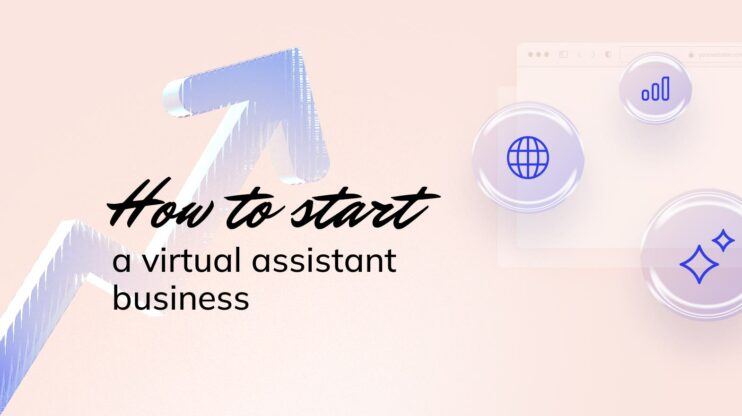
How to Start a Virtual Assistant Business
Starting a virtual assistant (VA) business offers a pathway to entrepreneurial success. This guide will walk you through essential steps, from evaluating your skills and defining your target market to creating a business plan and setting up the legal framework. You’ll also learn about building an online presence, pricing your services, managing finances, and effective client communication. FAQ How to…
How to Start a Photography Business: A Beginner’s Guide
Do you want to turn your passion for photography into a successful business? Starting a photography business involves more than taking stunning photos; it requires strategic planning and strong business understanding (if you want to go a long way with the business). This guide covers the essentials, from defining your unique photography brand and identifying your target market to creating…

25 Easy Steps to Start an Online Retail Business in 2024
Embarking on the journey of starting an online retail business holds immense potential in today’s digital landscape. With the global e-commerce market worth a whopping $3.63 trillion, and continually rising, now, more than ever, is the opportune moment to explore how to start an online retail business. This guide offers a detailed, step-by-step roadmap to walk you through all the…

How to Choose the Best Platform for Your E-commerce Website
The best hosting for your ecommerce website won’t be easy to find. Here are the criteria you should consider before choosing your e-store’s hosting provider.

A Complete Guide to WordPress eCommerce Websites
Thinking of building a WordPress eCommerce website 🤔? Here’s a complete guide ⚡️ to WP eCommerce Websites, including top advantages, disadvantages and more.
How to Sell Music Online: Your Own and as a Reseller
Top 71 shopify websites: discover ecommerce inspiration for 2024, 32 innovative ecommerce websites in 2024 for inspiration, 28 easy and practical steps to sell jewelry online in 2024, leave a comment cancel reply.
Your email address will not be published. Required fields are marked *
Your email address will never be published or shared. Required fields are marked *
Email address *
Save my name, email, and website in this browser for the next time I comment.
How to Start a Profitable Event Planning Business [11 Steps]
Business steps:, 1. perform market analysis., are event planning businesses profitable, 2. draft a event planning business plan..
Embarking on the journey of starting an event planning business requires a well-thought-out plan to guide your path to success. Crafting a comprehensive business plan is an essential step, as it will serve as a roadmap for your business's development and help you navigate through the complexities of the event industry. Here are key elements to include in your event planning business plan:
How does a event planning business make money?
Event planning businesses make money by charging for their services, which can include the coordination of catering, renting of venues, and publicizing the event. Event planning businesses can cover a wide range of events, including corporate seminars, wedding receptions, and more. For example, a target audience for an event planning business could be small business owners looking to start up a spice business. The event planning business could offer to organize a seminar that educates potential spice entrepreneurs on how to launch their own successful businesses.
3. Develop a event planning brand.
How to come up with a name for your event planning business, 4. formalize your business registration., resources to help get you started:, 5. acquire necessary licenses and permits for event planning., what licenses and permits are needed to run a event planning business, 6. open a business bank account and secure funding as needed., 7. set pricing for event planning services., what does it cost to start a event planning business, 8. acquire event planning equipment and supplies., list of software, tools and supplies needed to start a event planning business:, 9. obtain business insurance for event planning, if required., 10. begin marketing your event planning services., 11. expand your event planning business..
How to Start an Event Planning Business in 8 Steps in 2023

The information in this article is intended for general information purposes only. You should not rely on it as the sole basis for making any business, legal, or other decisions. While we make every effort to ensure that facts stated are correct at the time of publication, we do not accept any responsibility for keeping this information up to date. Any views expressed in this article are those of the author and do not necessarily represent those of Pay.com.
Starting a new business is stressful. And the pressure is even greater in the event planning space. Business owners in this competitive industry need to strategize business operations while simultaneously organizing extravaganzas that make clients swoon. Which is why you need a clear understanding of the building blocks necessary for success .
In addition to your creative flair, effective financial and business tools are essential for establishing an event planning business that flourishes. In this article, I’ll guide you through everything you need to do – and pay attention to – when starting an event planning business.
{{text-box}}
8 Steps to Start an Event Planning Business
There are a few things you’ll want to do to set up a successful event planning business. We’re exploring eight key steps that will take you from finding your niche to booking events, accepting payments, and tracking your performance to grow your business.
1. Perform Market Research
Successful businesses put their customers first. These entities focus on what the market wants or needs, and create products to fill that gap. But understanding exactly what your clients desire doesn’t just happen. This is where market research comes in.
To attract the type of client you want to plan events for, you need to understand who they are. Market research can reveal basic demographic data (like age range, income bracket, and geographic location) to identify potential customers .
Besides getting to know who your target market might be, market research can also help you to plan for the future . A deep dive into your potential clientele can help you to set realistic targets for your business, develop effective growth strategies, and identify opportunities for future growth.
One of the easiest ways to do market research is to look at companies you think would be your competitors . You’ll also want to conduct some audience surveys . Set these up on your social media channels and promote them to your target audience to attract attention and get responses.
2. Create a Business Plan
Once you know who you’ll be planning events for, it’s time to put together your business plan . This all-encompassing document creates a roadmap for your business , setting out where you want your business to go and how you intend on getting there.
A business plan is especially important if you’re going to be applying for finance from a bank or other financial institution. The document will show your funders how you plan to achieve your financial, operational and marketing goals . And how likely it is that you’ll be able to repay loans.
There are five elements that every business plan should include:
- Business overview: The type of events your business will focus on, its name, location, and who the key stakeholders are.
- Budget: Your projected income and expenditure over the first 12 months.
- Target market: The people or companies who you’ll be aiming to provide event planning services to.
- Competitors: The other companies that work in the same market where your business will operate.
- Marketing plan: How you intend to attract customers and how much doing this will cost.
3. Calculate Your Monthly Operating Costs
As a small events planning business, the most important ongoing costs to think about are likely the ones you’ll incur for using merchant services and products . Especially payment processing. Without this service, you won’t be able to accept any card or digital payments from customers.
It’s best to go with a provider that offers a flat-rate pricing model with a fixed per-transaction fee. This will ensure you know exactly how much you’ll pay for processing each month.
Other pricing models, like the tiered fee structure , lack transparency. It’s often difficult to decipher how the monthly fees relate to the transactions you’ve performed. Plus, it’s near impossible to use your bank statement to project what you’ll pay in subsequent months.
That’s why we use a flat-rate pricing model at Pay.com . This takes the guesswork out of what your monthly fees will be, which makes it easy for you to project costs based on how much business you’re doing – freeing up space for you to concentrate on building the best event planning business.
4. Register Your Business
Registering a business can be a complex, drawn-out process. Fortunately, if you’ve created a business plan, you’ll already have done much of the legwork required to get started.
One important factor to decide on at this stage is the type of business you’ll establish. You can choose from operating as a sole proprietor (if you’ll be running the company on your own), a partnership (if you’re working with someone), as well as other entities that provide limited liability (which ensures you won’t be held responsible for the company’s debts or other actions).
Each of these structures has benefits and drawbacks, mostly related to how much tax you’ll pay and your level of liability in the company’s dealings. It’s best to speak with a lawyer or business advisor with expertise in this field before making the decision .
Once you’ve decided on the structure, you can register the business name, get a tax number, and acquire all of the relevant licenses and permits that you’ll need to operate in your state.
5. Plan to Accept Customer Payments
Cash might be king, but in today’s world, convenience rules the roost. And cards are convenient – especially for big-ticket services like events – so you’ll want a way to accept debit and credit card payments from your customers .
It’s best to choose a merchant service provider that offers a variety of payment methods . Plus, you’ll be able to manage all of your payment-related administrative work in one place.
There are a few options for completing card-not-present transactions. At Pay.com, we offer four user-friendly solutions that all work well for event planning businesses:
- Payment gateway : Accept payments online via your website through a secure portal that protects cardholder details during transactions.
- Pay Virtual Terminal : Collect credit card details from customers (e.g. over the phone) and input them into your Pay Dashboard to accept payments.
- Pay Links : Use the Pay Dashboard to create a payment link with a personalized checkout page that can be sent to your customer.
- Pay Checkout: Generate an invoice with a payment request and unique payment link to send to your customer.
Offering your customers a variety of payment options makes getting paid easier and more convenient . On top of that, a seamless payment experience will help to boost your brand and build trust.
6. Set Up a Merchant Bank Account
If you’re planning on accepting debit or credit card payments in person or online , you may want to set up a merchant account . This account stores your customer’s funds while a transaction is being processed.
Although they’re usually a foundational merchant service product, some merchant service providers offer solutions that eschew the need for a merchant account . Especially if you’re just starting out in business.
Let’s say you decide to work with Pay.com to manage your digital and card transactions. Rather than going to the bank to open a merchant account, finding a partner to host your payment gateway, and connecting with a company that offers payment processing, you can combine all of these services on one platform.
With just a few clicks, you can set up an account and start accepting a variety of payment methods without having to open a merchant account. What’s more, you can use the Pay Dashboard to easily view and manage everything and anything related to your payments.
7. Market Your Business and Start Planning Events
Now that you know the types of events you want to plan, the clients you want to work with, and how you’re going to accept payments, it’s time to start bringing in some business! This is where marketing comes in.
Every modern business needs an online presence. It’s a super cost-effective way to promote your new event planning company to customers and potential partners alike.
There’s no need to overcomplicate things: a simple, one-page website and key social media accounts are more than enough to get your brand noticed. Be sure to create relevant posts on a regular basis – and don’t forget the power of advertising on social media.
Once you’ve drummed up some interest online, you’ll be on your way to booking your first client (or clients!) and planning events.
8. Track Your Success
To know where you’re going, you need to know where you came from. If you want to make decisions that grow your event planning business, you need data . Having information about how your customers behave is invaluable for planning and strategizing.
One great way to monitor this is through social media activity. Create event-specific hashtags for guests to use when posting photos to various social media channels. This will enable you to monitor how engaged attendees were and has the added benefit of promoting your services to those guests’ social media networks.
Another strategy is to survey past and existing clients. Ask them how they heard about your business, why they chose to work with you, and if they’d use your services again. Remember to include some specific questions about the event, too (e.g. about the venue or entertainment). This will help you to identify any possible areas for improvement.
This data will not only help you to make better decisions as your business grows , but will also enable you to provide personalized customer experiences that keep your client base engaged.
The Pros and Cons of Starting Your Own Event Planning Business
The event industry is bursting with glitz and glam, but there are some downsides to starting your own event planning business.
- Flexibility : You are the master of your own fate when you start your own event planning business. Who you work with, where you work, and when you work are all up to you.
- Repeat business : If you’ve organized an event that’s the talk of the town for weeks after, that client is likely to use your services again and again.
- Creative expression : Unlike the typical 9-to-5, event planning allows you to express your creativity to produce unforgettable experiences for your clients.
- Networking challenges : It takes time to build relationships with the service providers you will need to work with – especially in places where there are already many event planning businesses.
- Difficult to scale : Event planning businesses are resource intensive and it’s difficult to increase revenue without increasing resources or raising your prices.
- Long, irregular hours : Planning is done beforehand, but you’ll be expected to be on site when the event happens – that means working when everyone else is off and enjoying themselves.
The Bottom Line: Is Starting an Event Planning Business Right For You?
Event planning is a fast-paced job that will require you to be inventive and work with all sorts of interesting people. An event planning business is the ideal company to start for anyone who’s creative and client-focused – and wants the excitement of flexible work.
You’ll want to have all of your bases covered before you set about putting your first party together. A solid business plan is the best place to start. Having a definite direction for your event planning enterprise will help you to make decisions that keep you on track and help your business to grow .
Finances are a major factor when it comes to owning and operating an event planning business. So you’ll want to work with merchant service providers who minimize money-related stress for you and your customers .
Choose a full-service provider that offers quick, easy and convenient ways to accept payments . It’s best to go for a platform that allows you to set up accounts, configure payment methods, and manage customer profiles in just a few clicks – and for a fixed fee . Like Pay.com.
If you’re up to the challenge of operating in this competitive space and you’re motivated by seeing people have a good time, starting an event planning business might just be right for you.
How can an event planning business accept payments?
There are a few ways that an event planning business can accept card-not-present payments. A payment gateway is great for any business that has a website. But if you don’t have a website, you can use payment links, virtual terminals, and online invoices to request and accept payments – all of which you can access if you use Pay.com, a full payment service provider.
Is an event planning business profitable?
How profitable your business will be depends on a variety of factors. If you’re able to charge a lot for your services while keeping costs down, you’re likely to make a pretty profit . However, if costs are high and you aren’t able to book big-ticket events, your event planning business is likely to be less lucrative.
How do I start an event planning business with no money?
You can easily set up an event planning business with little to no startup money. If you keep the operation small and work as a sole proprietor, there’s no need to register the business or set up a merchant bank account. That said, this route does limit the opportunity for growth. So you may want to explore the pros and cons of different business structures, as well as the tools you need to run them.
Do event planners use their own money?
When it comes to setting up an event planning business, event planners usually use a combination of their own seed money as well as loans and third-party investments. For the actual event planning, they will usually use the client’s money (secured as a deposit) and will have credit agreements with suppliers who the planner will pay when the client settles the balance of their account with them.

Pay.com makes it simple for you to accept credit cards, debit cards, and a variety of other payment methods. You can easily invoice your customers, take their card details over the phone, or let them pay through your website.
.jpg)
5 Reasons Your Business Needs Embedded Payments

22 Best Mobile Apps for Small Businesses

Debit Card Processing Fees: Ultimate Guide for Sellers in 2023
Ready to boost revenue for your business.
We earn commissions if you shop through the links below. Read more
Event Planning Business
Back to All Business Ideas
How to Start an Event Planning Business – Learn from Pros
Written by: Carolyn Young
Carolyn Young is a business writer who focuses on entrepreneurial concepts and the business formation. She has over 25 years of experience in business roles, and has authored several entrepreneurship textbooks.
Edited by: David Lepeska
David has been writing and learning about business, finance and globalization for a quarter-century, starting with a small New York consulting firm in the 1990s.
Published on January 13, 2022 Updated on July 3, 2024

Investment range
$2,050 - $7,100
Revenue potential
$100,000 - $400,000 p.a.
Time to build
0 – 3 months
Profit potential
$70,000 - $160,000 p.a.
Industry trend
Some people thrive on planning events such as wedding receptions, parties, or banquets, but others find it an arduous task. That’s where event planners come in. Event planning as an industry is valued at over $3 billion in the US If you’re one of those who enjoy planning events, an event planning business could be a lucrative opportunity for you. You can make 15% to 20% of the total cost of the event, so think about how much you’ll make for planning a $50,000 wedding reception!
Planning and launching your business, however, is in itself an arduous task. It will take preparation, just like an event, as well as knowledge. Fortunately, you’ve come to the right source, as this step-by-step guide has all the information you need to be on your way to entrepreneurship as an event planner.
Step by Step Business values real-life experience above all. Through our Entrepreneur Spotlight Series , we interview business leaders from diverse industries, providing readers with firsthand insights.
If you’re venturing into the world of event planning, this interview with Dominic Richards offers invaluable insights into pioneering sustainable practices.
Explore our interview with Michael Alexis for essential insights into organizing and planning successful team building events.
Looking to register your business? A limited liability company (LLC) is the best legal structure for new businesses because it is fast and simple.
Form your business immediately using ZenBusiness LLC formation service or hire one of the Best LLC Services .
Step 1: Decide if the Business Is Right for You
Pros and cons.
Starting an event planning business has pros and cons to consider before deciding if it’s the right path for you.
- Never Be Bored! – Every event and every day will be different
- Low Startup Costs – No inventory or equipment to buy
- High-Profit Potential – Good revenue, low ongoing expenses
- After Hours Work – Evenings and weekends will be busy
- High Stress – Pressure from timing, budget constraints, difficult people
Event planning industry trends
Corporate event planning makes up a large part of the industry, so as corporate profits rise, the event planning industry thrives.
Industry size and growth
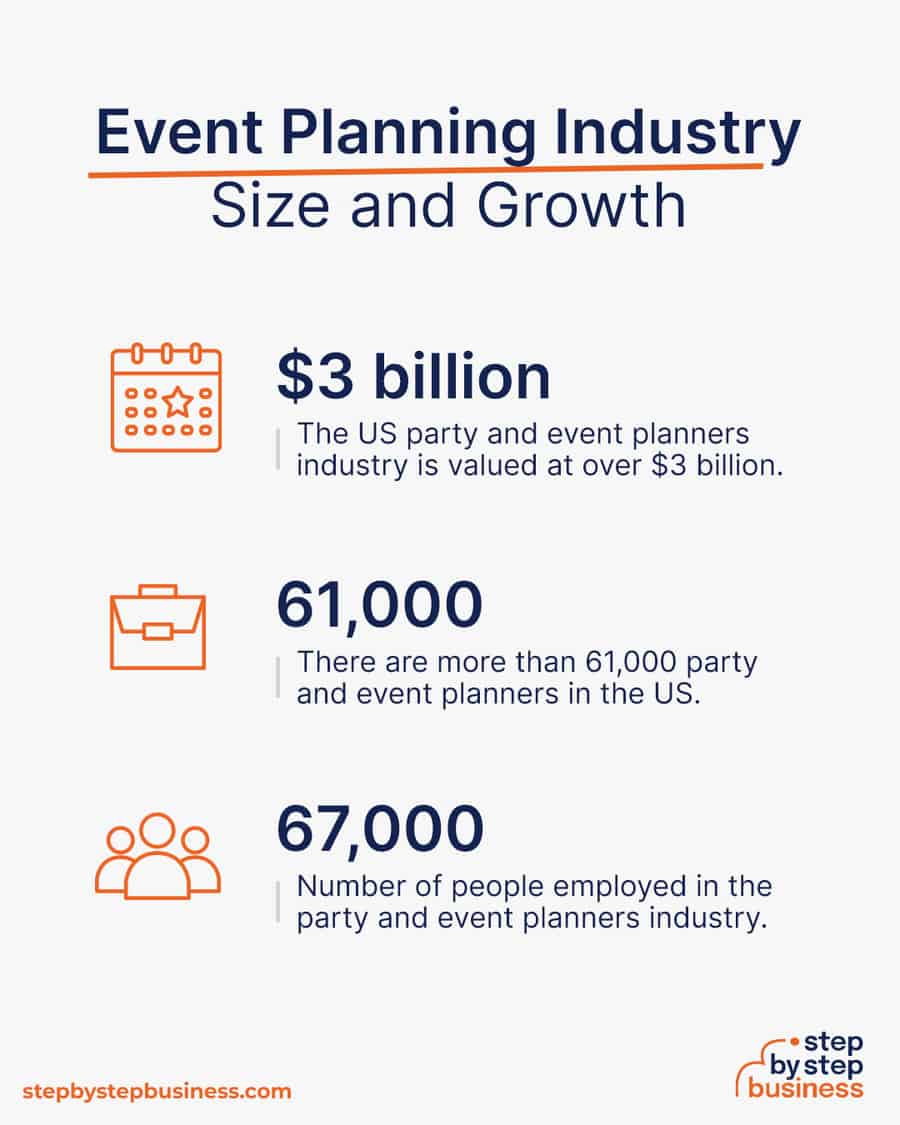
- Industry size and past growth – The US party and event planners industry is valued at over $3 billion in 2022.(( https://www.ibisworld.com/industry-statistics/market-size/party-event-planners-united-states/ ))
- Growth forecast – Corporate profit is expected to increase as the economy improves. With bigger earnings, businesses will have more money to spend on events, raising the demand for professional event planning services.
- Number of businesses – There are more than 61,000 party and event planners in the US.(( https://www.ibisworld.com/industry-statistics/number-of-businesses/party-event-planners-united-states/ ))
- Number of people employed – Nearly 67,000 people are employed in the party and event planners industry.(( https://www.ibisworld.com/industry-statistics/employment/party-event-planners-united-states/ ))
Trends and challenges
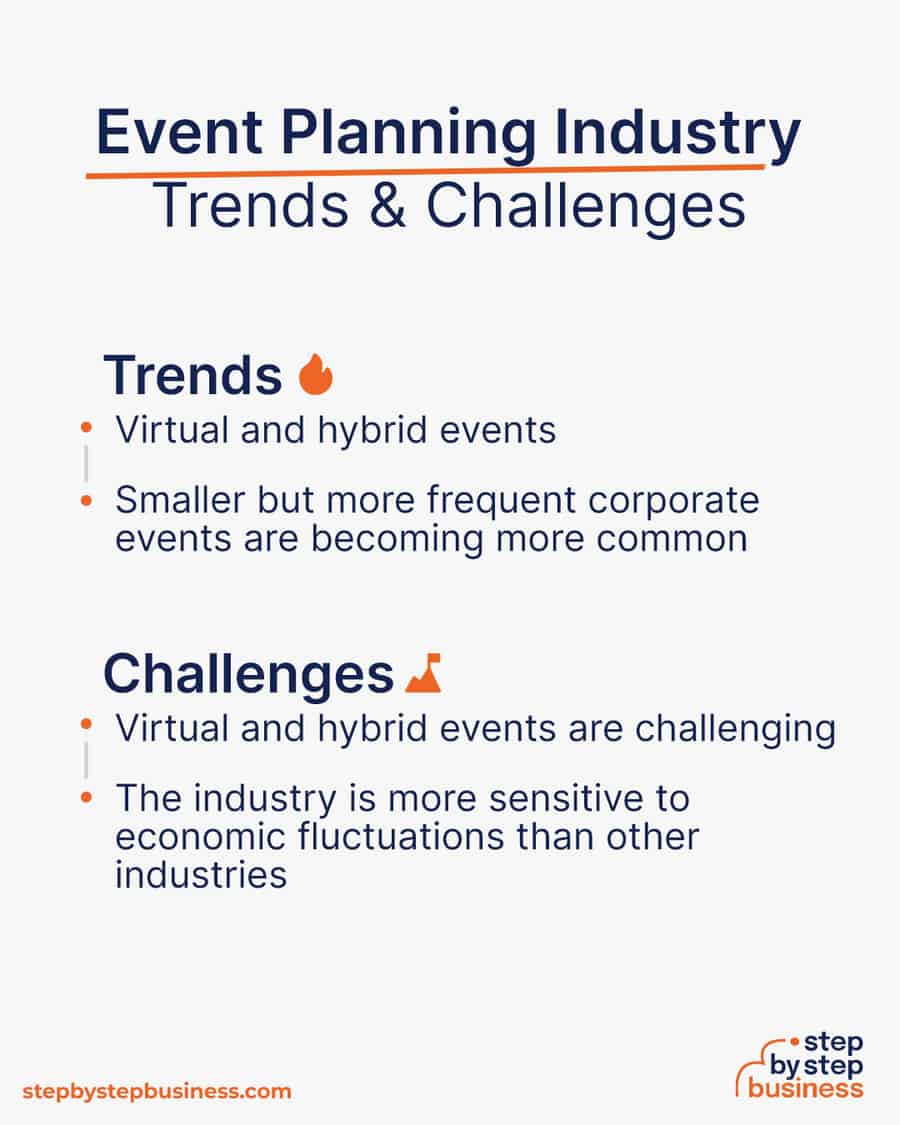
Trends in the event planning industry include:
- Virtual and hybrid events, which emerged in 2020, are continuing to be a popular option. Safety precautions are also in demand such as socially distant seating, mask requirements, and ventilation.
- Smaller but more frequent corporate events are becoming more common. This presents an opportunity for an event planner to plan a yearlong series of events rather than just an annual event.
Challenges in the event planning industry also exist which include:
- Virtual and hybrid events are challenging, and event planners need to be more tech-savvy to ensure that attendees are still interacting and having fun.
- The industry is more sensitive to economic fluctuations than other industries, so economic uncertainty is an issue for event planners. They need to be prepared for large decreases in volume and revenue during economic downturns.
What kind of people work in event planning?
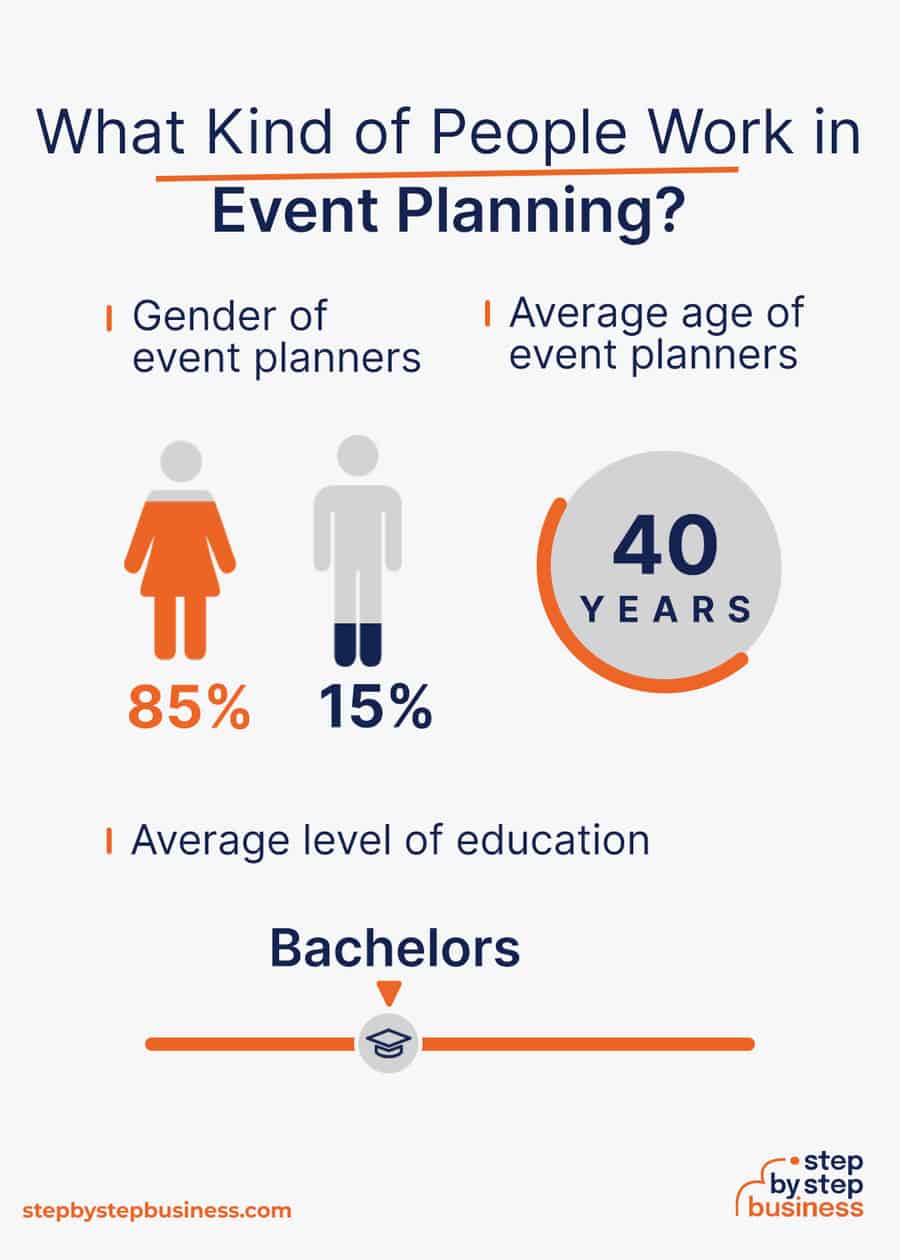
- Gender – More than 85% of event planners are female, and the rest are male.(( https://www.zippia.com/meeting-event-planner-jobs/demographics/#gender-statistics ))
- Average level of education – Nearly 3 in 4 event planners hold a bachelor’s degree. They usually study business, hospitality management, or communication.(( https://www.zippia.com/meeting-event-planner-jobs/education/ ))
- Average age – Event planners are usually under 40 years old.(( https://www.zippia.com/meeting-event-planner-jobs/demographics/#age-statistics ))
How much does it cost to start an event planning business?
Startup costs for an event planning business range from $2,000 to $7,000. The high-end costs include a larger marketing budget and virtual event planning software.
| Start-up Costs | Ballpark Range | Average |
|---|---|---|
| Setting up a business name and corportation | $150 - $200 | $175 |
| Licenses and permits | $100 - $300 | $200 |
| Insurance | $100 - $300 | $200 |
| Business cards and brochures | $200 - $300 | $250 |
| Website setup | $1,000 - $3,000 | $2,000 |
| Virtual and hybrid event software | $0 - $2,000 | $1,000 |
| Initial marketing budget | $500 - $1,000 | $750 |
| Total | $2,050 - $7,100 | $4,575 |
How much can you earn from an event planning business?
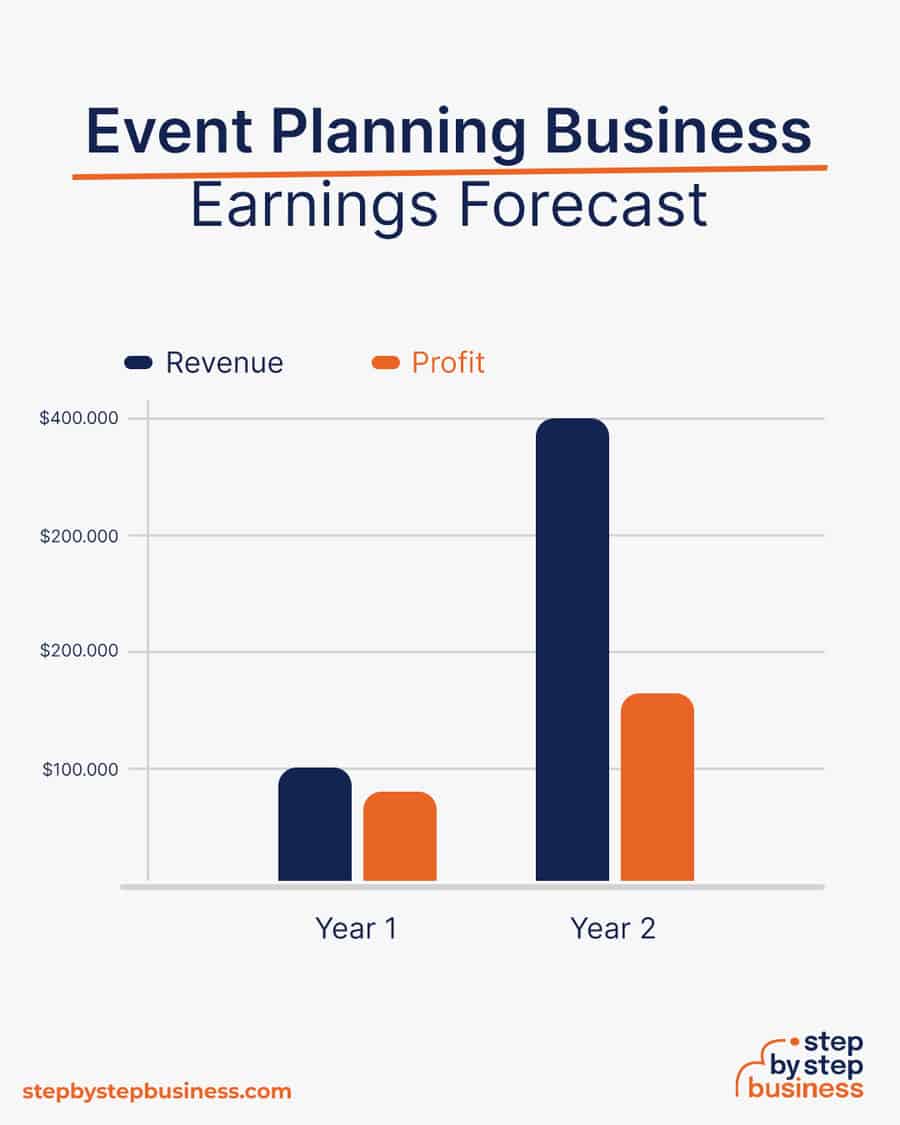
You can charge between 15% to 20% of the total cost of an event, or you can charge an hourly rate of between $100 to $150. These calculations will assume that average events cost $20,000 and that you’ll charge 20%. If you hire assistants to work with you at the events, your profit margin should be about 70%.
In your first year or two, you could work from home and do 25 events per year, bringing in $100,000 in annual revenue. This would mean $70,000 in profit, assuming that 70% margin. As your brand gains recognition, sales could climb to 100 events per year. At this stage, you would rent a commercial space and hire additional staff, reducing your profit margin to around 40%. With expected annual revenue of $400,000, you would make about $160,000.
What barriers to entry are there?
There are a few barriers to entry for an event planning business. Your biggest challenges will be:
- You need to have excellent event planning skills
- You’ll face competition from large companies including hotels
Related Business Ideas

How to Start an Event Space Business in 13 Steps

How to Start a Wedding Planning Business in 13 Steps

How to Start a Party Rental Business in 13 Steps
Step 2: hone your idea.
Now that you know what’s involved in starting an event planning business, it’s a good idea to hone your concept in preparation to enter a competitive market.
Market research will give you the upper hand, even if you’re already positive that you have a perfect product or service. Conducting market research is important, because it can help you understand your customers better, who your competitors are, and your business landscape.
Why? Identify an opportunity
Research event planning businesses in your area to examine their services, price points, and customer reviews. You’re looking for a market gap to fill. For instance, maybe the local market is missing a virtual corporate event planning service.
You might consider targeting a niche market by specializing in a certain aspect of your industry such as wedding receptions.
This could jumpstart your word-of-mouth marketing and attract clients right away.
What? Determine your services
You need to determine what kinds of services you want to offer during the course of your event planning. You can provide a full service in which you handle all the logistics of getting everything to the event and setting it up, or you can just do the planning and scheduling. Here are the most common types of event planning services:
- Corporate event planning
- Wedding planning
- Bachelor party planning
- Social event planning
- Non-profit event planning
- Festival and concert planning
- Conference and seminar planning
- Sports event planning
- Destination event planning
- Virtual event planning
- Exhibition and trade show planning
You could also expand your business by adding additional services including:
- Photography
Those might be things that you add later as your business grows.
How much should you charge for event planning services?
Generally, event planners charge 15% to 20% of the total cost of the event. For smaller events, it might be better to charge by the hour. Hourly rates can range from $100 to $150. If you work from home your costs will be limited to labor costs, fuel, and marketing. You should aim for a profit margin of about 70%.
Once you know your costs, you can use this Step By Step profit margin calculator to determine your mark-up and final price point. Remember, the price you use at launch should be subject to change if warranted by the market.
Who? Identify your target market
Your target market will depend on the kind of events you want to do. If you do corporate events, your target will be corporate managers, most likely human resources managers. You can reach those people on LinkedIn or by making direct calls to corporations. If you do parties and wedding receptions your target will be broader, but generally, it will be more well-established people who you can also find on LinkedIn as well as Facebook.
Where? Choose your business premises
In the early stages, you may want to run your business from home to keep costs low, and you may want to continue to do business from home. But as your business grows, you’ll likely need to hire workers for various roles and may need to rent out an office. Find commercial space to rent in your area on sites such as Craigslist , Crexi , and Instant Offices .
When choosing a commercial space, you may want to follow these rules of thumb:
- Central location accessible via public transport
- Ventilated and spacious, with good natural light
- Flexible lease that can be extended as your business grows
- Ready-to-use space with no major renovations or repairs needed
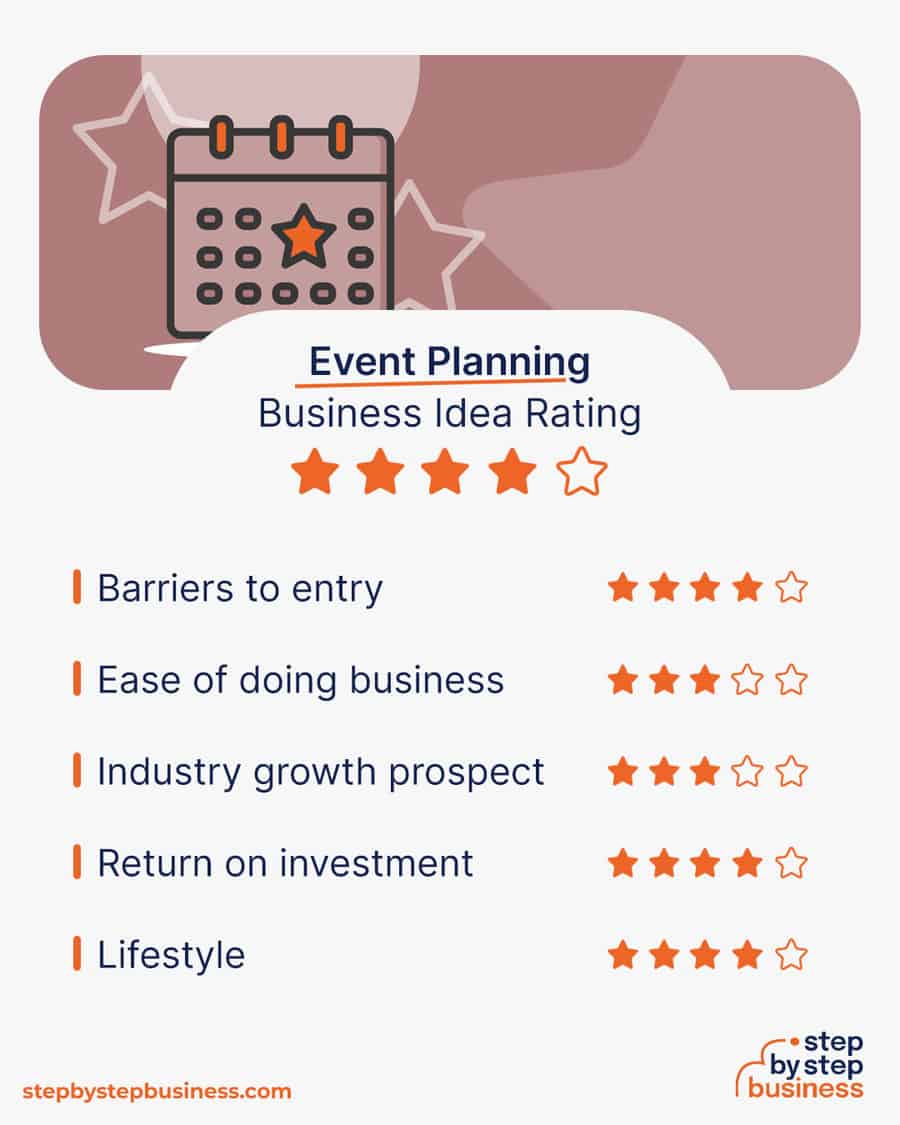
Step 3: Brainstorm an Event Planning Business Name
Here are some ideas for brainstorming your business name:
- Short, unique, and catchy names tend to stand out
- Names that are easy to say and spell tend to do better
- Name should be relevant to your product or service offerings
- Ask around — family, friends, colleagues, social media — for suggestions
- Including keywords, such as “event planning” or “event planner”, boosts SEO
- Name should allow for expansion, for ex: “Divine Celebrations” over “Baby Shower Planners”
- A location-based name can help establish a strong connection with your local community and help with the SEO but might hinder future expansion
Once you’ve got a list of potential names, visit the website of the US Patent and Trademark Office to make sure they are available for registration and check the availability of related domain names using our Domain Name Search tool. Using “.com” or “.org” sharply increases credibility, so it’s best to focus on these.
Find a Domain
Powered by GoDaddy.com
Finally, make your choice among the names that pass this screening and go ahead with domain registration and social media account creation. Your business name is one of the key differentiators that sets your business apart. Once you pick your company name, and start with the branding, it is hard to change the business name. Therefore, it’s important to carefully consider your choice before you start a business entity.
Step 4: Create an Event Planning Business Plan
Here are the key components of a business plan:

- Executive Summary: Highlight the vision and strategy of your event planning business, focusing on providing comprehensive planning services for a variety of events, including corporate, social, and special occasions.
- Business Overview: Describe your business’s specialization in event planning, including services like venue selection, vendor coordination, theme development, and day-of event management.
- Product and Services: Detail the range of event planning services, from full-service planning to consultation and specific event components like catering or entertainment management.
- Market Analysis: Assess the demand for event planning services, considering target markets like businesses, bridal couples, or non-profit organizations.
- Competitive Analysis: Compare your business to other event planners, focusing on your unique selling points like niche event expertise, creative design approaches, or exceptional vendor relationships.
- Sales and Marketing: Outline your strategy for attracting clients, including networking, social media marketing, or partnering with venues and vendors.
- Management Team: Highlight the experience and qualifications of your team, particularly in areas like event coordination, design, and customer service.
- Operations Plan: Describe the process of event planning, from client consultations and concept development to execution and post-event feedback.
- Financial Plan: Provide an overview of financial aspects, including startup costs, pricing strategy, and anticipated revenue.
- Appendix: Include supplementary documents such as portfolios of past events, client testimonials, or detailed market research to support your business plan.
If you’ve never created a business plan yourself before, it can be an intimidating task. Consider hiring an experienced business plan writer to create a professional business plan for you.
Step 5: Register Your Business
Registering your business is an absolutely crucial step — it’s the prerequisite to paying taxes, raising capital, opening a bank account, and other guideposts on the road to getting a business up and running.
Plus, registration is exciting because it makes the entire process official. Once it’s complete, you’ll have your own business!
Choose where to register your company
Your business location is important because it can affect taxes, legal requirements, and revenue. Most people will register their business in the state where they live, but if you’re planning to expand, you might consider looking elsewhere, as some states could offer real advantages when it comes to event planning businesses.
If you’re willing to move, you could really maximize your business! Keep in mind, it’s relatively easy to transfer your business to another state.
Choose your business structure
Business entities come in several varieties, each with its pros and cons. The legal structure you choose for your event planning business will shape your taxes, personal liability, and business registration requirements, so choose wisely.
Here are the main options:

- Sole Proprietorship – The most common structure for small businesses makes no legal distinction between company and owner. All income goes to the owner, who’s also liable for any debts, losses, or liabilities incurred by the business. The owner pays taxes on business income on his or her personal tax return.
- General Partnership – Similar to a sole proprietorship, but for two or more people. Again, owners keep the profits and are liable for losses. The partners pay taxes on their share of business income on their personal tax returns.
- Limited Liability Company (LLC) – Combines the characteristics of corporations with those of sole proprietorships or partnerships. Again, the owners are not personally liable for debts.
- C Corp – Under this structure, the business is a distinct legal entity and the owner or owners are not personally liable for its debts. Owners take profits through shareholder dividends, rather than directly. The corporation pays taxes, and owners pay taxes on their dividends, which is sometimes referred to as double taxation.
- S Corp – An S-Corporation refers to the tax classification of the business but is not a business entity. An S-Corp can be either a corporation or an LLC , which just need to elect to be an S-Corp for tax status. In an S-Corp, income is passed through directly to shareholders, who pay taxes on their share of business income on their personal tax returns.
We recommend that new business owners choose LLC as it offers liability protection and pass-through taxation while being simpler to form than a corporation. You can form an LLC in as little as five minutes using an online LLC formation service. They will check that your business name is available before filing, submit your articles of organization , and answer any questions you might have.
Form Your LLC
Choose Your State
We recommend ZenBusiness as the Best LLC Service for 2024

Step 6: Register for Taxes
The final step before you’re able to pay taxes is getting an Employer Identification Number , or EIN. You can file for your EIN online or by mail or fax: visit the IRS website to learn more. Keep in mind, if you’ve chosen to be a sole proprietorship you can simply use your social security number as your EIN.
Once you have your EIN, you’ll need to choose your tax year. Financially speaking, your business will operate in a calendar year (January–December) or a fiscal year, a 12-month period that can start in any month. This will determine your tax cycle, while your business structure will determine which taxes you’ll pay.
The IRS website also offers a tax-payers checklist , and taxes can be filed online.
It is important to consult an accountant or other professional to help you with your taxes to ensure you’re completing them correctly.
Step 7: Fund your Business
Securing financing is your next step and there are plenty of ways to raise capital:

- Bank loans: This is the most common method but getting approved requires a rock-solid business plan and strong credit history.
- SBA-guaranteed loans: The Small Business Administration can act as guarantor, helping gain that elusive bank approval via an SBA-guaranteed loan .
- Government grants: A handful of financial assistance programs help fund entrepreneurs. Visit Grants.gov to learn which might work for you.
- Friends and Family: Reach out to friends and family to provide a business loan or investment in your concept. It’s a good idea to have legal advice when doing so because SEC regulations apply.
- Crowdfunding: Websites like Kickstarter and Indiegogo offer an increasingly popular low-risk option, in which donors fund your vision. Entrepreneurial crowdfunding sites like Fundable and WeFunder enable multiple investors to fund your business.
- Personal: Self-fund your business via your savings or the sale of property or other assets.
Your best bet will be personal funding since you don’t need much cash to get started.
Step 8: Apply for Licenses/Permits
Starting an event planning business requires obtaining a number of licenses and permits from local, state, and federal governments. Federal regulations, licenses, and permits associated with starting your business include doing business as, health license and permit from the Occupational Safety and Health Administration ( OSHA ), trademarks, copyrights, patents, and other intellectual properties, as well as industry-specific licenses and permits.
You may also need state-level licenses and local county or city-based licenses and permits. The license requirements and how to obtain them vary, so check the websites of your state, city, and county governments or contact the appropriate person to learn more. You could also check this SBA guide for your state’s requirements.
This is not a step to be taken lightly, as failing to comply with legal requirements can result in hefty penalties.
If you feel overwhelmed by this step or don’t know how to begin, it might be a good idea to hire a professional to help you check all the legal boxes.
For peace of mind and to save time, we recommend using MyCorporation’s Business License Compliance Package . They will research the exact forms you need for your business and state, and provide them to you to make sure you’re fully compliant.
Step 9: Open a Business Bank Account
Before you start making money, you’ll need a place to keep it, and that requires opening a bank account . Keeping your business finances separate from your personal account makes it easy to file taxes and track your company’s income, so it’s worth doing even if you’re running your event planning business as a sole proprietorship.
Opening a business bank account is quite simple, and similar to opening a personal one. Most major banks offer accounts tailored for businesses — just inquire at your preferred bank to learn about their rates and features.
Banks vary in terms of offerings, so it’s a good idea to examine your options and select the best plan for you. Once you choose your bank, bring in your EIN (or Social Security Number if you decide on a sole proprietorship), articles of incorporation, and other legal documents and open your new account.
Step 10: Get Business Insurance
Business insurance is an area that often gets overlooked yet it can be vital to your success as an entrepreneur. Insurance protects you from unexpected events that can have a devastating impact on your business.
Here are some types of insurance to consider:

- General liability: The most comprehensive type of insurance, acting as a catch-all for many business elements that require coverage. If you get just one kind of insurance, this is it. It even protects against bodily injury and property damage.
- Business Property: Provides coverage for your equipment and supplies.
- Equipment Breakdown Insurance: Covers the cost of replacing or repairing equipment that has broken due to mechanical issues.
- Worker’s compensation: Provides compensation to employees injured on the job.
- Property: Covers your physical space, whether it is a cart, storefront, or office.
- Commercial auto: Protection for your company-owned vehicle.
- Professional liability: Protects against claims from a client who says they suffered a loss due to an error or omission in your work.
- Business owner’s policy (BOP): This is an insurance plan that acts as an all-in-one insurance policy, a combination of any of the above insurance types.
Step 11: Prepare to Launch
As opening day nears, prepare for launch by reviewing and improving some key elements of your business.
Essential software and tools
Being an entrepreneur often means wearing many hats, from marketing to sales to accounting, which can be overwhelming. Fortunately, many websites and digital tools are available to help simplify many business tasks.
You can use industry-specific software, such as Backstage , Cvent , or Planning Pod , to manage your planning tasks, scheduling, pricing, billing, and workflows.
- Popular web-based accounting programs for smaller businesses include Quickbooks , Freshbooks , and Xero .
- If you’re unfamiliar with basic accounting, you may want to hire a professional, especially as you begin. The consequences for filing incorrect tax documents can be harsh, so accuracy is crucial.
Develop your website
Website development is crucial because your site is your online presence and needs to convince prospective clients of your expertise and professionalism.
You can create your own website using services like WordPress, Wix, or Squarespace . This route is very affordable, but figuring out how to build a website can be time-consuming. If you lack tech-savvy, you can hire a web designer or developer to create a custom website for your business.
They are unlikely to find your website, however, unless you follow Search Engine Optimization ( SEO ) practices. These are steps that help pages rank higher in the results of top search engines like Google.
Here are some powerful marketing strategies for your future business:
- Collaborate with Local Influencers: Partner with local influencers who align with your brand to increase visibility and credibility, as their endorsement can significantly impact your business.
- Social Media Challenges and Giveaways: Create engaging challenges or giveaways on social media platforms to increase your online presence, encourage user participation, and generate buzz around your event planning services.
- Strategic Partnerships with Venues and Vendors: Establish partnerships with popular local venues and trusted vendors to expand your network, enhance your offerings, and gain referrals through mutual collaboration.
- Client Testimonials and Case Studies: Highlight successful events you’ve organized through client testimonials and detailed case studies, showcasing your ability to turn visions into reality and build client confidence.
- Leverage User-Generated Content: Encourage clients to share photos and testimonials from their events on social media, creating a portfolio of diverse events and leveraging authentic content to attract a wider audience.
- Implement a Referral Program: Create a referral program that rewards clients, vendors, and partners who refer new business to you, fostering a network of advocates who actively promote your services.
- Local SEO Optimization: Optimize your online content for local search engine optimization (SEO) to ensure that your business appears prominently in local searches, attracting clients within your service area.
- Targeted Email Marketing Campaigns: Develop targeted email campaigns to reach potential clients directly, offering exclusive promotions, insights, and valuable content to keep your business top-of-mind.
Focus on USPs

Unique selling propositions, or USPs, are the characteristics of a product or service that sets it apart from the competition. Customers today are inundated with buying options, so you’ll have a real advantage if they are able to quickly grasp how your event planning business meets their needs or wishes. It’s wise to do all you can to ensure your USPs stand out on your website and in your marketing and promotional materials, stimulating buyer desire.
Global pizza chain Domino’s is renowned for its USP: “Hot pizza in 30 minutes or less, guaranteed.” Signature USPs for your event planning business could be:
- Professional planning for your virtual corporate events
- Party planning to make your event fun and safe
- Start to finish planning – we handle every detail of your event
You may not like to network or use personal connections for business gain. But your personal and professional networks likely offer considerable untapped business potential. Maybe that Facebook friend you met in college is now running an event planning business, or a LinkedIn contact of yours is connected to dozens of potential clients. Maybe your cousin or neighbor has been working in event planning for years and can offer invaluable insight and industry connections.
The possibilities are endless, so it’s a good idea to review your personal and professional networks and reach out to those with possible links to or interest in event planning. You’ll probably generate new customers or find companies with which you could establish a partnership.
Step 12: Build Your Team
If you’re starting out small from a home office, you may not need any employees. But as your business grows, you will likely need workers to fill various roles. Potential positions for an event planning business would include:
- Event Assistants – assist with planning, events
- Delivery Drivers – deliver items to events
- Marketing Lead – SEO strategies, social media, other marketing
At some point, you may need to hire all of these positions or simply a few, depending on the size and needs of your business. You might also hire multiple workers for a single role or a single worker for multiple roles, again depending on need.
Free-of-charge methods to recruit employees include posting ads on popular platforms such as LinkedIn, Facebook, or Jobs.com. You might also consider a premium recruitment option, such as advertising on Indeed , Glassdoor , or ZipRecruiter . Further, if you have the resources, you could consider hiring a recruitment agency to help you find talent.
Step 13: Run an Event Planning Business – Start Making Money!
An event planning business can be a dynamic and rewarding way to make some money and have fun at the same time. It’s a $3 billion industry so clearly, your services will be in demand. All kinds of events need planning, from corporate events, to birthday bashes, to wedding receptions, and more.
The possibilities are endless, as is the opportunity to make a comfortable living. Now that you’ve started your planning process by gathering information, you’re ready for the rest of your entrepreneurial event!
- Event Planning Business FAQs
Event planning can be very profitable. You can charge 15% to 20% of the total cost of an event, so if you, for example, do a corporate event that costs $50,000, you can make up to $10,000. Corporate event and wedding reception planning will tend to be your most profitable services.
To create event proposals and contracts for clients, you should start by conducting a thorough needs assessment with the client to understand their goals, preferences, and budget for the event. Based on this information, you can develop a detailed proposal that outlines the scope of services, event concept, budget breakdown, and timeline.
There are several strategies for getting clients for an event planning business, including networking with other professionals in the industry, establishing a strong online presence through social media and a website, offering specialized services or expertise in a specific niche, and attending industry events and conferences to build relationships and generate leads.
Yes, it is possible to start an event planning business on the side, although it may require significant time management and organization skills to balance the business with other commitments. It is important to carefully consider your available time, resources, and expertise, as well as the potential demand for your services and the competition in the market.
Some popular courses and certifications include the Certified Special Events Professional (CSEP) certification offered by the International Live Events Association (ILEA), the Certified Meeting Professional (CMP) certification offered by the Events Industry Council, and courses offered by industry organizations and professional associations such as the National Association of Event Planners and Suppliers (NAEPS) and the Wedding Industry Professionals Association (WIPA).
Leave a Reply Cancel reply
Your email address will not be published. Required fields are marked *
Save my name, email, and website in this browser for the next time I comment.
- Decide if the Business Is Right for You
- Hone Your Idea
- Brainstorm an Event Planning Business Name
- Create an Event Planning Business Plan
- Register Your Business
- Register for Taxes
- Fund your Business
- Apply for Licenses/Permits
- Open a Business Bank Account
- Get Business Insurance
- Prepare to Launch
- Build Your Team
- Run an Event Planning Business - Start Making Money!
Subscribe to Our Newsletter
Featured resources.

57 In-Demand Service Business Ideas You Can Launch Today
David Lepeska
Published on December 1, 2022
The services sector is undoubtedly the biggest economic sector in the US as it accounts for nearly 70% of the country’s gross domestic product. It ...

18 Party Business Ideas for Every Celebration
Carolyn Young
Published on July 21, 2022
If you like to socialize and have great organizing skills, then starting a party-related business might be the perfect career choice. Greatattention ...

56 Inspiring Business Ideas for Women Entrepreneurs
Esther Strauss
Published on June 30, 2022
Women run more than 11 million US businesses. That’s a lot less than the number run by men, but one thing is certain — women are just asinno ...
No thanks, I don't want to stay up to date on industry trends and news.

- Shop pc/nametag

How to Start an Event Planning Business in 15 Steps
- Select a Topic
- Industry Trends
- Professional Development
- Sales and Marketing
- Inspiration
- Safety & Security
- Health & Wellness
- Experiential
- Sustainability
- Diversity and Inclusion
- Just for Fun
Subscribe for weekly updates
Search the blog.

Meaghan Maybee
As pc/nametag's in-house Word Wizard, Meaghan creates educational content that brings people together and drives meaningful conversations in the events industry.
The world of event planning can be exciting, rewarding, and enjoyable, especially for people who love to tackle complex tasks in a fast-paced environment.
Are you someone who finds joy in creating events, bringing people together, and creating meaningful moments? Do you have event planning experience or a desire to learn? If so, then starting your own event planning business could be a great fit for you.
Starting an event planning, wedding planning, or party planning business is hard work. However, we’ve made the process a bit easier. If you are wondering what to know before starting an event planning business, follow these 15 actionable steps to help you get your business off the ground, spread awareness, attract clients, and earn repeat business.

How to Start Your Own Event Planning Business
1. choose your event planning career path..
To say there are so many different types of event planners is an understatement. Most event professionals focus their efforts on one or a few different event types ranging from multi-day conferences all the way to non-profit fundraisers, corporate meetings, private weddings, and more. Examples of specialist event planners include the following:
- Event Coordinator: Has a wide range of clients and is equipped to host all types of events.
- Conference Planner: Oversees the coordination of seminars, expos, trade shows, and exhibitions.
- Wedding Planner: Assists couples by coordinating a venue, caterer , florist, DJ, photographer, etc.
- Venue Planner: Coordinates in-house events for arenas, convention centers, hotels, etc.
- Non-profit Planner: Helps not-for-profit organizations raise awareness, plan fundraisers, etc.
- Party Planner: Plans birthday parties, bridal showers, baby showers, and similar personal events.
- Event Technologist: Leverages the event technology trends and tools for digitally driven events.
In your business plan, you’ll need to define the extent of your services. Are you providing a broad range of full-service offerings? Or are you focusing on producing specific types of events? What is your target market?
Remember, don't try to offer everything to everyone. While offering tons of services sounds like it would earn you more business, you will likely quickly overextend yourself. Instead, focus on a few things you do well, then expand upon them as you gain experience.

2. Conduct event planning market research.
Every great event planning business starts with data collection. After all, it’s nearly impossible to understand your customers, their challenges, and what they want out of your services if you don’t have the findings to support your ideas.
Market research involves gathering information to better understand your target market. Event professionals use this data to provide stronger services, improve client satisfaction, and craft an event marketing plan that attracts qualified leads and improves conversion rates.
Start by hosting surveys, conducting interviews, gathering focus groups, or simply observing your target customer base. Collect data, make observations, and create personas that answer the following:
- Who are they?
- What are their goals?
- What are their challenges?
- What resources do they need to be successful?
Your clients want solutions—so provide them! The key to happy clients that return year-over-year is providing tools, resources, and knowledge that they know will make their events run smoother.
| Digital Marketing Manager at |
3. Conduct a competitive analysis for your event planning business.
Once you understand your target customer, it’s time to understand your competitors. Competitive analysis helps you understand your competitors’ services, marketing strategies , general strengths, and weaknesses relative to your own. Your goal is to highlight your own unique advantages, as well as potential business strategy barriers you may face.
Look at the event planning businesses in your area. Note the following in your competitive analysis:
- What are your competitor’s target markets?
- What services do they offer?
- What services don’t they offer?
- What do they charge for each service?
- What is their geographic reach or service area?
- How do they market and promote their services?
- What unique selling propositions do they have?
- What are people saying about your competitors?
With all this information at your fingertips, you can start forming a unique business strategy. Utilize these findings to help yourself stand out. How will you succeed where other businesses fall short?
Remember, you don’t need to offer completely different services than your competitors. You just need to make your offerings enticing enough to catch their eyes (and hopefully earn their business)!
4. Create an event business plan.
Your event business plan is the foundation of your company’s success. It is a document that includes important information about the goals and expectations you’ve set for yourself.
An event business plan should include the following:
- Your mission statement
- Your scope of work
- Market analysis findings
- Financial objectives
- Marketing strategies
- A timeline for getting started
This is also the stage in which you should research the legal and financial requirements for running a business. You may need to register your business, obtain insurance, and set up a business bank account. Certain banks and investors may need to see your business plan, so ensure it is thorough.
If you want to strengthen your business plan even further, include a SWOT (strengths, weaknesses, opportunities, threats) analysis . This planning process will help you overcome challenges, discover new ideas, and create data-driven strategies.
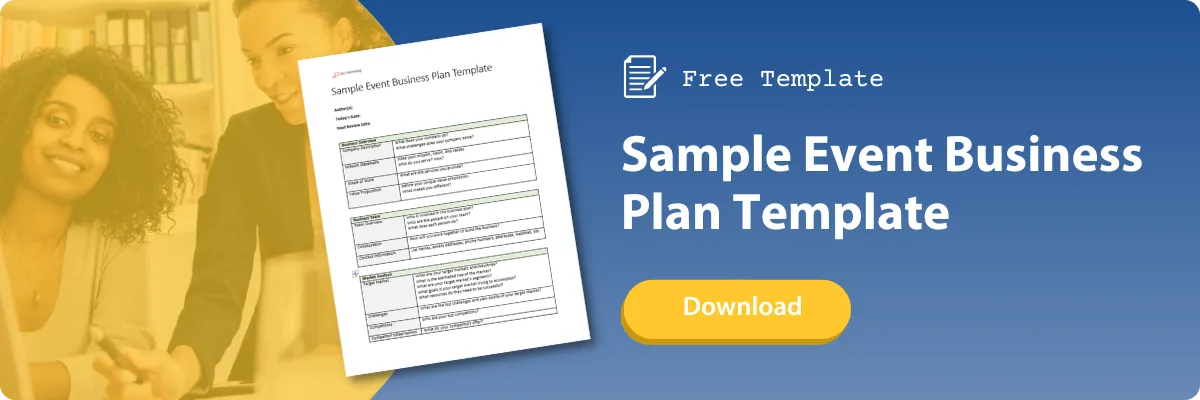
5. Determine event planning business costs.
There are several start-up costs to consider when opening your own event planning business. These things can add up, so make sure to set aside funds to ensure the following expenses are covered:
Remember to start small, then scale your business as you grow. Focus first on providing quality services for smaller events, then invest in yourself as you save money.
6. Set your price structure and fee basis.
Knowing how to price your event planning services is an essential part of being competitive in your field. Your pricing structure should be based on three things: Your location, experience level, and the types of events you plan:
- Location: Ensure your pricing will adequately cover your cost of living and expenses.
- Experience Level: Clients often pay more if you have event planning certifications and experience.
- Event Type: Some event types have higher fee structures than others.
Start by researching what your competitors charge to determine your rates. This will give you a basic understanding of how similar business price their services. Then, consider whether you will quote on a fee basis (I.e., a fixed charge for work) or a time-charge basis (I.e., an hourly rate for any work).
Some event planners offer set packages or have an introductory offer to entice clients. When working with a new client, make sure to get all the details regarding their project. This will empower you to calculate and provide a fair proposal. Don’t forget to seek out in-kind sponsorship , partners, and funding opportunities to offset event management costs.
7. Create an event planning portfolio.
If you want to earn more clients and book higher-budget events, make sure to build an event planning portfolio. Your portfolio can take the form of a website, a presentation, a physical display, or whatever makes sense for you. No matter what, show off who you are, what you do, and how you stand apart from competitors.
Start by compiling photos, videos, references, and testimonials from past events you’ve planned. This will help you market your services, attract potential clients, and highlight your strengths as an event planner.
As you book clients, continue to build your portfolio in the following ways:
- Create inspiration boards. Show off “collections” of your best work to inspire clients. Your gallery can be hosted on your website, on a social media site like Pinterest, or on a physical board to display in your office.
- Take ‘before’ and ‘after’ photos. Show how you transformed the space into a memorable experience.
- Collect client testimonials. Gather written recommendations or film short videos of client feedback. Be sure to have clients consent to having their words used in your marketing materials.
- Gather media coverage. If the press covers your event, include links or snippets of the results.
- Write a case study. How did you go above and beyond to help a client solve a problem? Work with a past client to put together a shareable case study that highlights the impact your business has.
Don’t forget to highlight your personal biography, professional headshot, and event planning certifications and designations . This will help you build credibility and rapport with stakeholders.
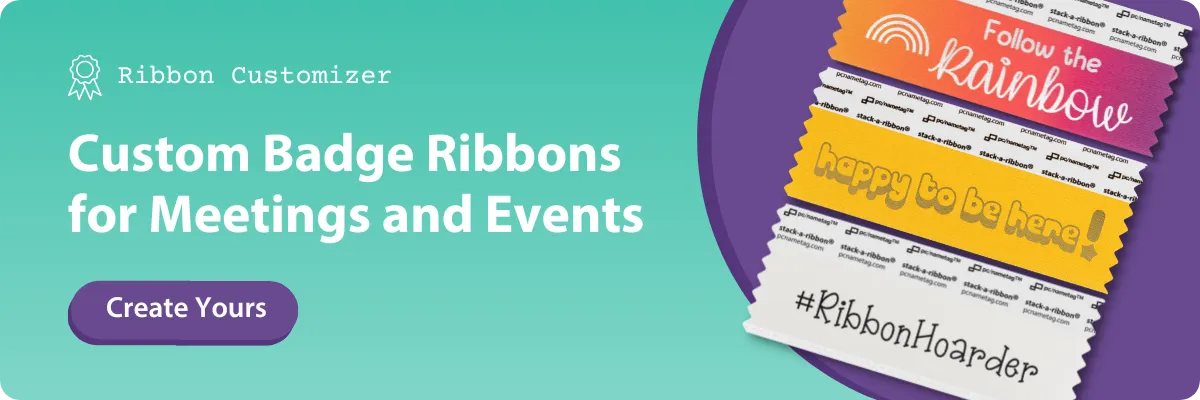
8. Design a company logo, brand identity, and website.
Every event planning business needs a unique brand identity. The “look” and “feel” of your brand are essential parts of building great relationships with clients and attracting new business. People that trust your brand and share your values will be more likely to choose you over the competition. Here’s how to get started.
- Design a logo. Create a company logo that reflects your mission and vision. Consider hiring a graphic designer to do so, or create your own with Canva , Logo , or Wix . Make sure it can be reproduced in a variety of places (I.e. on your website, business card, marketing materials, etc.)
- Develop brand guidelines. A brand guideline document details your company’s fonts, color palettes, and details on how and where your logo can be used. These elements combined create your overall identity and support your brand’s voice across all channels.
- Create a website. There are countless affordable website-building tools to help you get started without having web experience. Look into using sites like GoDaddy , SquareSpace , Wix , Weebly , or WordPress .
Your online presence can have a massive impact on your event planning business’s success. Many of your customers will visit your website and browse your social media pages before working with you. A high-quality logo, brand identity, and website will position you to generate more revenue in the long run.
9. Create social media accounts for your business.
Event planners know there are tons of social media platforms out there. Most people think of Twitter, Facebook, LinkedIn, YouTube, and Instagram as the primary channels to promote their brand, but today, there's also Snapchat, TikTok, Pinterest, Tumblr, Reddit, and others.
Do you need to be on every social media platform to stay relevant and grow your audience? The answer is no (whew!) Realistically, this wouldn’t be realistic or manageable. Instead, identify which platforms your target audiences use the most and nail those first to create a successful social media strategy.
TikTok, for instance, is a newer platform and one of the better ones for growing organically. This makes it a great tool for many organizations, especially those with a younger target audience in the "Gen Z" and "Millennial" age brackets. However, if the target audience consists primarily of people in their 50s and 60s, it may be worth your time to build up other platforms first before you start creating trendy TikTok videos.

10. Identify marketing and advertising opportunities.
Now that you know who your market is and what you plan on charging, do research on how you can advertise your business to that market. Look into different associations, publications, and influencers who you could partner with to get the word out about your business. You can also explore the content produced by these groups to learn more about the needs of your market.
Certain publications will have media packages available on their websites. Don’t forget to check so you can get an idea of what types of advertising they have available and how much each package costs.
11. Print event planner business cards.
Before LinkedIn and smartphones were popular, exchanging business cards was one of the best ways to exchange information with others. Your business card also showed off your unique “style” by using different fonts, color schemes, and paper textures.
While having business cards may seem old-fashioned, they’re still a great tool to keep in your event planning toolkit, especially since event planning by nature involved a lot of in-person networking. There are countless websites with great business card templates. A few of our favorites include Canva , Adobe Express , VistaPrint , and Avery .
Want to highlight your brand digitally? Try creating a custom email signature using HubSpot’s Email Signature Template Tool . Remember to include your social media details as well as traditional methods of contact.
12. Meet and network with fellow event professionals.
Never underestimate the power of business networking. Attending event planning conferences , building relationships, and talking with peers isn’t just fun; it’s also a great way to identify opportunities, learn best practices, and boost business. Build your event planning professional network in the following ways:
- Join an association. Find a full list of event industry associations here!
- Join a live group. Investigate your Chamber of Commerce or local association chapter.
- Join a virtual group. Find one about a professional topic you are interested in.
- Seek professional development opportunities. Start with these event planning resources.
- Perfect your “elevator pitch.” Practice talking about your business, its values, and its offerings.
- Post resources on social media. Show off your thought leadership, especially on LinkedIn.
Facebook and LinkedIn are filled with great support groups for event planners, including the National Meeting Planners Group . Remember, keep your posts educational in nature. Share your insights, connect and network, and share resources with others. Part of good business involves building trust with clients and industry peers alike.

13. Connect with event vendors and suppliers.
Whether you’re brand-new to the industry or a seasoned veteran, you need to develop a network of suppliers that you know and trust. From event badges to event diagramming, you’ll want to have all the go-to tools you need ready.
Make a list of venues, photographers, videographers, caterers, florists, décor rental businesses, entertainers, and hotels in your area with great reviews. Establishing connections with these companies will help you turn quotes around quickly in the future. Check out our list of Black-owned Event Businesses to help you get started on your list of trusted vendors!
Next, make a list of freelancers you can work with. Freelancers come in handy with larger projects that require more time and effort. They can also help bridge the gap when you’re busy, lack knowledge on a subject, or want to provide clients with additional value. For instance, you might outsource web design, copywriting, video production, administrative tasks, or legal contracts.
How do you find the best vendors, suppliers, and freelancers? Start by asking for personal referrals from peers. Then, investigate freelance marketplaces like Upwork , People Per Hour , Freelancer , and Guru . These sites will help you find temporary staff on a project-to-project basis.
14. Gain event planning experience.
It won’t come as a surprise that the more event planning experience you have, the more likely you’ll be to grow your base of loyal clients. Try to take on as many event planning opportunities as you can. These might be paid, unpaid, or an opportunity to shadow a more senior-level planner out in the field. Take note of things that worked, things that didn’t, and how you can make future adjustments to improve processes.
Next, identify any areas of expertise that require a stronger skillset. This list of online continuing education resources is a great place to start, especially if you’re brand new or know very little about a subject. You can also strengthen your knowledge by reading event planning blogs , listening to event planning podcasts , or following event industry influencers on social media.
Lastly, ensure you learn the basic workings of event planning software. Most seasoned event professionals understand how to use event management software, event registration software, email marketing platforms, social media platforms, survey tools, project management tools , and accounting programs.
15. Explore ways to get clients for your event planning business.
Despite what you may think, you don’t need to wait for clients to come to you to host events. If you have a great, financially viable idea, why not produce it yourself in your community? A great event experience is bound to attract the attention of potential clients and future event attendees.
Remember, finding new clients is a never-ending part of being an event planner. Get creative with attracting potential business in the following ways:
- Go live at your events. Leverage the live-streaming capabilities on your Facebook, Instagram, TikTok, or YouTube to showcase your event and garner excitement for your future events.
- Create share-worthy experiences. Encourage attendees to take photos at your event, post them on social media, and use a dedicated hashtag. Read our list of event entertainment ideas for inspiration.
- Secure press coverage. Invite your local newspaper to cover the event in exchange for free admittance.
- Partner with non-profits. Volunteer your services with a non-profit organization to help raise money, improve awareness, and gain valuable experience.
- Market your event. Read these event promotion ideas to attract more attendees to every gathering.
Once you start booking projects with clients, find ways to go above and beyond their expectations. Encourage your brand advocates to refer you to people they know. Remind clients to create a review of your services that you can display on your company website, LinkedIn, Facebook, and other public profiles.

Helpful Event Planning Resources from pc/nametag
Hello, planner! 👋 Have we met? If not, we’re pc/nametag, and we’re excited to meet you. If you’re like us, there’s nothing you love more than seeing an event come to life, and we’re here to help you transform your vision into reality. We are passionate about helping our customers create memorable experiences that bring people together.
Here are just a few of the many ways our team can help you reclaim time in your day, increase efficiency, boost return on investment, and improve attendee satisfaction:
Free Tools, Resources, and Insight:
tag/talk , our weekly blog that you’re currently reading, fuels curiosity by covering the latest industry trends, tips, tricks, stories, and advice you won’t want to miss. Plus, you’ll gain access to free ebooks, guides, checklists, cheat sheets, and more like the following sent straight to your inbox:
- The Event Planning Glossary
- The Ultimate Productivity Hack Toolkit
- 5 Strategies Every Project Manager Should Know
Same-day Shipping on In-stock Products:
Explore hundreds of in-stock event supplies , many of which ship the same day you order them. This way, you’ll always have a great selection of supplies on hand for your events.

Custom Badge Printing Services:
Save time and money with Name Badges to Go® , a pc/nametag-exclusive service that eliminates the need to prepare your own name badges for meetings, events, festivals and more. We’ll do the coordination, printing, assembly, organization, and packaging for you. Then, ship your order directly to you anywhere in the world.
Online Product Customization Tools:
We want you to have confidence in your purchase. From lanyards to badge ribbons, experiment with our online customization tools to see exactly how your product will look before you buy.
Need help with creating unforgettable event badges, lanyards, badge ribbons, branded gifts, and more? We’d love to help. From eco-friendly event supplies to premium quality badges , we have what you need to grow the success of your events.

Submit a Comment
Our commitment is to help you drive meaningful connections at meetings and events.
Our Products
- Badge Ribbons
- Promotional Products
- Signs & Displays
888.356.9329
124 Horizon Dr. Verona, WI 53593
How to Start an Event Planning Business: 8 Vital Steps

It may seem like everyone is running their own businesses these days. In fact, there are about 3.1 million entrepreneurs in the UK alone, making up 56% of businesses in the country.
If you’re looking to start your own event-organising business, you might not know where to start. There’s plenty to do, but following these eight steps will get you started on the right foot.
Ready to roll? Here’s how to make the leap into starting your own event-planning business.
1. Establish your event planning business
There’s no requirement for a certification or license to become an event planner in the UK. However, it’s still a good idea to establish a legal structure for your event management company, and you’ll likely need other certifications and licenses related to running an event planning business.
Why register your business
If you run your business as a sole trader under your name, you don’t need to register it. But you do need to register as self-employed and pay tax through Self Assessment. If you’re running your business under another name, you will need to register and include your name and business name on all official paperwork.
When you register your business, you get some great benefits that will help you get started. You get a Unique Taxpayer Reference, which will help you separate your business income when tax season comes around, and you also get to open business banking accounts.
Different business structures also give unique advantages, such as tax benefits and liability protection. But that depends on the type of business you establish.
Types of business
In the UK, there is a wide variety of business structures you can choose from. For this article, we’ll focus on the three most popular types of business for small event-planning business owners to establish.
Sole proprietorships
Sole proprietorships are simple to establish, and you pay taxes on your business via Self Assessment. However, being a sole proprietor doesn’t offer the tax advantages or liability protections of other business structures, as you’ll be responsible for the business’s debts.
Limited liability companies (LLCs, LTDs, and PLCs)
LLCs are a very common corporate legal entity for everyone, from small businesses to publicly traded companies. The most popular form of LLC in the UK is a private limited company (LTD). To establish your own limited liability company, you’ll need to register on Companies House, which costs around £40.
Public limited companies (PLCs) are also an option, but the business must have capital over £50,000 and shares must be available on the stock market. It also requires at least two directors and a company secretary.
LLCs offer their owners more protection than sole proprietorships if the business fails. If your LLC goes bankrupt, your personal assets can’t be liquidated to cover any debts the business may have.
Partnerships
A partnership is a great way to start a business with another person. You’ll need to file legal documents outlining the business entity with the state that say whether there’s one primary owner or an equal partnership.
In a partnership, you and your partner (or partners) personally share responsibility for the businesses. They make it easier for you to resolve any disputes that can come up and let you divide the business’s profits into your personal income. This helps sort out each of your taxes without getting into complicated corporate structures.
There’s also the option to set up a limited partnership or limited liability partnership (LLP), which offers more legal protection for you.
Licenses and certifications
While the UK doesn’t require you to get a license to become an event planner, there are some activities that you might do as an event organiser that have their own legal requirements. Here are some licenses and certifications that you might need:
Food hygiene certificate
If you’re preparing food that you’ll serve to others as a part of your event planning services, you’ll need a food hygiene certificate. This won’t be necessary if you hire the food services out to professional caterers, who are required to have their own certificates.
Alcohol license
Weddings, birthdays, corporate events, and many other events commonly serve alcohol. If you plan on serving alcohol at those events, you’ll need an alcohol license. This may be a premise license for a business that plans to sell alcohol on a permanent basis or a personal license for other situations.
To apply for the license, you’ll need to submit an application form to the local council along with a fee.
Music and entertainment licenses
Do you plan on holding public events with music? If you are, you’ll need to license that music with a license called “TheMusicLicense,” which you can get from PPL PRS . That license grants you the right to play music at your events.
You may also require an entertainment license for certain types of live entertainment at your events.
2. Find a niche
Look at what kinds of events people are running in your area. From there, you can find your target market .
For example, in London, production for private birthday parties, high-end events, and charitable events at large-scale venues might be a good fit. But if you’re in the countryside, wine tasting, sporting events, and fetes might be more appealing to your target audience.
Market research can sound intimidating, but it’s an important foundation for your company. To simplify this process, you can use Eventbrite’s marketing resources to help you make data-driven choices. If you want to start an event planning company that specialises in social events, check what social events are happening in your area, and ask current event planners what most of their business is.
Here are a few of the niches you could specialise in as an event planner:
- Corporate events
- Weddings and anniversaries
- Hen and stag parties
- Educational conferences
- Product launches
- Trade shows
- Music festivals
- Outdoor/sporting events
- Charity fundraisers
- Social gatherings
Any one of these could be a great fit for you. Consider the volume of business for each niche, your ability to run these types of events, your connection to people in related industries, and your desire to plan these events. All of these factors can help you decide if a particular niche is right for your event planning business .
Once you find the right niche, focus on it. Becoming an expert in that area will set you apart from the competition and make it easier to gain new clients. Spending time learning every aspect of your chosen specialisation will be invaluable when it comes to finding new events and planning them successfully.
You will also have a better understanding of the expectations, challenges, and opportunities that come with that particular type of event. By focusing on one niche, you can become an expert in your field, build a strong reputation for yourself, and create loyal relationships with clients.
3. Create your event planning business plan
Creating a business plan helps you get organised and attract partners, investors, and clients. It’s also a document that will serve as an important touchstone for you as you grow your business.
Future partners, investors, and clients will want to know that your business has a strategic vision for a path to growth and profitability. A good business plan will show them both that you have business management skills and that the company is on solid footing.
The plan will also be useful for you moving forward. It will be your guidebook on how to overcome the challenges that meet every business. Your business plan can help you manage your finances, marketing strategy, and the next steps to take as you grow.
If you’re thinking about how to start an event planning business, here are the core parts of a solid business plan:
- Table of contents
- Executive summary
- Background and history
- Development plan
- Marketing plan
- Budget and financial plan
- Client list
Two of the most important parts to get right in your own plan are the budget and potential client list. These sections will help you establish your company’s viability.
Budget
There are many small-business expenditures you might not be aware of, from taxes to insurance to licenses. Make sure you check out all the available budgeting resources , so you know what you’ll need to pay to run private events, including who you’ll need as a part of your team.
Knowing how much money you’ll need coming in will help you determine how much to charge for your services. It’ll also help you figure out how much you can afford to pay in startup costs.
Client list
The events industry is enormous, and there is definitely a place for your event planning business. The global events industry is projected to reach over £1.5 trillion in 2028 . But what clients can you actually count on? Make a list of potential clients, including local businesses, people you’ve worked with previously as an event manager, and dream accounts. Then, make a plan to approach them. Have contacts that already committed to working with you if you were to break out on your own? Make sure you list them here as well.
Once you have a business plan, you can take tactical steps to launch your event planning business.
4. Start marketing your business
Marketing is one of the most important parts of starting your own event-planning business. If you’re already an event manager, you’re very familiar with how important it is to market your events , and marketing your own business is just as key.
Make sure to build social media accounts early on so you’re ready to start distributing your marketing materials as soon as possible. You’ll also want to build your own website, make a company logo and a business name, and start telling your friends and family to help promote your business.
Friends and family can also help out as a sounding board for your marketing ideas. Use them as a focus group to test your ideas out with, especially if any belong to your target audience.
Your niche will likely determine how you market yourself. Be aware that people look for a specialist as their wedding planner, corporate event planner, or party planner. It’s not enough to just have a professional-looking website—you’ll need to model it to the needs of your business and the local market before you can start pitching event ideas .
5. Streamline your tasks
Any event organiser is familiar with juggling multiple tasks. But when you start your own event planning business, those tasks will multiply quickly.
Use technology to automate the tasks you can. Today, there are many apps for startups that can automate a surprisingly vast number of tasks. For instance:
- DocuSign can help you send and receive legal signatures on contracts and liability waivers.
- Email marketing programs like MailChimp allow you to schedule the sending of invitations, announcements, and promotions to your entire mailing list or target segments.
- Apps like Zapier let you get creative with linking up your various technologies and automating repetitive custom tasks.
- Finally, online ticketing platforms like Eventbrite help you create event pages quickly and make it easy for people to buy tickets to your events online. Integrations with discovery and distribution partners like Facebook and Spotify make it possible for people to find your events and buy tickets from other places on the web.

But even with the best tools on hand, there is some work you’ll want to do yourself. You’re a small business owner now, and that means taking on all of the accounting, sales, marketing, and operations for your company.
To handle each of these types of tasks, try devoting certain sections of your day to the different “departments” of your business. That way, you can be sure that each task gets your full attention and that you don’t leave anything by the wayside.
If you have your own home office, you can also hang a Kanban board to keep track of your ongoing projects. The visual nature of the boards makes them easy to manage and provides an overview of the entire project at once. By visually representing tasks and progress, Kanban boards help teams manage workflow, anticipate potential issues or bottlenecks, and ensure nothing is overlooked or forgotten.
6. Track your progress
If you’re using technology to automate tasks, sell tickets , and organise your business, that technology will collect data for you. And data is crucial to track your progress as a new business owner.
With every tool you use, carve out time to check your metrics so you can gauge how your planning is panning out. And go back to your business plan periodically to ensure you’re staying on track with your vision and hitting your goals.
The specific metrics you choose to track might depend on your business model.
For example, metrics like website traffic might matter more to you if you want to rely on inbound website visitors. On the other hand, if you’re making cold calls to potential clients, you might track those metrics in your customer relationship management (CRM) software .
Corporate clients often want consistent, real-time updates from you, especially with their large-scale events. It helps to have an established system so you can assure them that the event is on track. That’s why they ask event organisers to use tracking software like the Eventbrite Event Check-In App .
These are the types of metrics you can track, even if you’re just starting out:
- Client engagement
- Cost per event
- Number of events organised
- Website traffic and conversions
- Event attendance rates
- Ticket sales and profits earned.
Make sure to use data to make informed decisions as you grow and expand your business—it will save you time, energy, and money. These metrics will also come in handy when you pitch your business to more clients. You can cite these to prove you’ve run a similar successful event to the one you’re pitching and prove your value.
7. Time management
No matter how many tasks you automate and how organised you are, you’ll always have plenty on your to-do list. Managing time well is crucial for an event organiser dreaming about how to start an event planning business.
Meetings, for instance, are simultaneously one of the best ways to connect with people and a total drag on our time. While you’ll need to connect with clients regularly, you can make your meetings more efficient .
Create a solid agenda and stick to it, with just enough chit-chat to build a relationship with clients and vendors. As you build out your staff, resist the temptation to add unnecessary meetings to everyone’s calendar.
8. Manage the stress of starting an event planning business
Most importantly, throughout all of this, stay calm. Being an entrepreneur can be stressful. The more you can keep a cool head about you, the higher your chances of success.
Your own confidence and calm will also affect how your team, clients, and sponsors feel about you. Your team wants to be led with a steady hand, and your certainty about your projects will reflect on their ability to perform their own duties.
Similarly, your clients and sponsors want to feel like they’re in good hands. By working on your own calm, you’ll earn their trust and cooperation. The more you respond to questions and issues with appropriate, calm answers, the more they’ll trust you.

There are a few steps you can take to manage your stress levels:
Set realistic goals
Set realistic business goals to avoid frustration and burnout. This will help you remain focused, motivated, and moving forward, even if it is slow. You’ll be doing a lot of hard work, and you want to be able to measure your success after a big day.
Take time for self-care
As a business owner, it can be easy to neglect self-care. However, it is crucial to prioritise your well-being by eating well, getting enough sleep, and exercising. Make sure you have plenty of good things going on outside of work, and don’t let work be the first thing you think of when you take a break.
Connect with others
Connect with other event planners, business mentors, or support groups. Surrounding yourself with like-minded individuals can help you gain valuable insights and inspiration, as well as relieve stress. See if there are local events for your industry, and check in with your colleagues about how they maintain a healthy work-life balance.
Keep learning
Stay informed by attending conferences, webinars, and training sessions. Learning new skills and approaches can help you stay motivated, grow your business, and reduce stress. You can also take event planning classes to help you feel more confident in your skills, on top of your life experience.
Invest in your business
On top of education, you should also invest in your business. Make sure you have the office equipment you need, and feel free to hire staff to help run the business if you have the financial backing to afford it. Learning to trust others to help out is the most fundamental step in growing your business. If you’re working without the right tools, it can add significant stress to your day.
Start your event planning business off right
If you follow these steps, you’ll be ready to get a good start on your event planning business. Starting a business is a lot of work, but this way, you’ll have a structure you can use to succeed. The most successful event organisers use the best tools to make their jobs easier. So, when you’re ready to start selling tickets online and collecting payments from attendees , remember that Eventbrite has your back!
Ready to host your event?
- WAS THIS ARTICLE HELPFUL?
SPREAD THE WORD
about the author

Leigh Buttrey
Leigh Buttrey is dedicated to assisting event organizers in planning successful events, targeting the right audiences and expanding their businesses. Leigh is passionate about helping event organizers succeed. Living by the mantra, “Consistency over repetitiveness,” Leigh's approach ensures that every event is both unique and impactful. This philosophy drives Leigh's passion both personally and professionally.
You might also like these


1. Build a solid business plan
I can’t tell you how many small event planning businesses fail because the founder didn’t put together a business plan in advance.
Start by researching successful plans and businesses that are similar to your scope of work. Then reach out to others in the events industry who may be able to guide you!
Reach out to others in the events industry that may be able to guide you. Click To Tweet
Even if you’ve never seen a business plan, there are plenty of resources and templates online that can get you started. Additionally, when you look to grow your business, an up-to-date business plan is vital to secure any kind of investment.
Start with the right event tools for your business
Get Started Free
2. Set a marketing budget and use a PR company when possible.
When starting your party planning business, your marketing budget may be 30% or more of your business expenses. Does that seem like a lot? Think about all the things you’ll need:
- A website for your business
- Business cards
- Flyers and other printed info
- Digital marketing and online ads
- Expenses to travel to events for networking
Don’t leave anything out! You will need to spend money to make money, ultimately. The goal in the early months is to secure your base of customers as quickly as possible. If you deliver on the promise of creating memorable events, your clients will stick around and recommend you. As a result, your marketing costs will start to drop.

Here’s How to Start an Event Planning Business Click To Tweet
3. Clearly define your scope of work, mission and goals for your event business.
Your event planning business may evolve over time, but even when you’re just starting out, it’s important to clearly outline what you are and aren’t willing to do. You can even put this on your website to attract the right type of clients.
When you’re still building your business, saying “no” to clients is one of the hardest things to do. But it might save you from dealing with the kinds of customers that take up too much time and don’t offer enough value in return.
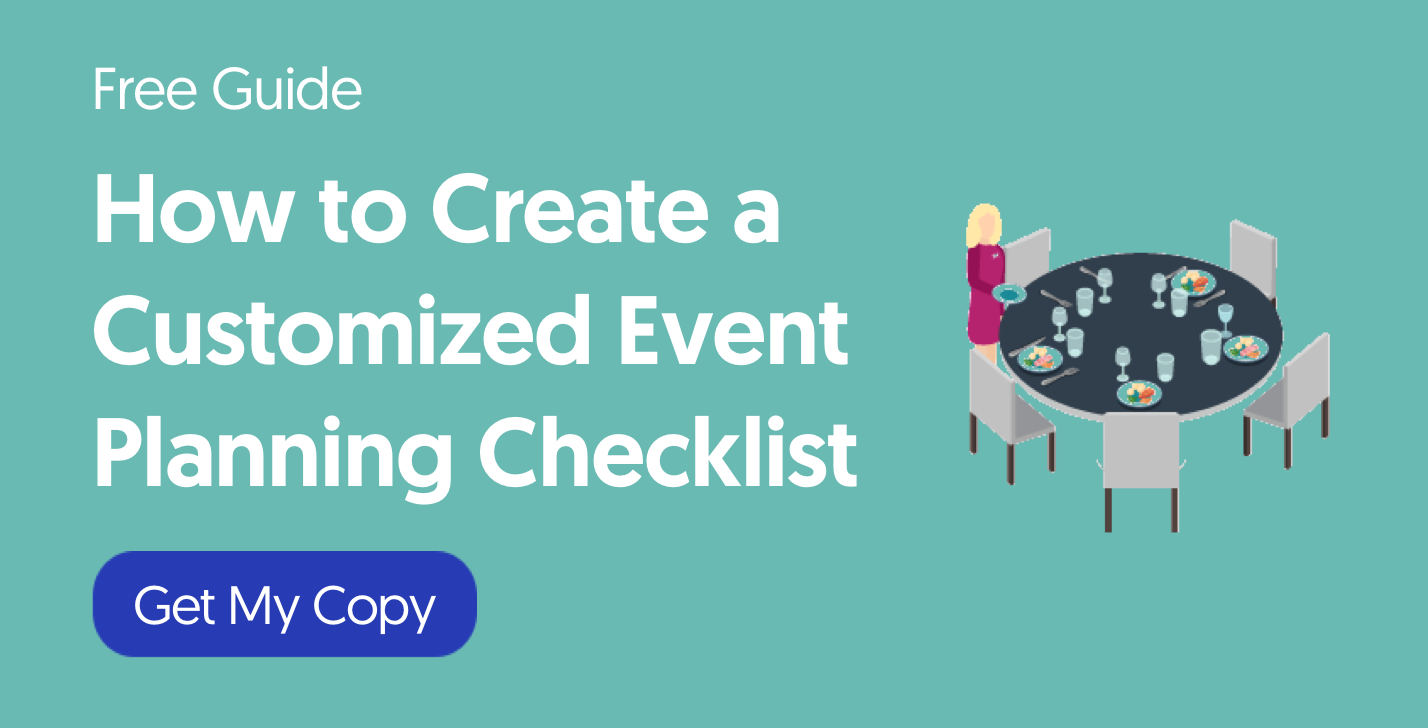
4. Have your elevator speech ready.
After I set up my first events business, I had a hard time selling it to people because my 30-second pitch wasn’t refined. Make sure to spend time developing this ” it is the key to introducing everyone to your business.
Pro tip: Don’t stress about the name of your event planning business. At the end of the day, the name of your business doesn’t matter ” as long as you produce truly memorable events. However, a catchy event business name idea might stick in someone’s brain better during an elevator pitch.
5. Do your market research
Before jumping, in I always tell people to understand their market and competitors. What is your unique value proposition? Are your fees similar to, better than or higher than others in your area? Understanding your competition and your clients will give you the leg up in this market. Don’t skip this step!

6. Spend some time learning tax laws and business filing in your area.
No matter what kind of business you want to start, there are lots of legal pieces to understand. I spent time researching which type of business would be best for me (LLC made the most sense for my consulting business).
It’s also critical to understand the tax implications before you dive in. For example, when I moved my business from Virginia to California, I had to go through the process of dissolving the business. I should have taken more time to research other possibilities!
There’s a lot to navigate, but some great resources exist for building small businesses. Here are a few I recommend:
- IRS.GOV “ Starting a Business
- SBA.GOV “ 10 Steps to Starting a Business
One of my favorite resources in Women In Events . New event planners can take advantage of our mentoring/coaching program after signing up.
Now You’re Ready to Start a Great Event Planning Business!
Have questions? We’ve got answers. Connect with @socialtables on Twitter.
Up next, here’s how to pick an event company name for your business . Or check out Social Tables free event planning tools to manage seating, meals, and so much more.
Try the event management software planners love
More tips for aspiring event planners.
- The 6 Must-Have Event Planning Skills You Need for Career Success
- The Top Event Planning Conferences This Year
- 10 Event Planning Tips Every Budding Coordinator Needs to Know
Still searching for answers about starting an event planning business?
Do your research, make a plan, set a budget, define your scope of work, and throw amazing events!
You should plan to set aside at least $15,000 to $25,000 to start a small event planning business.
Event planning can be quite a profitable career choice. The best event planners will make a name for themselves and be able to charge high prices for their vision, creativity, execution, and results.
- Free Planner Tools
- Event Seating Software
- Event Check-In Software
Venue Tools
- Event Diagramming Software
- Interactive Floor Plans
- Photo-Realistic 3D
- Lead Capture Tools
- Event Planning
- Guides & Webinars
- Customer Stories
- Contact Sales: +1 (877) 973-2863
- About Cvent
- Cvent Community
- Help & Support
- Training & Certification
- Status & Uptime
- Terms of Service
- Privacy Policy
- Your Privacy Choices
- +1 (877) 973-2863 - Option 1
- [email protected]

Copyright 2024 Cvent Inc. All rights reserved.

Get Going → Events & Entertainment
How to start an event planning business
February 17, 2022

Step 1: Understand the job requirements
Step 2: find your niche, step 3: write a business plan, step 4: market your business, step 5: get insurance, get the party started, subscribe to greenlight by thimble..
Join a community of 50,000+ small business owners and get insights and inspo every other week
Whether you’re coordinating and facilitating a wedding, a conference, a trade show, or a corporate fundraiser, event planning is a high-pressure, high-stakes job.
It takes a whole lot of creativity, energy, organization, and people skills to thrive in the event planning industry—but if you have those qualities, being an event planner can be a career to celebrate. Knowing how to start an event planning business is your first order of business.
You may have already coordinated events on a smaller or ad-hoc scale. That experience will help you as you move forward in this industry. But launching an official party planning business requires jumping through legal and logistical hoops.
Think you have what it takes to become a professional party planner? (We think you do.) Here’s how to start an event planning business in 5 steps.
If you’re brand-new to the official event-planning industry, it’s easy to think that the job is all glitz, champagne, and celebrations. While that’s the result of your careful planning, things are a lot less glamorous behind the curtain. For any event, there are about a thousand boxes you (the professional planner) have to check off to ensure that everything runs smoothly for the client and attendees.
Those tasks may include, but aren’t limited to:
- Creating an event design or theme
- Arranging entertainment
- Finding the venue
- Booking vendors
- Sending RSVPs and marketing information to attendees
- Balancing a budget
- Coordinating with staff and subcontractors
- Decorating the space
- Handling the catering and bar staff
- Supervising the event
There are about a thousand more boxes to check off within each one of these tasks. The Type A personality type is well-suited to this line of work. You need to be:
- Detail-oriented
- Extremely organized
- An ace problem solver
- Have excellent communication skills.
Beyond that, you need to be a savvy negotiator, understand how to manage a budget, and know how to market your services. Especially if you’re a wedding planner, you must have high emotional intelligence to put nervous brides, grooms, wedding parties, and other starring attendees at ease in the midst of high-pressure situations.
If you’re not yet sure that your heart is fully in starting an event planning business on your own, it’s a good idea to give the job a test run. First, consider working as a personal or production assistant for an event planning company or experienced party planner. That way, you can see if the job is a good fit before you strike out on your own and find your corner of the business.
Once you’re clear on what the job entails, nail down your niche. Although you may be tempted to advertise yourself to prospective clients as a jack-or jill-of-all-trades, that’s actually not the best marketing strategy. A general title makes it much harder to distinguish yourself in a crowded market. Offering one type of service that you do really well demonstrates your expertise.
There are four primary types of events: social, corporate, nonprofit, and association—each with its own specializations. For example, managing a fundraising gala and coordinating a wedding are both social events, but they’re uniquely different jobs with distinctive requirements, challenges, and demands.
Once you’ve decided on your event specialization, consider your services. If you’re a wedding planner, for instance, will you offer full-service planning leading up to the wedding, or will you also offer day-of coordinating? Will you offer pre-wedding services such as showers, bachelor/bachelorette parties, and honeymoon planning, as well?
Perhaps you’ll eventually be able to offer a full range of event planning services. But when you’re just starting, narrow it down so you can perfect your flagship service. (Hint: that’s all part of your business plan.)
Writing a business plan is the next step to start a party planning business. Your business plan is a detailed guide outlining your business structure, what it offers, how it operates, its long- and short-term goals, and some crucial financial information.
Your business plan will not only help your business grow and reach important milestones, it can also attract funding. 1
Every business plan is different. Some are highly detailed for presenting to investors, and others act more as “road maps” that help the business owner organize a plan of action. At the very least, your preliminary business plan should address the following:
- What services your business offers
- How your business sets itself apart from competitors
- Your target market
- Your mission statement
- How you plan to evolve your business over the next few years
- Your business structure
- Your business budget
- How much money you have on hand, and how much you need to launch
- Your funding sources
Luckily, there are tons of business plan tools and templates available. Start by checking out the SBA’s guide to writing a business plan, which includes sample business plans. 2
You also need to make your business official. Start by coming up with a business name and choosing a business entity. Next,register your business with your Secretary of State, Business Bureau, or Business Agency, and gather any funding you need to get your business off the ground.
After you register your business, you have to invite customers to your party.
As an event planner, you’re probably naturally gifted at networking, so now’s the time to use those skills. Word of mouth is one of the most effective marketing skills in this industry. Scour your network for potential leads and send out a mass email to your contacts announcing your business. Ask happy customers to spread the word to their friends, family, colleagues, and social media followers.
With the vast majority of consumers conducting their browsing, socializing, shopping, and pretty much everything else online, having a website for your small business is non-negotiable.
Fortunately, there are website platforms that allow you to bundle a domain name and hosting services and create a website in just minutes. For this step, remember to take the following actions:
- Build your blog to improve search results
- Utilize SEO best practices throughout the site
- Design a site that’s visually appealing, clearly states what you do, and is tailored to your target audience
- Make the site easy and intuitive to navigate
- Be sure to include your contact information, links to your social media accounts, and a portfolio of your work
If you haven’t already done so, now’s the time to create social media accounts dedicated to your business. Instagram and Twitter are mainstays. But as your line of work is aesthetically driven, a Pinterest account can also be a great way to showcase your work and inspiration.
Big groups of people gathering together is inherently risky. A liability claim filed against your business could ground your event planning business before it even launches.
General liability insurance can cover you for liabilities like non-employee third-party bodily injury, third-party property damage, personal and advertising injury. It provides the investigation of a claim and even the defense of such claim if a client takes your business to court.
Thimble’s Event Insurance is the easiest and most flexible way to protect your business. You can choose a policy that covers you by the hour, day, month, or year, so you’ll only pay when you’re actually working an event.
Along with general liability coverage, Event Insurance offers the option to add liquor liability coverage , which provides coverage for legal fees and damages incurred because damage or injury caused by a third party as a result of alcohol consumption at your BYOB or open-bar event.
To get your quote, just download the Thimble mobile app or click “Get a Quote,” enter a few details about your business. When you purchase, you’ll receive your policy and as many certificate of liability insurance as you need via the Thimble app and email.
Now, you can run your business with the peace of mind you absolutely need to track down that missing vegetarian meal for the groom’s sister at Table One.
Before you bust out the bubbly, let’s quickly recap the five crucial steps to becoming a professional party planner:
- Understand the job’s extensive requirements. Ideally, work as an assistant to a party planner, or organize small-scale parties to gain hands-on experience.
- Pinpoint what types of events you’ll plan, and any other additional services you’ll offer clients.
- Write a business plan and follow through with foundational requirements, like registering your business and gathering funding.
- Network, create a website and social media accounts, and do whatever it takes to land your first client.
- Protect your business by purchasing general liability insurance.
As you go about launching your company, remember that success takes time. Stick to your business plan, work on building a clientele, create connections in the industry, and take calculated risks. Do that, and your parties will soon be the talk of the town.
- U.S. Small Business Administration. 5 Reasons You Need a Business Plan.
- SBA. Write Your Business Plan.
Our editorial content is intended for informational purposes only and is not written by a licensed insurance agent. Terms and conditions for rate and coverage may vary by class of business and state.
Related Articles
Get greenlight in your inbox..
It's not every other newsletter. It's every other week, four minutes long, and just for small businesses.

Quick-thinking insurance for fast-moving businesses.
Backed by A-rated Insurance i
Best Insurance for the Smallest Businesses
Accredited Business
What do you do?

Business , Education , General Tips , Your Event Career
How to Start An Event Planning Business From Scratch
Starting a new business in event planning can be a very profitable venture . However, it takes a lot of hard work and dedication to get started. In this blog post, we’ll teach you how to start an event planning business from scratch in 6 easy steps!
We’ll also provide tips on how to market your new company, advice on what services to offer your clients, the type of training you should get, and more. So, if you’re ready to start planning some amazing events, keep reading!
Frequently Asked Questions:
How much does it cost to start an event planning business.
First thing’s first: you need to have an idea of the money required to build an event planning business. The cost of starting your business can vary, depending on a number of factors – such as the size of your company and the services you want to offer. However, in general, you’ll need to invest in some basic start-up costs, such as:
- A computer and/or laptop
- Telephone line and headset
- Business cards
- Business website
In a recent article published on Shopify’s blog, it was stated that in an entrepreneur’s first year of business, they’re likely to spend an average of approximately $40,000. Keep in mind that many of Shopify’s customers are business owners selling and shipping physical products from an online store. So, some of the data within this article may not necessarily apply to an event planning business owner. Still, the data within this blog post is definitely worth the read!
Additionally, you may also want to consider purchasing software that can help streamline your event planning process, such as wedding or event management software. How much you end up spending on start-up costs will largely depend on your specific needs and budget.

What Does an Event-Planning Entrepreneur Do Day-to-Day?
The next question to consider is: what does an event-planning entrepreneur typically do on a daily basis? How many hours will you be working each week? Will you have enough work to pursue this endeavor full-time?
The answers to these questions depend on a lot of things. (Although we can say that the answer to that last question is a resounding YES!)
In general, an event planner is responsible for the organization and execution of a wide variety of events. This may include everything from weddings and corporate functions, to birthday parties and charity galas. An event planner will typically work with clients to get a clear understanding of their vision and budget, then develop a plan of action that meets both requirements.
Moreover, they’ll also be responsible for overseeing all aspects of the event on the day-of, from coordinating vendors to ensuring that everything runs smoothly.
It’s important to note that the job duties of an event planner can vary, depending on their level of experience and specialty. For example, if you’re just starting out in this industry, you may only have limited experience working with specific types of events. In this case, you might want to focus your business on providing services such as event planning consultation, venue scouting, or contract negotiation. As you gain more experience, you can then expand your services to include things like catering coordination, decor design, and even budget management.
For even more information on this particular subject, check out our blog article all about a day in the life of a wedding planner !
How can i start an event planning business with no experience.
Starting an event planning business with no experience can be a daunting task, but it’s not impossible! In fact, many successful entrepreneurs got their start in the event planning industry by starting small and gradually building their business over time.
One way to gain experience in the field is to volunteer your time at local events. This will allow you to learn about different types of events, as well as the logistics involved in putting together a successful event. You can also network with other professionals in the industry, attend workshops and webinars, and/or read books and articles on event planning.
Another option is to take online courses that specialize in event planning . These courses will teach you everything from how to plan corporate events, to wedding etiquette, to event decoration. They can also help you get started by providing tips on marketing strategies and business management. Furthermore, completing an accredited online course will also arm you with a reputable certification to add to your resume!
We’ll delve deeper into the type of online event planning training you should get a little later on in this article…

How Much Should I Charge for Event Planning Services?
There are many factors that go into pricing your event planning services. Some of the questions we recommend asking yourself include (but aren’t limited to):
- How long have you been in business?
- What are your qualifications as an event planner?
- How much in-field experience do you currently have?
- How many clients do you have at the moment?
- What type of events will you be working with (i.e. weddings, private parties, corporate functions, etc.)?
- Are you planning to launch your business with a team, or solo?
- If the former, how experienced are your staff members/team members when it comes to planning events?
- Do you specialize in any sought-after niches, or intend to?
- How much time does each client take up per month or year?
- How profitable is this particular industry within your region/niche market space right now?
Once these questions have answered, then you can better determine how much money it would cost you to run your company over a set period of time, such as the first year, years 2-5, and beyond. This article by The Balance Small Business provides further information on the topic of pricing your services. So, we recommend giving it a read!
What Type(s) of Services Do I Want to Offer My Clients?
When starting an event planning business, it’s important to decide which services you want to offer your clients. For example, will you be specializing in weddings? Corporate events? Social events?
You don’t have to limit yourself to one area! In fact, many event planners offer a variety of services, such as wedding coordination, theme design, catering management, and more. Either way, it’s important to choose the services that you’re comfortable with and that you know you can deliver on successfully.
Here are just some of the services you can offer your customers:
- Private event planning
- Wedding planning
- Destination wedding planning
- Luxury wedding and/or event planning
- Event decor
- Floral design
- Virtual event and/or wedding planning
- Corporate event planning
- Promotional event planning
- Travel and tourism services
- Festival and live event planning
Fun Fact: Did you know that QC Event School offers internationally-recognized training in ALL of the above events services? It’s true! Learn about our full list of self-paced, online courses here !

Alright, now that we have some of the most popular FAQs answered, let’s jump into the 6 steps involved in building an event planning business from scratch!
Step One: Get Trained and Certified as an Event Planner!
First thing’s first, you’re going to need training in this industry. Although technically, event planning isn’t a regulated industry, this does NOT mean you won’t be much better off with proper training under your belt. In fact, we’d even argue that getting professionally certified is the single BEST way to become an event planner and achieve success!
When it comes to obtaining a solid event planning education, there’s no better option than to enroll in an accredited, internationally-recognized school! QC Event School, for instance, offers a variety of courses in multiple different areas of professional planning.
The best part? All of our programs can be completed at your own pace and right from the comfort of home!
Plus, our courses aren’t only geared towards those already working within the industry, who are looking to upskill or add additional services to their company. They’ve also been carefully designed for entrepreneurs who want to start their own business, too. In fact, this is why all of our courses offer an entire unit specifically dedicated to business training.
This means that regardless of your skill level or past experience, you’ll absolutely benefit from the knowledge and expertise offered in QC’s wedding and event planning courses! And once you’ve completed our course(s), you’ll receive an internationally-recognized certification that’ll demonstrate your skills and knowledge as an event planner!
How awesome is that? Talk about taking your resume to the next level!
Step Two: Figure Out What You Want Your Business to Look Like!
Alright, so now that you’ve got your education under your belt, it’s time to start thinking about what you want your business to look like. How will you structure it? How much money are you willing to invest in getting it started up and running smoothly (as well as how long)? Do you eventually want to hire on fellow team members/staff, etc.?
Now is also a great time for some self-reflection! Ask yourself:
- What kind of events am I really interested in planning and coordinating (i.e., weddings, corporate events, social parties etc.)?
- How flexible am I when it comes to working evenings and weekends during event season(s)?
- Do I have enough money saved up to get this business started and support myself while I’m in the beginning stages?
- How much money do I need/want to make?
- How many hours am I willing to work per week, month, or year?
- What are my short-term and long-term goals for the business (i.e., what do you want it to look like a few years down the road)?

Your Business Name and Brand
You’ll also want to start thinking up some ideas for your company name! This can be fun AND stressful all at once, so don’t sweat it too much if you’re struggling with how to come up with one. If all else fails, try using an online business name generator. There are lots of great ones out there that can really help jump start the process!
(And once you’ve chosen your business name, don’t forget to get it legally registered. That way, no one else can swoop in and take it from you!)
Lastly, you’ll also want to figure out what you want your brand to be . What do you want your business to look like? How do you want people to perceive it? What kind of vibe(s) are you going for (i.e., fun, elegant, modern etc.)?
Do some research and figure out what would work well with the audience(s) that you’ll be working with! The key is to find something that you feel comfortable with and will allow you to stand out from the crowd.
Step Three: Come Up With a Plan for Your Event Planning Business!
Now that you’ve got your education under your belt, have decided what kind of business you want to start up, AND figured out how it’ll be branded, it’s time for step three! This is where you put your business plan together.
A good business plan will help to outline all the important details about your company. It will include what services you’ll offer, how you’ll market yourselves, what your expenses and revenue will be, as well as who your target audience is. This document can also serve as a roadmap for your business; helping you figure out what your next steps should be as you go forward.
It’s also important to note that banks and other financial institutions often require a business plan from anyone looking to take out a loan for their business. So, think of it as the blueprints for your company!
If you’re having trouble putting together your own, there are lots of great resources online (like this one ) that can help you out.
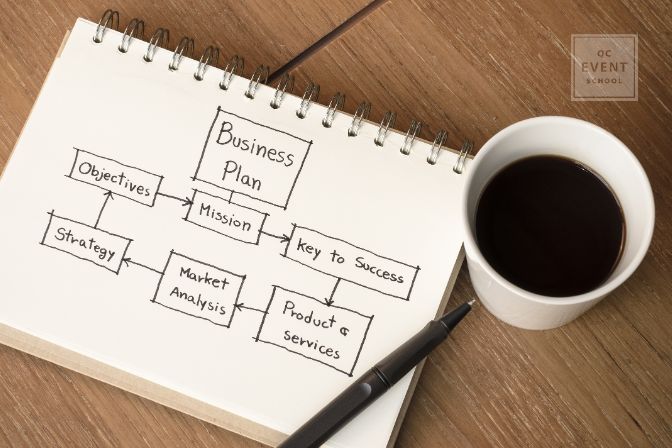
Step Four: Build Your Event Planning Business Website and Social Media Presence!
Once your business plan is complete, it’s time to start building your website and social media presence! This is where you’ll be able to showcase all of your amazing work, as well as give potential clients a little taste of what they can expect from you.
If you’ve never built a professional website before, or run social media channels for a business, we’ve got some great tips in our blog article, “ How to Get Clients as an Event Planner “, to help you get started!
Just remember that the key here is to make sure your website and social media accounts are up-to-date and reflect the brand that you’ve been working so hard on in step three.
Step Five: Establish How You’ll Get Clients and Market Your Event Planning Business!
From here, it’s time to think about how you’ll actually get customers. How will people know that you’re an event planner – and even more importantly, that they should hire YOU for their next big shindig? Furthermore, what kind of marketing materials will you need to create (e.g., a website, business cards, online ad marketing, social media profiles, etc.)? How often will you need to update these items?
One great way to kick off this step is by creating a list of potential referral partners or affiliates. Do some research and compile a list of wedding venues, catering companies, florists, photographers, and other event service providers in your area that might be interested in working together. You can also meet with these businesses in-person to discuss how you can help each other out!
Online marketing will also be your best friend when it comes to getting your business seen. After all, that’s the point of a website and social media presence!
Establishing a budget for your marketing efforts is always a smart idea. Start this by asking yourself how often you’ll be able to put money towards advertising. Then figure out the answers to these additional questions:
- How much do you have available each month or quarter?
- How can this amount help get people interested in what you’re offering?
- What do you know about SEO (Search Engine Optimization)? Are you willing to learn about it and put in regular efforts to maintain high-ranking SEO for your company?
- What sort of online marketing are you interested in utilizing? (E.g. paid ads on Google and/or social media, email campaigns, monthly newsletters, etc.)
You might even want to consider a marketing budget at the start of each new year so you have time to plan ahead!

Step Six: Start Networking and Getting Real-World Experience as an Event Planner!
Last but certainly not least, it’s time to start networking and getting hands-on experience. This can be done in a variety of ways, such as:
- Attending industry events and meetups.
- Participating in online forums or communities related to event planning.
- Volunteering your time with local charities or non-profit organizations that host events.
- Offering free consultations to friends or family who are having a party or event soon.
- Collaborating with other industry experts in your area on a stylized photoshoot , etc.
The more you put yourself out there, the more people will know about your business – and the better your chances of landing some great clients! And don’t forget to network with other event/wedding planners in your area as well. Although they’re technically you’re “competition”, the fact is, there’s always room for more than one planner in the events industry.
If anything, you’ll quickly come to realize that your fellow planners will actually make for some of the greatest friends and allies as you navigate life as an event planning business owner!
In Conclusion…
We hope this article has been helpful in outlining the steps you need to take when starting an event planning business from scratch. Just remember to be patient, do your research, and have fun. After all, Rome wasn’t built in a day… and neither will your business be!
But so long as you follow these 6 steps, you’ll be seeing success in no time. Thanks for reading!
Ready to start an event planning company from the comfort of home? Enroll with QC Event School today , and learn everything you need to know to achieve this goal in as little as 3-6 months!
Leave a reply cancel reply.
Your email address will not be published. Required fields are marked *
Save my name, email, and website in this browser for the next time I comment.
Featured Posts
Qc event school graduate spotlight: ayla otto, meet qc event school graduate, carisa lockery, industry spotlight: mwai yeboah.
- Documentation
- Contact Support
How to Start an Event Planning Business? The Complete Guide
January 4, 2024
Event Resources , For Event Managers
Reading time
Explore topics
Exciting News: Announcing Amelia’s Partnership with SuperbThemes
Virtual Event Best Practices in 2024 for Succesful Execution
11 Best EventOn Alternatives in 2024 + In-Depth Reviews
Cancellation Email Templates for Service Business Owners
How to Restore WordPress from Backup: Step-By-Step Guide
Limited time offer
Effortless Appointment & Event Booking
Save 40% on WordPress Booking Plugin
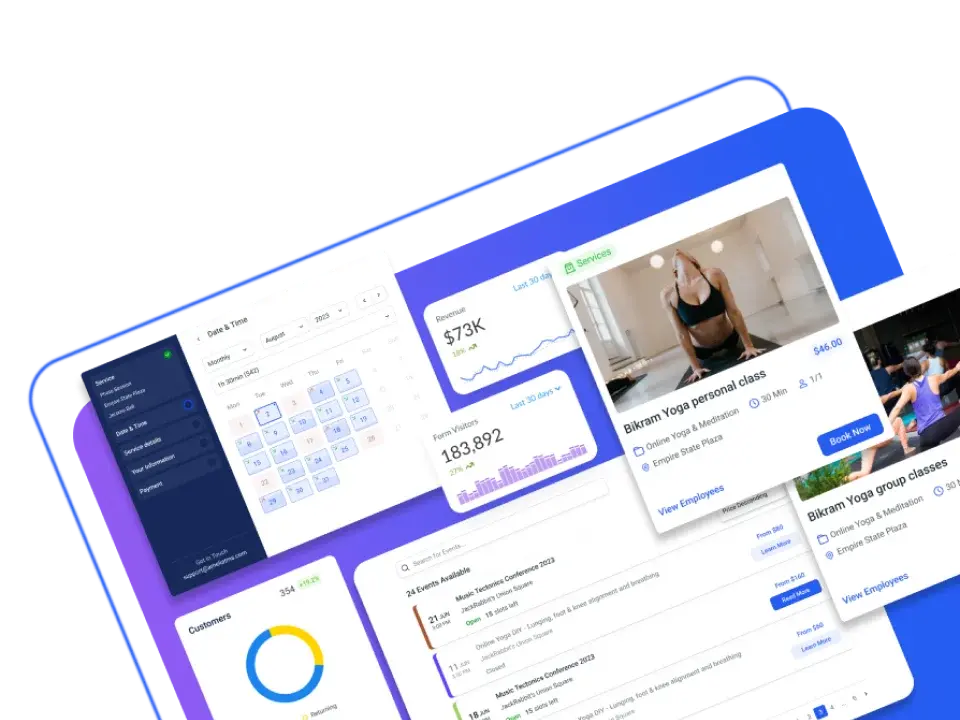
Read Inspiring Customer Stories
Check out how our user set Amelia for his business
Are you passionate about creating memorable experiences and have an eye for detail? Starting your own event planning business could be the perfect venture for you. Launching an event planning business is an exciting decision, but remember that cutting through the clutter and connecting with your target audience is crucial.
Often, generic advice falls short of addressing the real challenges you as an aspiring event planner face. In this guide, we’ll explore a proven framework to kickstart your event management business successfully.
But let’s start with the basics and slowly build up your journey to teach you how to start an event management business.
What is an Event Management Business?
An event management business involves the planning, organizing, and execution of various events, ranging from weddings and corporate conferences to festivals and private parties. Event planners play a crucial role in ensuring that these occasions run smoothly, leaving a lasting impression on clients and attendees alike.
The Benefits of Starting an Event Management Business in 2024
As we step into 2024, the events industry is witnessing a resurgence with a growing demand for unique and personalized experiences. Here are some compelling reasons to consider starting your event planning business this year:
- The events industry is rebounding, with an increasing number of people eager to celebrate milestones and create memorable moments.
- Diverse events, from virtual experiences to in-person gatherings, offer a wide range of opportunities.
- Clients are seeking innovative and personalized event experiences, providing a platform for creative entrepreneurs to shine.
- The demand for unique themes, decor, and entertainment options is on the rise.
- Event planning allows for flexible working hours, making it an attractive option for those seeking work-life balance.
- Independence in decision-making and the ability to choose clients and projects.
How to Start an Event Management Business in 13 Steps
- Understand the event management market
- Assess and improve your event planning skills
- Market research and event planning business market fit
- Starting an event management business & choosing your niche
- Business structures to consider when starting event planning business
- Creating irresistible event planning solution
- Writing an event planning business plan
- Initial and ongoing expenses for event management business
- Figure out the booking process for your event planning business
- Set up prices with a healthy profit margin
- Promoting your event management business
- Selling your event planning services
- Growing and scaling your event planning business
Understand the Event Management Market
To truly understand the event planning market, you must immerse yourself in its dynamics. This involves staying informed about the latest trends, emerging technologies, and shifts in consumer behavior. Analyze how global and local events impact the industry, keeping an eye on event statistics and other crucial data.
Let’s see some examples of market dynamics when it comes to event planning business:
- Rise of Virtual Events
With the increasing prevalence of virtual experiences, understanding how to integrate technology into traditional event planning is crucial.
- Sustainability Trends
The growing emphasis on eco-friendly events requires an awareness of sustainable practices in event management.
Events planning challenges
Every industry has its challenges, and event management is no exception. Acknowledging these challenges is the first step in overcoming them. Challenges may include budget constraints, unexpected logistical issues, or dealing with unforeseen changes in event requirements. Anticipating and planning for these challenges will set you apart as a prepared and resilient event planner.
Trends come and go, and it’s on you to make the most out of them. Whether it’s incorporating experiential marketing, interactive elements, or thematic designs, trends influence client expectations. By understanding and leveraging these trends, you position yourself as a forward-thinking and creative event planner.
Putting insights into action
Identifying the untapped potential within the market is where strategic planning comes into play. Consider the demographics of your geographical area, the types of events in demand, and the gaps in services offered by competitors. Conduct surveys, engage in networking, and seek feedback to uncover opportunities for growth.
Assess and Improve Your Event Planning Skills
Before you start chasing new shiny ideas and dive into external avenues for skill enhancement, begin with a thorough self-assessment. Reflect on your past events, identifying both strengths and areas for improvement. Consider seeking feedback from clients, vendors, or colleagues to gain valuable insights into your performance.
Enhancing your event planning skills
Formal education and structured learning play a pivotal role in skill enhancement. What can you do to enhance your event management skills ? Explore workshops, seminars, and online courses that cover various aspects of event planning. These educational opportunities can provide in-depth knowledge, from event design principles to the latest in event technology.
Another great strategy is connecting with seasoned professionals in the event planning industry who can offer invaluable mentorship. A mentor can provide guidance based on their experiences, share industry insights, and offer constructive feedback. Consider joining mentorship programs or networking events to establish mentor-mentee relationships.
While theoretical knowledge is essential, hands-on experience remains unparalleled in its ability to hone event planning skills. Actively seek opportunities to work on a diverse range of events, from weddings to corporate conferences. Practical experience not only solidifies your skills but also builds confidence in managing various event scenarios.
In 2024, proficiency in event management tools and software is a valuable skill. Familiarize yourself with event planning software, project management tools, and virtual event platforms. Technological literacy enhances efficiency in tasks ranging from guest list management to creating immersive virtual experiences.
Market Research and Event Planning Business Market Fit
Begin your market research by gaining a comprehensive understanding of the current state of the event planning industry. Analyze market trends, identify key players, and assess the demand for various types of events. Consider factors such as geographic location, demographics, and socio-economic trends that might influence the market dynamics.
What can you do?
- Explore reports from event industry associations and market research firms for a macro view of trends.
- Study the strategies, strengths, and weaknesses of established event-planning businesses.

Image by vector4stock on Freepik
The next step is to narrow down your focus by clearly defining your target audience. Consider demographic factors such as age, income level, and interests. Understanding your audience allows you to tailor your services to meet their specific needs and preferences. It’s not a one-size-fits-all approach; different demographics have distinct preferences and expectations. Conduct market research to create detailed buyer personas, encompassing factors like age, interests, and spending capacity.
Crafting buyer personas for event planning business
- Develop detailed profiles of your ideal clients.
- Consider factors like their event goals, preferred communication channels, and budget constraints.
Beyond demographics, explore the specific preferences of your target audience. Whether it’s the aesthetic choices for a wedding or the interactive elements for a corporate conference, aligning your services with what resonates with your clients ensures a more personalized and satisfying event experience.
You also need to dive deep into the needs and pain points of your potential clients. What challenges do they face when planning events, and what solutions are currently lacking in the market? By identifying these pain points, you can tailor your services to address specific gaps in the industry.
Crafting your Unique Selling Proposition (USP)
Once you’ve identified all these aspects, it’s time to craft your unique selling proposition. Armed with insights from your market research , articulate a unique value proposition that sets your event planning business apart. Your value proposition should communicate the specific benefits and advantages clients gain by choosing your services over competitors.
Let’s see the key components of a value proposition for an event planning business:
- Highlight any specialized skills, certifications, or expertise that distinguish your business.
- Emphasize unique solutions or approaches that address specific market needs.
- Communicate a commitment to exceptional customer service and personalized experiences.
Is there something else you can do? Well, of course!
Analyze competitor strategies
Evaluate the strategies employed by competitors to gain insights into how competitive the event planning industry is. Identify areas where competitors may be falling short or where you can differentiate your business. This analysis informs your positioning within the market. This leads us to the next step you should take when starting an event planning business:
Complete SWOT analysis
Conducting a SWOT analysis—a comprehensive examination of your business’s internal and external factors—provides a roadmap for making informed decisions and optimizing your chances of success.
Identify the internal factors that give your event planning business a competitive edge. These are the attributes and capabilities that set you apart and contribute to your success in the market.
- Expertise and Skills
Highlight any specialized event planning skills or certifications you possess.
Emphasize your creative approach to designing and executing events.
- Industry Connections
Showcase relationships with reliable vendors, venues, and other industry professionals.
- Technology Adoption
If you leverage event planning software or technology, consider it a strength.
Examine the internal factors that may pose challenges or limitations to your event planning business. Recognizing and addressing weaknesses is crucial for sustainable growth.
- Limited Experience
If you’re new to event planning, acknowledge the learning curve and outline plans for skill enhancement.
- Resource Constraints
Lack of financial resources, staff, or equipment may be a weakness.
- Niche Limitations
If your expertise is limited to specific event types, address plans for diversification.
Opportunities
Explore external factors in the market that can be advantageous for your event planning business. These are areas where your business can grow and thrive.
- Growing Demand
Identify emerging trends or increasing demand for certain types of events.
- Collaborations
Explore opportunities to collaborate with other businesses or professionals in the events industry.
- Technological Advancements
Leverage new event planning tools or technology trends to enhance your services.
- Market Gaps
Identify gaps in the market that your business can fill.
Evaluate external factors that could potentially pose challenges or threats to your event planning business. Being aware of these threats allows you to proactively mitigate risks.
- Economic Downturn
Economic challenges may impact clients’ budgets for events.
- Intense Competition
A saturated market with numerous competitors may pose a threat.
- Changing Regulations
Stay informed about any legal or regulatory changes affecting the events industry.
- Seasonal Fluctuations
If your business is impacted by seasonal demand, plan for potential idle periods.
Starting an Event Management Business & Choosing Your Niche
Starting your event management business is scary, but exciting. Choosing your niche is crucial. You can always pivot to another niche, but getting it right on the first try will give you the headstart you need for successfully starting your event planning business.
Defining your niche is like setting the stage for your business, allowing you to tailor your services to meet the unique demands of a specific market segment. Here’s a guide on how to navigate this crucial aspect of launching your event management business.
- The first step in choosing your niche is to identify the type of events that genuinely excite and inspire you. Whether it’s the romance of weddings, the sophistication of corporate gatherings, or the vibrant energy of social events, aligning your business with your passion sets the foundation for long-term success.
- While passion is paramount, it’s essential to evaluate the market demand for your chosen niche. Research the local and global trends to understand the current and future needs of potential clients. A niche with a growing demand ensures a steady stream of opportunities for your business.
- Evaluate your skills, expertise, and previous experiences in event planning. Your professional background and knowledge can influence the type of events you’re well-equipped to handle. Leverage your strengths to carve a niche that showcases your unique capabilities.
- Analyze the level of competition in different event planning niches. While a saturated market may present challenges, it also indicates a viable demand. Assessing the competitive landscape helps you identify gaps or opportunities for differentiation.
- Once you’ve chosen your niche, tailor your services to cater specifically to the needs and preferences of that market segment. This involves customizing your approach, packages, and offerings to align with the unique requirements of the events within your chosen niche.
- Craft a brand identity that resonates with your chosen niche. This includes developing a compelling brand story, creating a visually appealing brand image, and adopting a tone of voice that connects with your target audience.
Business Structures to Consider When Starting an Event Planning Business
When starting an event planning business, the crucial decision you’ll need to make is determining the legal structure of your venture. The choice of business structure significantly impacts various aspects, including taxation, liability, and the overall management of your business. But what options do you have?
Sole Proprietorship
A sole proprietorship is the simplest and most common form of business structure. In this setup, you are the sole owner and operator of the event planning business. It’s an ideal choice for solo entrepreneurs or small businesses with minimal anticipated risks.
Limited Liability Company (LLC)
An LLC combines elements of both a sole proprietorship and a corporation. It provides a degree of personal liability protection while maintaining simplicity in terms of operation. LLCs are a popular choice for small to medium-sized event-planning businesses.
Partnership
A partnership involves two or more individuals sharing ownership and responsibilities. There are two primary types: general partnerships (equal sharing of responsibilities and liabilities) and limited partnerships (one general partner with unlimited liability and limited partners with liability restricted to their investment).
Corporation
A corporation is a separate legal entity from its owners. It is owned by shareholders, managed by a board of directors, and operated by officers. Corporations are suitable for businesses with significant growth ambitions.
Creating an Irresistible Event Planning Solution
Before you start an event planning business you need to understand that the key to success lies in offering a solution that not only meets but exceeds the expectations of your target audience. Consider the following aspects and thoroughly go through them to create an irresistible event-planning solution for your clients:
- Your event planning solution should not only meet industry standards but surpass them. Clearly articulate and showcase what sets your services apart from competitors. Whether it’s a signature planning process, exclusive vendor partnerships, or a track record of delivering extraordinary experiences, emphasize these unique selling propositions in your marketing materials.
- Leveraging technology can elevate your event planning solution. From online event management platforms and event management plugins to virtual planning tools and social media integration for real-time updates, embracing technology enhances both the planning process and the overall event experience.
- Clear and effective communication is the backbone of successful event planning. Ensure that your solution includes robust communication channels to keep clients informed and involved. Additionally, fostering strong collaborations with vendors, venues, and other stakeholders contributes to a seamless and well-coordinated event execution.
- One size rarely fits all in the world of events. Offering personalized and customizable solutions allows clients to feel a sense of ownership and involvement in the planning process. Whether it’s custom décor, unique entertainment options, or personalized event timelines, the ability to tailor your services adds a distinctive touch.
- Consider how you can infuse creativity into your event planning services. This could involve staying updated on the latest trends, incorporating unique themes, or introducing innovative technologies to enhance the overall event experience.
- No two events are alike, and recognizing this fact is crucial in creating a solution that resonates with your clients. Tailor your services to cater to the specific needs of your chosen niche. Whether it’s weddings, corporate events, or social gatherings, having specialized packages or customized offerings adds a personal touch that clients appreciate.
Writing an Event Planning Business Plan

Image by storyset on Freepik
A comprehensive business plan is the foundation of a successful event planning business. It serves as your roadmap, guiding your business toward its goals while providing a clear and strategic direction. Here’s how to develop an effective event planning business plan that outlines your vision, target market, marketing strategy, and financial projections.
Vision and goals
Begin by articulating your business’s vision and mission. What do you aim to achieve with your event planning services? Outline short-term and long-term goals that provide a clear trajectory for your business. Whether it’s becoming a prominent wedding planner in your region or specializing in large corporate events, defining your goals sets the tone for the entire plan.
Target market
Understanding your target market is fundamental to the success of your event planning business. Define your ideal clients, considering factors such as demographics, preferences, and spending capacity. Tailor your services to meet the specific needs and expectations of your identified market segments.
Marketing strategy
Your marketing strategy is the bridge between your event planning services and your target market. Clearly outline how you intend to promote your business. This may include digital marketing efforts such as social media campaigns, website optimization, and content marketing. Traditional methods like networking, partnerships, and attending industry events should also be considered.
Service packages
Detail the range of services your event planning business will offer. Whether it’s full-service event coordination, day-of coordination, or specialized service packages for weddings, corporate events, or social gatherings, clearly articulate what sets your services apart. Highlight any unique features or value additions that distinguish your offerings.
Competitive analysis
Analyze the competitiveness of the event planning industry in your target area. Identify key competitors, their strengths and weaknesses, and the unique selling propositions that set them apart. Use this information to refine your own strategy and identify opportunities for differentiation.
Financial planning
Create detailed financial projections for your event planning business. This should include startup costs, operational expenses, and revenue forecasts. Outline your pricing strategy and justify your rates based on market research and the value you provide. A realistic and well-researched financial plan instills confidence in potential investors and serves as a guide for your financial management.
Risk analysis and mitigation
Anticipate potential challenges and risks that your event planning business may encounter. This could include market fluctuations, unexpected expenses, or industry-specific challenges. Develop strategies to mitigate these risks and ensure your business remains resilient in the face of uncertainties.
Operational plan
Detail the day-to-day operations of your event planning business. This includes staffing requirements, vendor management processes, client communication protocols, and any technology or tools you plan to leverage. A well-structured operational plan ensures efficiency and consistency in service delivery.
Executive summary
Summarize the key components of your business plan in an executive summary. This concise overview provides readers with a snapshot of your business, making it an essential part of any business plan presentation or proposal.
Initial and Ongoing Expenses for an Event Management Business
How much does it cost to start an event planning business? Estimating both initial and ongoing expenses is crucial for ensuring the financial sustainability of your event planning business. Let’s see the key areas you need to consider when planning your budget.
Initial expenses for starting an event management business
- Evaluate rental costs for office space. This could be a dedicated office, a co-working space, or even a home office setup.
Pro tip : Start modestly and scale up as your business grows
- Factor in the cost of essential equipment like computers, printers, and office supplies.
Pro tip: Consider second-hand equipment initially to manage costs.
- Allocate funds for website development, business cards, and initial marketing efforts.
Pro tip: Leverage cost-effective digital marketing channels initially, such as social media and content marketing.
- Budget for workshops, courses, or certifications to enhance your event planning skills.
- Account for fees related to business registration, permits, and licensing.
Ongoing expenses for event planning business
- Explore event management software and tools to streamline your operations.
Pro tip: Start with essential tools, such as an event management plugin , and scale up based on your business needs.
- Include ongoing expenses like electricity, internet, and office maintenance.
- Allocate a portion of your budget for ongoing marketing efforts to promote your services.
- Budget for insurance coverage to protect your business from unforeseen circumstances.
- Set aside funds for attending industry events, networking, and collaborating with other professionals.
- Dedicate funds for continuous learning and staying abreast of industry trends.
Remember: Always include a contingency fund to address unexpected expenses.
Figure Out the Booking Process for Your Event Planning Business
A streamlined booking process is not just a convenience it’s a key component of delivering a stellar client experience. Here’s a comprehensive guide to help you figure out the booking process for your event planning business and ensure a seamless journey for your clients. A professional event management plugin can be a game-changer for your business. Here’s how:
- Efficient Workflow
Streamline your workflow with features like automated appointment scheduling, invoice generation, and client communication.
- Customization
Tailor the plugin to match your unique services, ensuring a personalized booking experience for clients.
- Data Security
Ensure the security of client information and transactions with a reliable plugin.
- Time-Saving
Free up time by automating repetitive tasks, allowing you to focus on delivering high-quality services.
Investing in a professional event management plugin not only modernizes your booking process but also positions your business as tech-savvy and client-focused.
What else can you do to make the booking process smooth for your new event planning business?
- Utilize the customization features of the plugin to tailor the booking process to your specific services and client requirements.
- Offer free initial consultations to understand clients’ needs and preferences.
- Tailor your services based on the insights gained during consultations.
- Invest in an efficient booking system that allows clients to easily select services, choose dates, and make payments.
- Provide a transparent pricing structure for your services. Consider creating tiered packages or customizable options.
Set up Prices With a Healthy Profit Margin
Setting up prices with a healthy profit margin is a crucial aspect of running a successful event-planning business. Your pricing not only needs to cover expenses but should also reflect the unique value and expertise you bring to your clients. Let’s explore effective strategies to help you determine prices that ensure financial sustainability and growth.
The first thing you need to do is to consider the unique value proposition that sets your event planning business apart from competitors. This could be your expertise in handling specific types of events, personalized services, or innovative event concepts. Price your services based on the perceived value you offer to clients. If your services are known for exceptional quality, creativity, or attention to detail, clients are likely to be willing to pay a premium.
The next step is to research and analyze the pricing strategies of competitors in your area. Understand the average pricing for similar services and assess whether your offerings align with, exceed, or differentiate from the competition.
Once you’re done with that, it’s time to clearly define your profit margin goals. Determine the percentage of profit you aim to achieve for each event. This goal should not only cover your expenses but also contribute to business growth and development.
Remember: Strive for a balance between competitiveness and profitability. While it’s essential to remain competitive in the market, undervaluing your services can lead to long-term financial challenges.
Start Promoting Your Event Management Business
Promoting your event management business effectively is essential to attract clients and establish a strong market presence. Let’s see the strategic approaches to develop a robust online presence and leverage digital marketing to reach a wider audience.
First impressions matter
Your website serves as the digital face of your event management business. Invest in a professionally designed website that reflects your brand identity and showcases your portfolio of successful events.
Blog content
Establish a blog on your website to regularly publish informative and engaging content related to event planning. Share insights, trends, and success stories to position your business as an industry authority.
Visual portfolio
Create a visually appealing portfolio featuring highlights from your previous events. Include high-quality images and detailed descriptions to showcase your capabilities and style.
Choose relevant platforms
Identify the social media platforms most frequented by your target audience. Whether it’s Instagram, Facebook, Twitter, or LinkedIn, maintain active and engaging profiles on these platforms.
Visual storytelling
Utilize the visual nature of social media to tell compelling stories about your events. Share behind-the-scenes glimpses, client testimonials, and updates about upcoming projects.
Keyword optimization
Incorporate relevant keywords throughout your website content to enhance its visibility on search engines. Identify and target keywords specific to event planning and your niche.
Optimize your online presence for local searches by including location-specific keywords. This is crucial for attracting clients in your geographical area. This is crucial for attracting clients in your geographical area, so make sure to take your time learning local ranking factors to ensure your business stands out in local search results.
Claim your business
Claim and optimize your Google My Business listing. Ensure that all information, including your business hours, contact details, and photos, is accurate and up-to-date.
Client reviews
Encourage satisfied clients to leave positive reviews on your GMB profile. Positive reviews enhance your credibility and attract potential clients.
Build a subscriber list
Create a mailing list by encouraging website visitors to subscribe to your newsletters. Use incentives such as exclusive event planning tips, industry insights, or promotional offers.
Targeted campaigns
Develop targeted email campaigns to reach different segments of your audience. For example, send newsletters with wedding planning tips to engaged couples and corporate event ideas to businesses.
Start Selling Your Event Planning Services
Selling event planning services involves more than just showcasing your skills; it’s about telling a compelling story that resonates with potential clients. Let’s explore effective strategies to sell your event planning services, emphasizing expertise, success stories, and the power of testimonials.
Your portfolio is a visual narrative of your expertise. Showcase a diverse range of events you’ve successfully planned, including weddings, corporate functions, and social gatherings.
Testimonials
Request feedback from satisfied clients and showcase their testimonials prominently on your website. Include specific details about their experience, the success of the event, and your role in making it happen.
Case studies
Develop in-depth case studies for select events. Provide a comprehensive overview, detailing the challenges you faced, innovative solutions implemented, and the overall success achieved.
Industry expertise showcase
Establish yourself as a thought leader in the event planning industry. Share your insights, trends, and best practices through blog posts, articles, and participation in industry forums.
Personalized client engagement
When pitching your services to potential clients, customize your presentations to address their specific needs and expectations. Show them that you’ve thoroughly researched and understand their requirements.
Develop client relationships
After successfully executing an event, follow up with clients to gather feedback and express your appreciation. This not only helps in refining your services but also strengthens the client relationship.
Growing and Scaling Your Event Planning Business
As your business matures, consider diversifying the types of events you plan. If you’ve primarily focused on weddings, explore opportunities in corporate events, conferences, or specialized gatherings. This not only broadens your market reach but also mitigates risks associated with reliance on a single event category.
- Evaluate your current operational processes and identify areas for improvement. Implement efficient workflows and leverage technology to automate repetitive tasks. By streamlining operations, you can handle increased demand without compromising on quality.
- As your business expands, building a capable team becomes essential. Hire skilled professionals , including event planners, coordinators, and administrative staff. A diverse and talented team contributes to the overall success and efficiency of your operations.
- Entrust responsibilities to capable team members and empower them to take ownership of specific tasks. Delegating effectively not only lightens your workload but also fosters a collaborative and motivated work environment.
- Develop comprehensive standard operating procedures (SOPs) for various aspects of event planning. Clearly document processes related to client communication, vendor management, and onsite coordination. Standardized procedures ensure consistency and quality across all events.
- Identify opportunities for strategic partnerships with businesses that complement your services. This could include collaborating with catering companies, floral designers, or audio-visual experts. Such partnerships enhance your service offering and can lead to mutual referrals.
- Attend industry conferences and networking events to connect with other professionals and stay informed about industry trends. Networking provides valuable insights, potential collaborations, and opportunities for business growth.
- Actively seek feedback from clients after each event. Use this feedback to identify areas for improvement and address any concerns. Demonstrating a commitment to continuous improvement reinforces your dedication to client satisfaction.
Invest in a Top-Notch Event Management Plugin
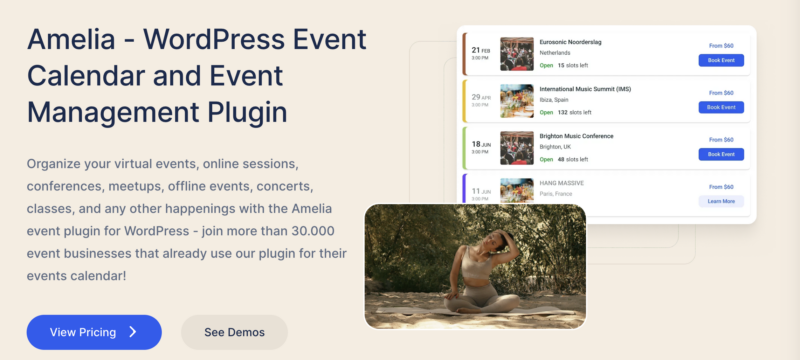
Meet Amelia, the WordPress Event Calendar and Event Management Plugin that transforms the way you organize virtual and offline events, conferences, meetups, and more.
Why choose Amelia as your event planning plugin?
Let’s see the key features of Amelia that will help you kickstart a successful event-planning business:
Responsive and customizable
Amelia is a responsive and customizable WordPress event management plugin designed for various event types. Whether you’re an event agency or conference host, Amelia caters to your specific needs.
Recurring events made easy
One standout feature is the ability to set recurring events with various options. Whether it’s a weekly meeting, monthly conference, or an annual gala, Amelia’s clear calendar view helps you manage them effortlessly.
Seamless booking pages
Create booking pages effortlessly using shortcodes or popular page builders like Divi, Elementor, or Gutenberg blocks. With Amelia, your event booking page can be ready in minutes.
Flexible deposit payments
Amelia allows you to set up deposit payments, enabling attendees to pay a partial amount upfront and the rest upon arrival. This flexibility is especially beneficial for on-site events.
Multilingual support
Hosting events in different languages? Amelia has you covered with its translation option, providing a seamless booking experience for your international audience.
Dynamic ticketing
Set different ticket prices based on attendees’ profiles or the date of purchase. Offer early bird tickets, special prices for adults and kids, and control when sales open and close.
Filter and sort with ease
Create event tags and use different colors to distinguish event types, facilitating easy navigation for both organizers and attendees.
Calendar integration
Amelia integrates with Google Calendar and Outlook, ensuring hosts stay organized, and attendees can add events to their calendars with ease.
Which key features of Amelia simplify event hosting?
Virtual sessions and online events.
Amelia caters to the modern trend of hosting events online . With native integrations with Zoom and Google Meet, organizing virtual conferences becomes a breeze.
SMS and Email Reminders
Ensure a high attendance rate with SMS and email reminders, keeping both organizers and attendees in the loop.
Customer and Employee Panels
Manage all aspects of your event, from attendees to venues, with comprehensive customer and employee panels.
Insightful Admin Dashboard
Get real-time insights into key performance indicators with an admin dashboard that streamlines event management.
Fully Customizable Design
Tailor Amelia to your brand with fully customizable design options for seamless integration with your website.
Custom Fields for Booking Forms
Collect specific information by adding custom fields to your booking forms, enhancing the overall booking experience.
Try Amelia Today
Join the ranks of over 30,000 event businesses that trust Amelia for their events calendar. Explore pricing options and see demos to discover how Amelia can elevate your event planning experience!
Share the article
Sign up and get the latest stories and deals to your inbox!
We won't spam you, we will send just interesting stories and best features once or twice per month.
We care about your data in our privacy policy
Introducing the improved Amelia Cart feature.
Seamlessly book multiple appointments in a single transaction.
- View all new features
- Best Products
How to Start an Event Planning Business – Complete Guide
- April 29, 2024
- by Next What Business Research Team
Are you passionate about bringing people together and creating memorable experiences? Starting an event planning business in India might just be the perfect venture for you. From weddings and corporate gatherings to social events and festivals, the demand for skilled event planners is on the rise in India’s dynamic and diverse market. In this in-depth guide, we’ll explore the step-by-step process of starting your own event planning business and thriving in this exciting industry.
What is Event Planning Business?
An event planning business is a service-oriented venture that specializes in organizing and coordinating various types of events, ranging from weddings and corporate gatherings to social parties and festivals. Event planners work closely with clients to conceptualize, plan, and execute events that meet their specific needs and preferences, ensuring a seamless and memorable experience for attendees.
These businesses may offer a wide range of services, including venue selection, décor and design, catering, entertainment booking, logistics management, and coordination with vendors and suppliers. Event planning businesses play a crucial role in bringing people together and creating memorable experiences that leave a lasting impression.
Is Event Planning Business Right For You?
For people who are interested in getting into the business and contributing to their households, an event planning business is a smart idea. With flexible hours, an event management business provides an opportunity to flex your creative side and business acumen all at once.
If you are better suited to working behind a desk with little customer engagement, then an event management business may not be right for you. If you prefer working alone in a non-collaborative, yet organized environment, then you may want to reconsider this career move.
Finally, if on-the-spot creative thinking is not your strong suit, then your ambitions might be a better fit elsewhere.
However, if client-facing work excites you if teamwork contributes to your happiness, and if a fast-paced work environment fits your pace, managing an event management company might be the perfect business for you.
13 Steps To Start Event Management Business in India
1. research the market.
Before diving into the world of event planning, it’s essential to conduct thorough market research . Identify your target market, understand their preferences, and analyze the competition. Determine the types of events that are in demand in your area and assess the pricing strategies of existing event planning businesses.
2. Think About Your Style
One of the biggest things that is going to set you apart from your competition as an event planner will be your style. Now obviously, your clients may come into your business relationship with a very good idea of what they want for their event.
Or they might come to you because they love what they’ve seen of your work, and they think it matches their style.
In both cases, it is important to create your style of creativity.
3. Identify Your Target Market
Before you begin building your event planning company, it is also important to decide on its focus. The very first step is to choose what kind of events you are going to conduct.
Determine the range of services you’ll offer as an event planner. This may include event conceptualization, venue selection, décor and design, catering, entertainment, logistics management, and coordination with vendors and suppliers. Tailor your services to meet the specific needs and preferences of your clients.
Some event business companies do industry-specific event planning. Others address a niche market. It can be corporate or wedding events. For example, if white-collar events are more suited to your style, then network with industries and companies to organize their events.
4. Develop a Business Plan
A well-crafted business plan is crucial for the success of your event planning venture. Outline your business goals, target market, services offered, pricing structure, marketing strategies, and financial projections. Define your unique selling proposition (USP) and identify how you’ll differentiate your services from competitors.
5. Legal Considerations
Register your business as a legal entity. It can be a sole proprietorship, partnership, or private limited company, depending on your preferences and business structure. Obtain the necessary licenses and permits required to operate an event planning business in your city or state. Ensure compliance with tax regulations and other legal formalities.
GST registration is a must in India presently to run an event management company.
6. Evaluate the Cost of Launching an Event Planning Company
Having some experience working with a reputed event management company will be a big plus. Things will be a lot easier in terms of establishing good relationships with venues and suppliers. Furthermore, it helps in making a list of contacts to get good rates in printing, etc.
Your supplier costs will dictate your pricing for the most part. Just how low you can swing your venue rentals and printing costs will depend on your contacts. Your overheads, if you are working on your own, could be as little as the cost of a phone line and a website.
Marketing and promotions are considerations too. For big event management agencies, manpower costs are high. However, if you are starting from home with a low budget, shouldn’t have to worry too much about salary costs during the early days.
7. Network With Suppliers
To run an event management business, you must have a dedicated team. Other than your team members, a group of reliable suppliers is essential.
Depending on your niche, create a team of suppliers that can provide a wide array of services. It can be a florist, caterer, decorator, interior designer, set designer, printing agency, photographer, and many more.
8. Build a Website For More Exposure
A website not only gives you a platform to showcase your work but also attracts more clients with the help of testimonials. It is also easier to share with potential clients and on social media.
Simply connect the website to your Facebook, Twitter, and YouTube pages and post shareable content regularly. Also, websites are inexpensive and relatively easy to set up.
We have written on how to create your website of your own which will help you through this process in more detail.
9. Market Your Business
There are numerous ways to promote your business . However, before you think about marketing, keep in mind that event planning is a service, and word of mouth is key. Therefore, you’ll want to maintain quality standards in all events that bear your name. With that said, also maintain consistency. This is a long-term marketing strategy as many former clients will recommend you to friends.
In the short term, you can use social media advertising like Facebook and Twitter Ads, brochures and posters, blogging, email marketing, and business cards. The list is long. Choose marketing strategies that meet your needs and that are effective. You may end up trying a few before finding the magic bullet.
Once you get a job, remember to collect lots of photographic evidence for your portfolio and testimonials from your clients. Bring it all together to create a presence for yourself, either online, in print, or both.
10. Take Advantage of Online Markets
In an online market, business owners can reach large numbers of people for a fraction of the cost of traditional advertising. But, you’ll need to know how to use the tools available to you to take the most advantage of them.
Do yourself a favour and get acquainted with both Facebook and Instagram as a minimum. All of these things create a persona for you and your business, almost like an online first impression for your clients.
11. Use Reputable Vendors
Your reputation precedes your business. For every event you plan, you will need a steady supply of materials you can’t provide yourself. It’s, therefore, a good idea to find reputable vendors who can provide you with the right materials promptly. Also, develop a relationship with these vendors to make the next event you plan to run smoothly.
Also, consider that with vendors you have built a relationship with, it is possible to get high deals for lower. The more relationships you build, the more you save. Becoming an event planner will seem even more rewarding because of all the savings you will be making.
12. Develop Your Resource Network
You will need a network of resources to make your parties a reality, such as caterers, entertainers, technical experts, technology suppliers, and marketing experts.
While you organize all of these resources for the event, the vendors will provide the tools necessary. Reach out to friends in the event management industry and check reviews on websites like Yelp to find the right vendors to work with.
13. Let Your Creative Side Out
The important thing to remember throughout the entire process of starting a business, particularly an event planning one, is that creativity is key. You have a head full of great ideas, all of which are just waiting to come out and shine at someone’s event.
Don’t censor your creative side too much as you go along, or let it become too heavily influenced by other people. Remember that not everyone, including your clients, is going to agree with you, but that doesn’t mean they need to change how you think, or how you act.
Conclusion: Event planning business can be a rewarding career path to choose, and starting has never been easier than it is now. Thanks to social media marketing, you can now reach as many people as possible. Take the initiative, because being an event planner will not only keep you occupied but also bring big bucks to the table.
Frequently Asked Questions
Is the event planning business profitable?
Event planning business in India can indeed be profitable, given the growing demand for professionally organized events across various sectors. According to a report by Statista, the event management industry in India in 2023 , the market size of the weddings and allied segments industry was the highest in India at over four trillion Indian rupees.
and is projected to reach over 11 billion U.S. dollars by 2026, exhibiting a compound annual growth rate (CAGR) of over 12% during the forecast period.
What services does an event planning business in India offer?
Event planning businesses in India offer a range of services, including event conceptualization, venue selection, décor and design, catering, entertainment booking, logistics management, and coordination with vendors and suppliers.
How much does it cost to hire an event planner in India?
The cost of hiring an event planner in India varies depending on factors such as the type and scale of the event, the services required, and the reputation and experience of the event planner. Prices typically range from a few thousand rupees to several lakhs, depending on the complexity of the event.
What types of events do event planners in India specialize in?
Event planners in India specialize in various events, including weddings, corporate gatherings, social parties, festivals, conferences, exhibitions, and more. They cater to the diverse needs and preferences of clients across various industries and sectors.
Do event planners in India provide customized event planning services?
Yes, event planners in India often provide customized event planning services tailored to the specific needs and preferences of clients. They work closely with clients to understand their vision and execute it to perfection, ensuring a unique and memorable event experience.
What are the latest trends in event planning in India?
Some of the latest trends in event planning in India include sustainable and eco-friendly events, virtual and hybrid events incorporating technology, personalized and experiential event concepts, and themed events inspired by cultural and social trends.
Can event planners in India assist with destination weddings or events in other cities or countries?
Yes, many event planners in India specialize in destination weddings and events and offer services for events in other cities or countries. They handle all aspects of planning and coordination, from travel arrangements to venue selection and logistics management, ensuring a seamless and unforgettable destination event experience.
- Contact sales
Start free trial
How to Plan an Event: Event Planning Steps, Tips & Checklist

Need to know how to plan an event? If you’re planning a big event like a conference, we can help you successfully create, structure and lay out your event plan. This blog will cover everything you need to consider when planning an event, including event planning steps, tips and an easy-to-use event checklist.
What Is Event Planning?
Event planning is the process of putting on and managing a variety of events, from something as small as a meeting to as big as a convention and everything in between. When event planning you’ll be taking into account every aspect of that event, whether it’s a birthday party or a networking event.
That means you’ll be estimating budgets, creating timelines to schedule the event, reserving the site and any panels or speakers involved, getting necessary permits, food, transportation and more. If the event has a theme, you’ll develop that, too. Plus, you’ll be in charge of securing the needed resources to make the event a success.
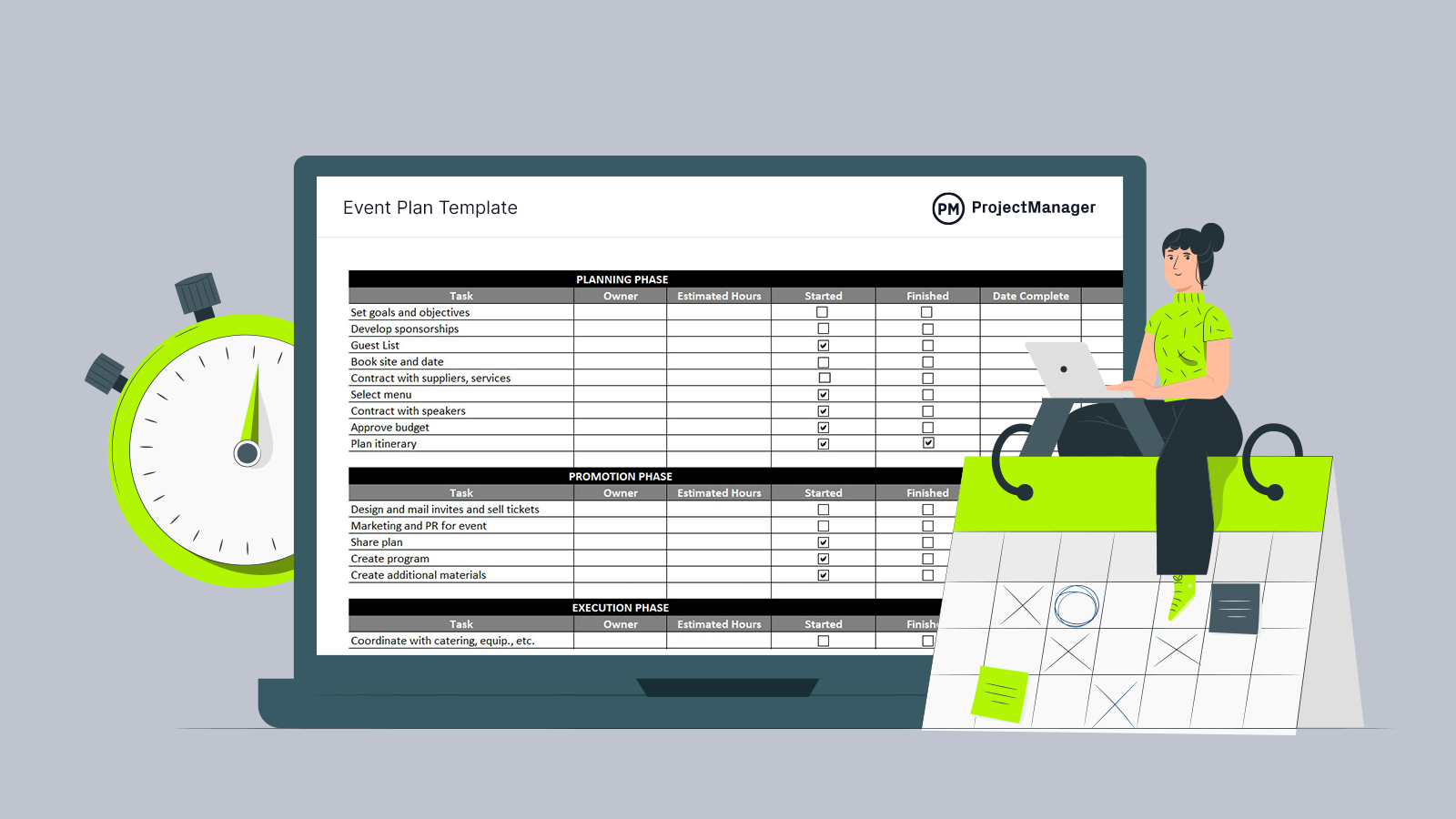
Get your free
Event Plan Template
Use this free Event Plan Template for Excel to manage your projects better.
What Is an Event Plan?
An event plan defines how an event will be executed. It addresses all the components of an event such as the start and end dates, budget , venue, marketing, attendees and more. The scope and complexity of the event plan vary depending on the size of the event, but the fundamental challenges remain the same.
Organizing all those disparate parts, especially for larger events, requires powerful project management software. ProjectManager is award-winning project management software that lets you plan, manage and track your event to ensure it’s a success.
Our powerful Gantt charts help you list all your tasks and the associated resources and costs, assign them to your team and set milestones to track your progress. The whole plan is visible on a project timeline and can be saved by setting a baseline. Now you can track the planned progress against your actual progress to make sure you’re on schedule. Get started with ProjectManager today for free.
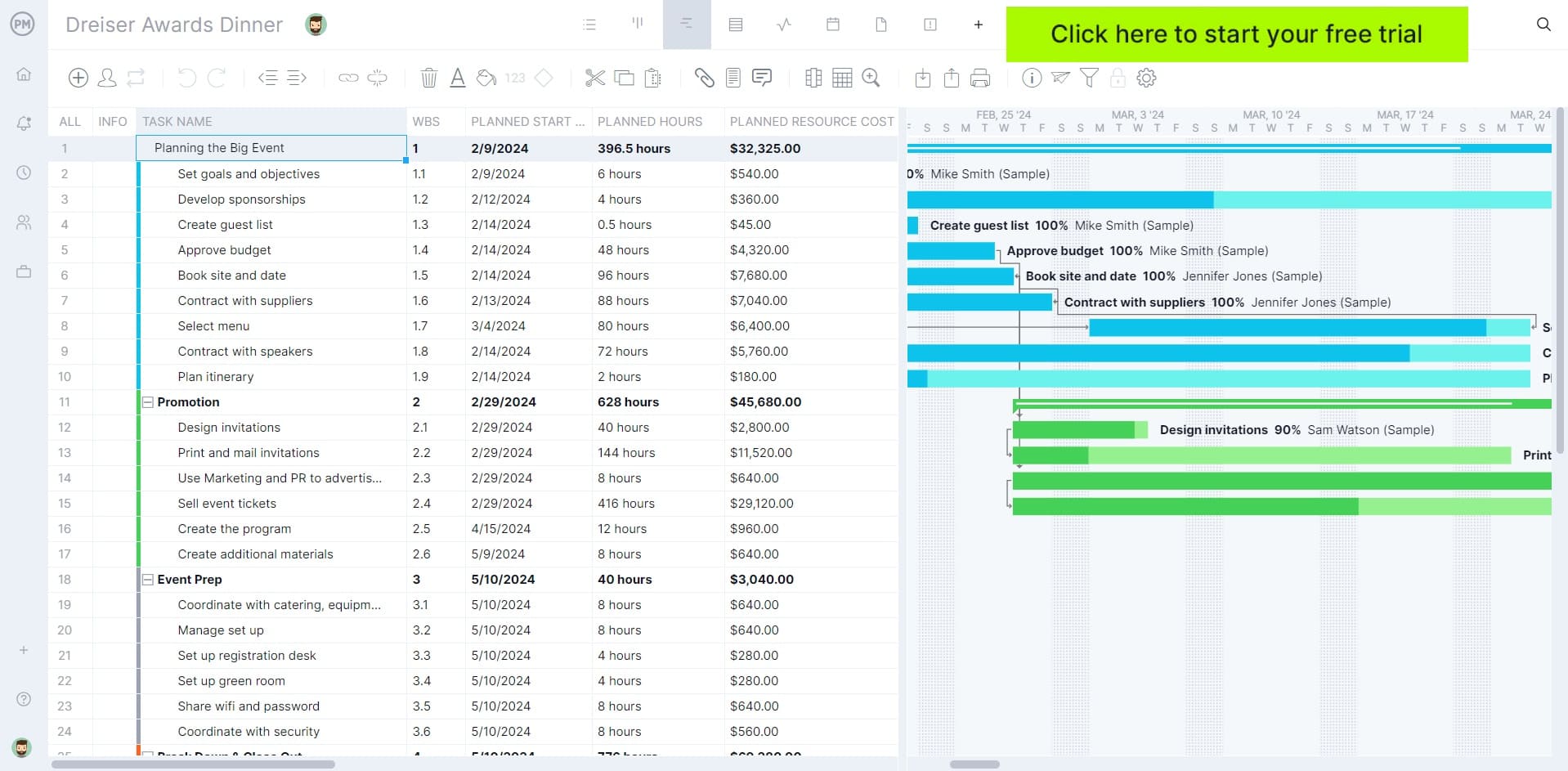
Event Plan Example
Most of us have some experience planning an event, be it at home, work or in our community. For this article, let’s focus on large events.
A conference is a common type of large event, so for our event management purposes, let’s talk about a TEDx conference that we were involved in to illustrate how to plan an event. This example is a good scenario to explain the structure and challenges of planning a big event, along with the benefits of planning an event with project management software .
Let’s break down the other components of setting up an event. They’re summarized below:
- Event timeline: First, establish a timeline for your event. This timeline should include pre-event planning, event execution and post-event activities.
- Budget: Estimate your event costs and create a budget. Your available budget will influence many event management decisions such as your venue, the marketing and advertising methods, etc.
- Venue: The event has to take place somewhere, and that involves logistics management , food and beverages as well as the décor.
- Marketing: Once you’ve selected a venue, you need to start drawing people to it through a marketing program that can include a website, social campaign, email and print work.
- Advertising: Hand in glove with marketing is advertising. That can include radio, TV, newspaper and magazine advertisements.
- Volunteers: A big event needs a big crew of people to get it off the ground and run smoothly. That means volunteers, which means writing contracts, defining their roles, setting up meetings and determining schedules.
- Speakers: You must have a keynote speaker or a group of speakers to attract an audience. This involves contracts, curators to select the talent, a program, bios and rehearsals.
- Sponsors: All of this costs money, and a big event’s budget is supplied by its sponsors. This again involves contracts, marketing and logistics.
- Production: The production involves creating contracts as you work on creating an audio-visual recording of the proceedings, as well as a sound and video broadcast during the event.
- Stage: The event takes place at a specific venue and on that venue is a stage on which the event proper will be presented. That usually incorporates a projector, screen, microphones, internet connection, batteries, cables and more.
- Attendees: Don’t forget about the people attending the event! You’ll need communications to inform them of event information, payment processes to collect fees, emails to stay in touch, directions, badges and access points.
Related: 10 Free Event Planning Templates for Excel & Word
Free Event Plan Template
This free event plan template for Excel is a great tool to start assembling the information you need to create an event plan. It can be customized to add your event details.
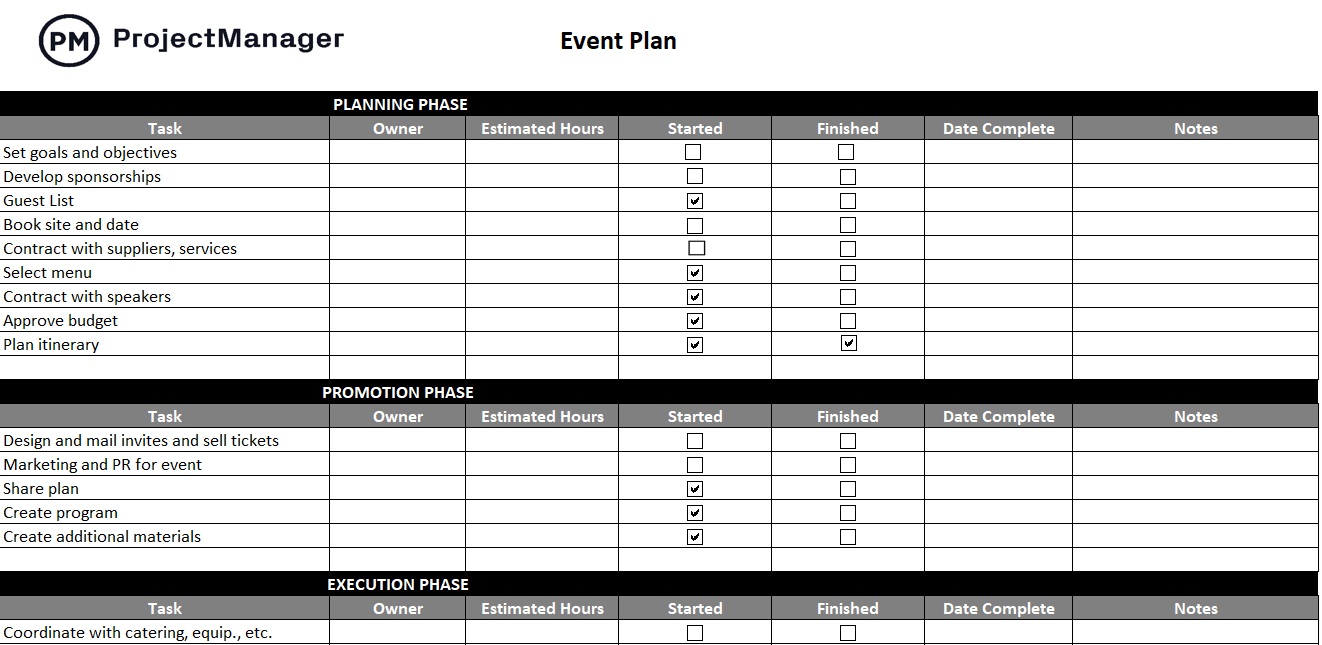
The Event Planning Process: Event Planning Steps
We covered a lot on event planning, so let’s break down those tips into concrete steps. These event planning steps will guide you toward success. Let’s continue with our conference example.
- Step 1. Determine your event goals and objectives
- Step 2. Assemble your team
- Step 3. Establish an event budget
- Step 4. Choose a date & venue
- Step 5. Select the speakers
- Step 6. Event marketing & advertising
- Step 7. Execute your event
When you break down the scope of your event plan into manageable steps, the process seems a lot less daunting. However, there are a few more things to keep in mind when making your event plan.
Event Planning Roles
As you might expect, there are many different roles that work together to bring an event to life. It’s easy to get confused. Are you an event manager or an event planner? Is there any difference between the two? Let’s take a look at some of the more common event-planning roles and define them.
Event Manager
The event manager is often mistaken for the event planner, but they are two distinct roles. Most simply, the event manager is responsible for event management activities, which involve coordinating and implementing the event. They take care of setting up the event, including its design, and make sure the vision of the event planner is realized.
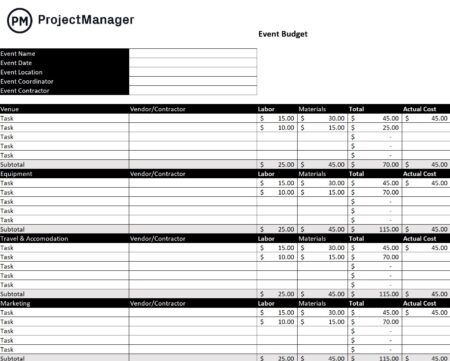
Event Planner
An event planner organizes, coordinates and executes the event. They’re in charge of coming up with the idea, overseeing the setup and breakdown of the event. They’ll select the venue, create the budget and ensure everything is taken care of. What sets them apart is they design the strategy for the event to the smallest detail.

Event Producer
The event producer fleshes out the strategic plan of the event planner. They are the one who takes the idea and turns it into a living event. They will take charge of the technical aspects of the event, such as audio/visual, stage design, etc. They work with the event planner to schedule the event , but the event producer uses their skills and expertise in producing events to deliver the event that’ll impress both attendees and the client.

Event Planning Tips
Unfortunately, there are always going to be variables out of your control that’ll affect the event planning process, such as the weather, delivery delays, technical difficulties and other potential mix-ups. As stated earlier, you can’t change the date of your event, so you’ll want to be as prepared as possible for any risks or issues that may pop up on the day of your event.
Do a Post-Event Review
A post-event review or a post-mortem as they’re often called, is very valuable. By looking back at the past event and seeing what worked and what didn’t work, you can better plan your next event. There are always lessons to be learned and applying them to the next project will avoid previous mistakes and increase your chances of a better outcome.
Use Event Planning Templates
Having an event planning template is a great way to make sure you’re not missing any important pieces of the larger event. It’ll help you organize your tasks and resources, costs and more. Use our free event plan template to get started on the right foot.
Use Event Planning Tools
A template is fine, but limited. You have to manually update everything and it’s not very collaborative. Event planning tools, such as Gantt charts , kanban boards, task lists and calendars, help you plan and implement the event plan. They also allow you to track the work to make sure it’s following the plan, which leads to a more successful event.
Prepare a Plan B
As important as your plan is, there can be issues with it. There might be acts of god, such as weather, which negatively impact the event. Whatever the cause, you’ll need a backup. That’s why developing a plan B is so critical to the success of the event. You might never have to use it, but in case you do, you’re prepared.
Use an Event Planning Checklist
Another tip is to have a checklist made up. That way you can collect all the things you have to do and why you’re doing it in one place. Using a checklist for event planning can be done in conjunction with project planning tools . The more safeguards, the better. Also, there are few things more satisfying than crossing something off your list.
Event Planning Checklist
There’s a lot to manage when planning an event, so it’s important to have a list of everything you need to include in your event management plan. The following is a general event planning checklist to help you get started. The more questions you ask, the better your event checklist. Feel free to add your own unique responsibilities and tasks.
Goals and Objectives
- What’s your event’s reason for existing?
- What are the goals this event is expected to achieve?
- What are the revenue objectives?
- What is your target audience?
- How many people will attend?
- Is there a cost associated with ticketing and what is it?
- Where is the event being held?
- Create an event schedule.
Event Budget
- Figure out what the costs will be
- If you held similar events, use and adjust an old budget for a baseline
- What ticketing and registration software will be used?
- Finalize sponsor contributions
- Set ticket price
Date & Venue
- When will the event take place?
- Have a backup date in case issues arise
- Is there the best location for the event?
- Is the venue appropriate for your expected number of attendees?
- Decide on needed infrastructure: wifi, capacity, bathrooms, near shopping & restaurants, etc.
- Hire a caterer
- Secure what equipment you’ll need
- What are your security needs?
- Do you need permits, licenses or insurance?
- Create event signage and communication plans for attendees
- Research potential speakers
- Create a list of relevant speakers
- Create a pitch for speakers
- Pitch speakers
- Finalize speaker selection, get bios and headshots and arrange travel and accommodations
- Develop a list of sponsors and what you can offer them.
- See if there are sponsors who have partnered with similar events.
- Reach out to potential sponsors.
- Design signoff.
- Update the site or build a unique one.
- Make sure the site can handle expected traffic.
- Have a mobile-friendly site.
Event Marketing & Advertising
- What’s your messaging?
- Coordinate with digital tools and social platforms
- Add the event to online calendars
- Market the event with blog posts and other promotions like videos and online ads
- Send reminders to all parties a month or two before the event date
Finalizing the Last Steps
- Speakers and scripts
- Decorations
Pro tip: That’s a lot to coordinate and plan, which is why there’s a need for project management software that has the right features for event management. It provides a common portal, where you can track costs and tasks with automated alerts. It also offers both a communication and a collaborative platform that reduces the need for unnecessary emails. Software collects all your files in one place and makes team reporting simpler by adding efficiencies and reducing stress.
ProjectManager Offers Robust Event Planning Tools
ProjectManager is online software that’s suited for event planning. We have event project management tools to keep all the parts of your events, from managing vendors to promotions, organized. Our planning software helps you keep track of all the elements that make up your event plan.
Keep Stakeholders Updated With Event Calendars
Our multiple project views mean that event planners and managers can use project calendars , Gantt charts and there are task lists and kanban boards for teams. While reports can keep stakeholders informed, they might want to have access to the project. Share the calendar view with your stakeholders, which allows them to see start and end dates for all the tasks as well as milestones. This manages their expectations.
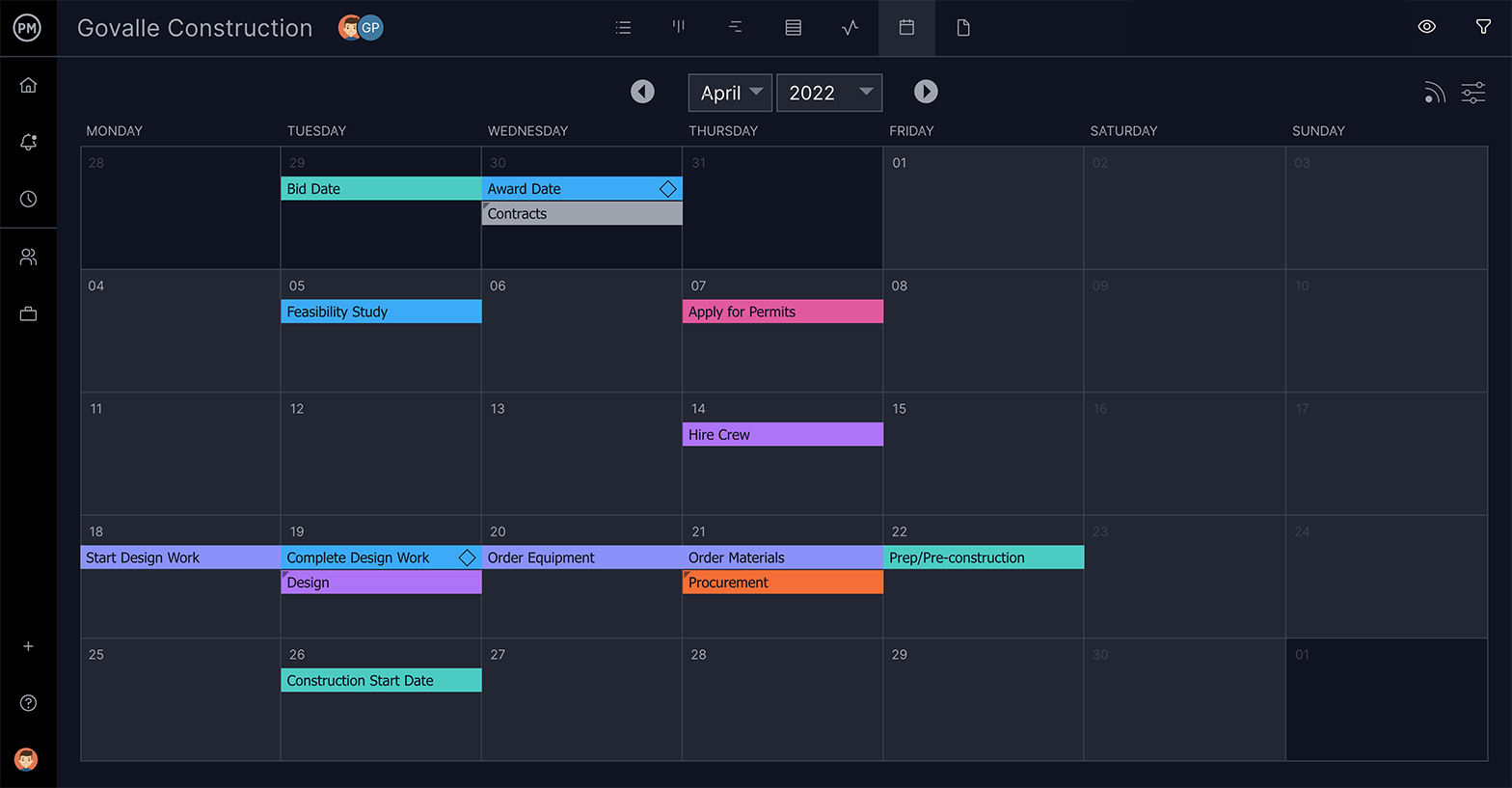
Zoom Into Event Activities With Kanban Boards
Use ProjectManager’s kanban board to manage the daily activities that need to be executed to plan, schedule and track your event plan. Move tasks from column to column as you collaborate on work with your team, and it’s easy to spot bottlenecks and get everything over the line in time for the event.
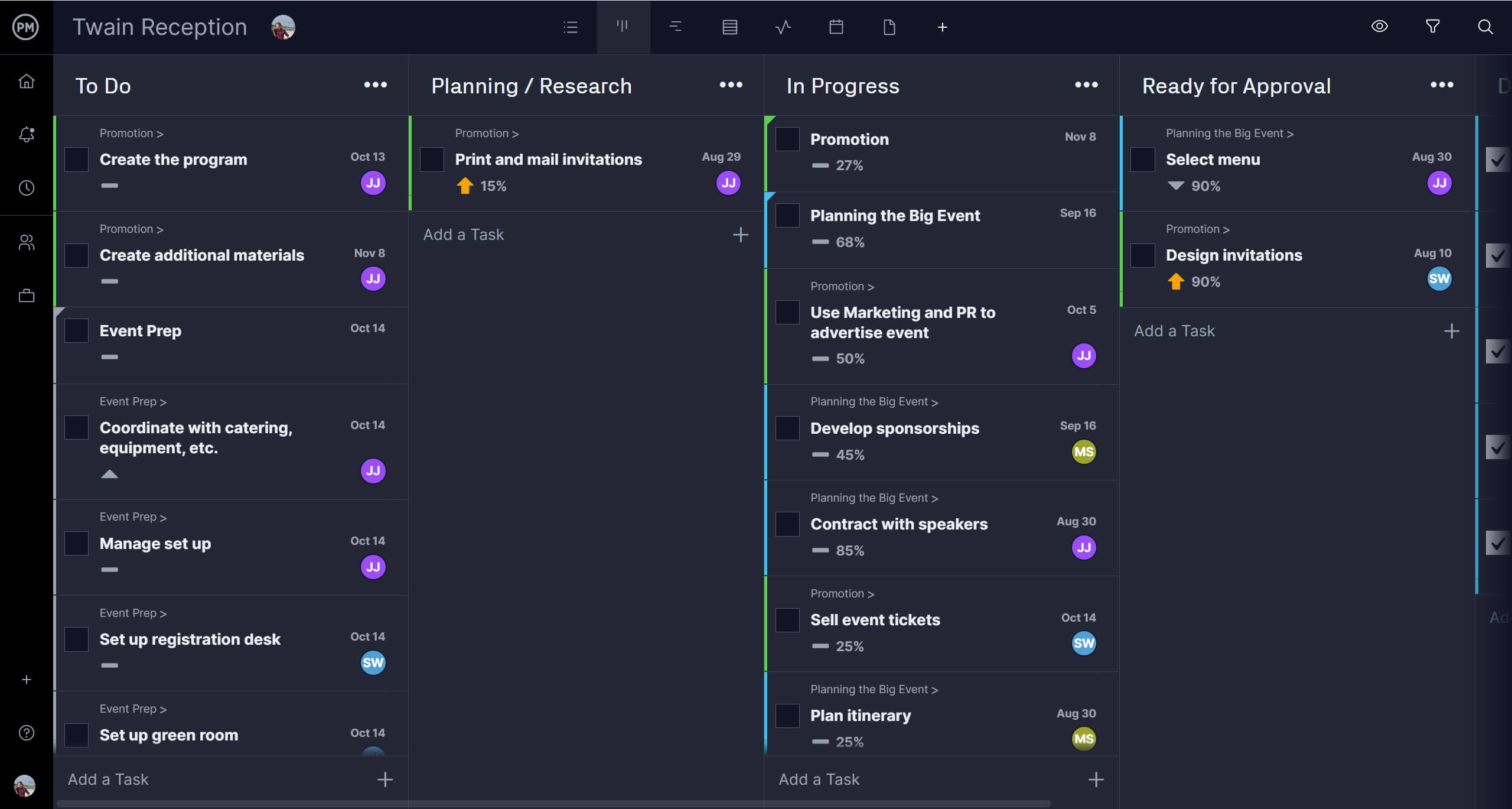
Track Event Labor Costs With Timesheets & Real-Time Dashboards
Plus, timesheets make invoicing easy for all your events. They can be submitted and approved with a keystroke. Our software also offers a variety of views, from a list to a calendar and even a kanban board that helps you visualize the workflow to keep on task.
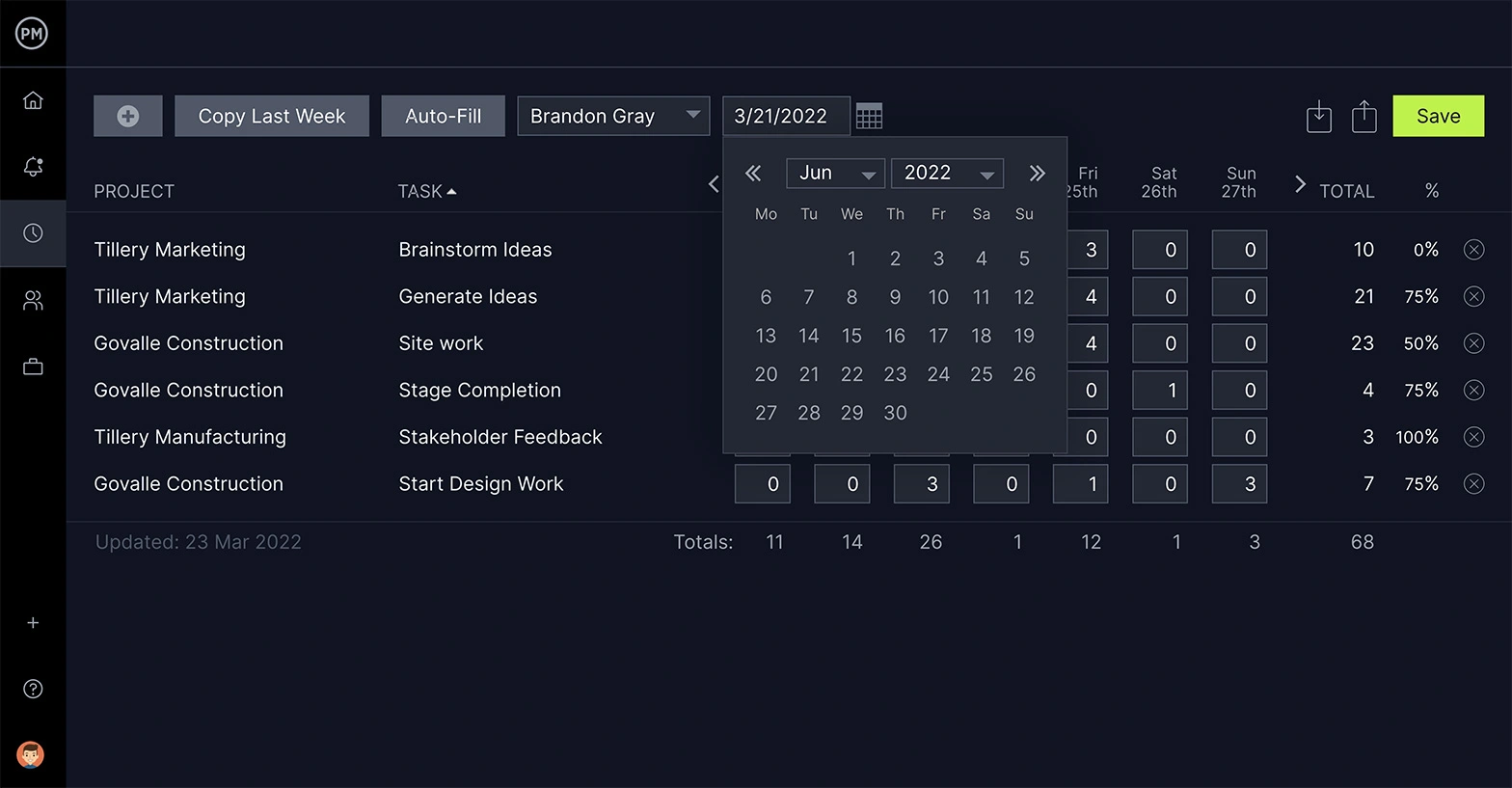
More About Planning an Event
Event planning can be complex. There’s a lot of balls to keep in the air. If the above is too much to digest immediately, you could start with our event plan template and watch one of our planning experts. Jennifer Bridges, PMP, has years of experience and uses it to teach you the fundamentals of event planning in this short video.
Related Content
- Free Event Proposal Template
- Event Management: A Quick Guide
- How to Plan a Virtual Event: Virtual Event Planning Checklist
- Event Project Management Software
ProjectManager is award-winning project management software that helps you plan and monitor your event details. From powerful planning tools to real-time reports and dashboards that capture all of your event details, you can use our software to stay on schedule and stick to your planned budget. Try our software today with a free 30-day trial.

Deliver your projects on time and on budget
Start planning your projects.
Event Planning Simplified: Scheduling Tips
- Event Management

Master event planning with The Events Calendar's scheduling tips and tools. Simplify your process from ticketing to execution. Get started today!
Let’s face it, planning an event can be a real headache. There are a million things to keep track of, and it’s easy to feel overwhelmed. Fortunately, with a few simple scheduling hacks, you can take the stress out of event planning and actually enjoy the process!
First things first — you need a solid event planning schedule. This is your roadmap to success, and it’ll help you:
- Stay on top of all the moving parts and ensure nothing falls through the cracks.
- Keep your team in the loop and make sure everyone’s on the same page.
- Avoid last-minute panic attacks and pull off a flawless event.
But what does a great event planning schedule include?
In this article, we’ll spill the beans and give you a step-by-step guide to creating a schedule that actually works. Plus, we’ll introduce you to a nifty tool — The Events Calendar — that will make your life a whole lot easier.
Step-by-step guide to creating your event schedule
Here’s an overview of the key considerations and steps in creating a comprehensive event schedule.
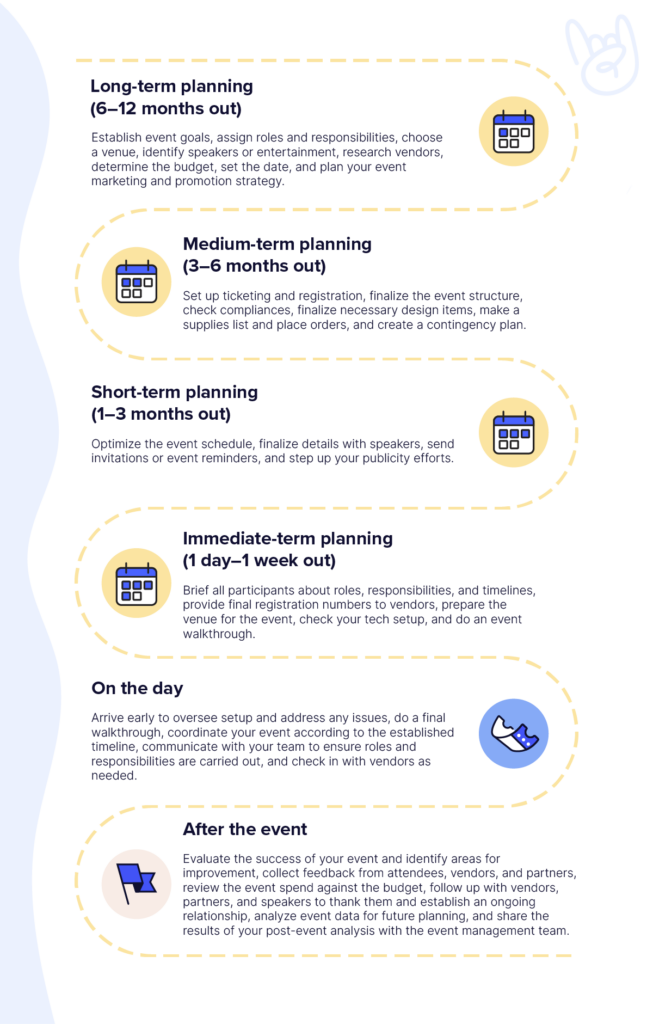
Long-term planning (6–12 months out)
The first step in creating a successful event planning schedule is to start well in advance, typically 6–12 months before your event. This phase is crucial for setting the foundation for your event and ensuring you have enough time to secure key elements such as your venue, speakers, and vendors.
1. Establish event goals
Determine what you want to achieve from the event. This could be generating revenue, raising awareness for a cause, or providing education and networking opportunities for attendees.
Set SMART (Specific, Measurable, Achievable, Relevant, and Time-bound) goals and Key Performance Indicators (KPIs) to help guide your decision-making throughout the planning process.
For instance, these could be ticket sales, attendance numbers, revenue generated, or survey results measuring attendee satisfaction.
2. Assign roles and responsibilities
Identify your event team members and assign roles based on their skills and expertise. This may include positions for an event coordinator, marketing manager, volunteer coordinator, or sponsorship lead.
Identify any gaps in your team that need to be filled by external vendors, such as event planners, graphic designers, or Audio-Visual (AV) technicians.
Establish clear lines of communication and maintain ongoing contact with your team throughout the planning process to ensure everyone stays on track and informed.
3. Choose a venue
If you’re not using your own venue, research and select one that meets your event requirements. Consider capacity, location, accessibility, amenities, and overall ambiance.
Be aware of any additional requirements or restrictions associated with the venue, such as insurance, equipment rental, liquor licenses, or preferred vendors.
Book your venue well in advance to secure your desired date and avoid conflicts with other events.
4. Identify speakers/entertainment
Based on your goals and target audience, determine the type of presenters, entertainers, or speakers needed for your event.
Research potential candidates and reach out to check their availability and fees. Be sure to communicate your event goals, target audience, and specific requirements or expectations. Consider having backup options in case your first choice is unavailable or falls through.
5. Research vendors
Identify the external vendors and suppliers needed for your event, such as catering, audio-visual equipment, decorations, or transportation.
Research potential vendors and request quotes to compare prices and services. Read reviews and ask for references to ensure you’re working with reputable and reliable companies.
You can also consider negotiating prices or package deals to get the best value for your budget.
6. Determine the budget
Establish cost estimates for all aspects of your event, including venue rental, vendors, supplies, insurance, marketing, and any other expenses.
Develop an initial budget based on these estimates and your available funds. Be sure to include a contingency fund for unexpected costs or last-minute changes.
Look for ways to reduce costs or generate additional revenue, such as securing sponsorship, offering early bird discounts, or partnering with other organizations.
7. Set the date
When selecting a date, consider factors such as holidays, competing events, and target audience availability. Confirm everything with your venue, speakers, vendors, and other key stakeholders before finalizing your event date. Once your date is set, communicate it to all involved parties and start promoting your event.
8. Plan event marketing and promotion
“Effective event promotion is about creating a narrative that captivates your audience from the moment they hear about your event until the day it happens. Start early, and tell your story well.” Jaime Marchwinski | Product Marketing Manager at The Events Calendar
Set up an event website or dedicated page on your existing site to provide information and updates about your event . Start designing promotional materials such as logos, flyers, and social media graphics. Consider hiring a professional designer to ensure a polished and cohesive look.
Develop a marketing plan that includes email campaigns, social media promotions, press releases, and other tactics to reach your target audience. Consider securing event sponsors to help offset costs and expand your reach. You can also offer tiered sponsorship packages with various benefits and recognition levels. Refer to our guide to event promotion for more ideas and strategies.
Tackle these long-term planning tasks well in advance and stay organized throughout the process to set yourself up for a smooth and successful event. Remember to stay flexible and adapt as needed, and don’t hesitate to seek help or advice from experienced event planners or resources like The Events Calendar!
Medium-term planning (3–6 months out)
As your event date draws closer, it’s time to shift your focus to the medium-term planning tasks. This phase typically takes place 3–6 months before your event and involves finalizing key details and ensuring everything is on track.
1. Set up ticketing and registration
About three to six months before the event is the right time to begin selling tickets and accepting signups. This ensures that you have sufficient time to promote the event but not so much that people will forget about it altogether!
Consider using a tool like Event Tickets by The Events Calendar to streamline the process, as it allows you to sell tickets and accept RSVPs directly on your WordPress website.
2. Finalize the event structure
Develop a detailed schedule and agenda for the day, including breakout sessions, networking opportunities, and other activities that will take place during the course of the event. Consider the logistics required for each aspect of the event, such as audio-visual equipment, seating arrangements, catering needs, and more.
3. Check compliance
Ensure all necessary permits, licenses, and insurance, such as event permits, liquor licenses, liability insurance, etc., are in place for your event.
4. Finalize necessary design items
Approve final designs for invitations, programs, physical tickets, signage, etc. Place orders as early as possible to have plenty of time in hand for printing and delivery.
5. Make a supplies list and place orders
Compile a list of items needed for the event beyond what vendors and the venue will provide, such as name tags, decorations, promotional items, and more. Start placing orders based on event signups to avoid overspending or running short of merchandise.
6. Create a contingency plan
No matter how well you plan ahead, there will always be some hiccups during an event. Your best bet is to anticipate everything that can go wrong and prepare contingency plans for all those scenarios. Problem with the venue’s audio? Line up backup speakers. Technical trouble while prepping for your main act? Have alternative entertainment options to stall the crowd.
Make sure you also check with vendors about their contingency plans. And if you are the kind of person who needs backup plans for backup plans, you can also create alternative arrangements for catering and transportation, so nothing in your event goes amiss.
Stay organized and proactive during the medium-term planning phase so you’ll be well-positioned to handle any challenges and ensure a smooth and successful event. Remember to communicate regularly with your team and partners, ask for help or advice if needed, and stay flexible in the face of unexpected situations.
Short-term planning (1–3 months out)
As your event draws near, it’s time to focus on the final details and preparations. In the short-term planning phase, you will be optimizing your schedule, finalizing arrangements with partners, and ramping up your publicity efforts.
1. Optimize the event schedule
Finalize the day’s plan and make any necessary adjustments to the schedule . Build in contingency time for potential delays or changes on the day. Ensure that the schedule allows for smooth transitions between activities.
2. Finalize details with entertainment/speakers
Confirm final details with speakers, entertainers, vendors, and other partners. Discuss and finalize their specific requirements and expectations and ensure that all contracts are signed and in place. Manage any necessary transportation and accommodation arrangements for participants.
3. Send invitations or event reminders
Depending on the type of event, send out invitations to prospective guests with all relevant event details, such as date, time, location, and dress code. For events with existing RSVPs, send follow-up messages to remind attendees of the upcoming event and provide any additional information or updates that may be helpful. The Events Calendar’s Promoter add-on is ideal for scheduling and sending email marketing communications to attendees.
4. Step up your publicity efforts
Ramp up your marketing efforts to generate buzz and increase attendance. Use social media platforms to promote your event and engage with your target audience. Create event-specific hashtags and encourage attendees to share their excitement.
Send targeted email campaigns to your mailing list, highlighting key features and benefits of attending. Use multiple marketing channels, such as paid advertising or media partnerships.
Immediate-term planning (1 day–1 week out)
As the event day approaches, it’s crucial to focus on the final preparations and ensure that all participants are well-informed and ready to contribute to the event’s success. This involves the following:
1. Brief all participants about roles, responsibilities, and timelines
Ensure that all parties involved in the event are clear on their specific roles and responsibilities. Provide final details and timelines for the day of the event. Communicate any last-minute changes or updates to the schedule or logistics.
2. Provide final registration numbers to vendors
Inform vendors of the final number of guests attending the event and ensure that they are prepared to accommodate the expected number of attendees. Confirm any last-minute adjustments to orders or services based on the final count.
3. Prepare the venue for the event
Begin setting up the venue as early as possible to ensure everything is ready for the event day. Coordinate with the venue staff to arrange furniture, decorations, and other necessary elements. If the venue is in high demand, preparation may need to take place on the day of the event itself.
4. Check your tech setup
Test all technology and equipment that will be used during the event. Conduct sound checks for performers and speakers and ensure that audio-visual equipment, such as projectors and microphones, are functioning properly. Troubleshoot any technical issues and have backup plans in place.
5. Do an event walkthrough
Once the venue is fully set up, conduct a thorough walkthrough of the event space. Identify any potential issues or areas that need additional attention. Make necessary adjustments to the layout, signage, or other elements to ensure a smooth flow.
The day of the event is when all your hard work and planning come together. It’s essential to be well-prepared, organized, and ready to handle any last-minute challenges that may arise.
As our Director of Customer Success and Support and event veteran Jennifer Theodore puts it,
“I’ve talked to hundreds of people about troubleshooting issues on D-day. If I’ve learned one thing from these conversations, it’s this — when the big day arrives, it’s all about keeping your cool and rolling with the punches. Make sure your team is ready to tackle any issues, have your backup plans in place, and focus on making the event great for everyone.” Jennifer Theodore | Director of Customer Success and Support at The Events Calendar
1. Arrive early to oversee setup and address any issues
Allow plenty of time to carry out the final event setup and make any necessary adjustments. Address any last-minute issues or concerns promptly to ensure a smooth start to the event.
2. Do a final walkthrough
Conduct a thorough walkthrough of the event space to ensure everything is set up correctly. Double-check that all technology, equipment, and amenities are functioning as intended. Make any final adjustments to the layout, signage, or other elements to optimize the event flow.
3. Coordinate your event according to the established timeline
Nobody likes an event that doesn’t start on time or has lengthy delays. Ensure that yours stays on schedule throughout the day. Keep track of time and communicate with your team to ensure that all activities and transitions occur as planned.
4. Communicate with your team to ensure roles and responsibilities are carried out
Maintain regular communication with your event team to keep everyone informed and on track. Ensure that all team members are fulfilling their assigned roles and responsibilities. Provide support, guidance, and troubleshooting as needed to keep the event running smoothly.
5. Check in with vendors as needed
Have your team available to assist vendors, speakers, entertainers, or other partners with any issues. Regularly check in with vendors to ensure they have everything they need and are providing services as expected.
After the event
Once your event has concluded, it’s important to take the time to evaluate its success, gather feedback, and analyze data to inform future planning efforts. This post-event phase is crucial for identifying areas of improvement, strengthening relationships with partners, and setting the stage for even more successful events in the future.
1. Evaluate the success of your event and identify areas for improvement
Measure the success of your event against the SMART goals and KPIs established during the planning phase. Identify areas where the event exceeded expectations and areas that need improvement.
2. Collect feedback from attendees, vendors, and partners
Send a feedback survey to attendees to gather insights on their experience and suggestions for improvement. Ask vendors and partners for their feedback on the event organization as well, and discuss how the process could be improved for future events. You can use this feedback to inform future planning and decision-making.
3. Review the event spend against the budget
Evaluate the financial data from your event, comparing predicted vs. actual costs. Analyze profit/loss margins and identify areas where costs could be optimized for future events.
4. Follow up with vendors, partners, and speakers to thank them and establish an ongoing relationship
Send thank-you messages to vendors, partners, and speakers, expressing your appreciation for their contributions to the event’s success. Identify vendors and partners that impressed you and work to build stronger relationships with them for future events.
5. Analyze event data for future planning
Review demographic information about your attendees to understand your target audience better. Analyze the relationship between your marketing efforts and ticket sales to identify the most effective promotional channels. Use this data to inform future event planning, marketing strategies, and budgeting decisions.
6. Share the results of your post-event analysis with the event management team
Celebrate your event’s successes and acknowledge team members’ hard work. Identify areas for improvement and discuss strategies for addressing them in future events.
Tips for optimizing your event planning timeline
Creating an effective event planning timeline is essential for ensuring your event is a success. Here are some practical tips to help you optimize your event planning process and make the most of your time:
- Communicate consistently with your event management team. Schedule regular check-ins and updates to ensure that everyone is aligned on the event vision, goals, and responsibilities. This will help you identify potential issues early on and make necessary adjustments to keep your event on track.
- Establish anchor points, i.e., non-negotiable times by which specific actions must be completed. The most common examples of anchor points are payment deadlines for the venue, vendors, or other partners. If these deadlines aren’t accounted for and get missed, it could throw the entire event into jeopardy.
- Add buffer time to your planning schedule. This extra time will allow you to adapt to extended vendor timelines or other circumstances without derailing your entire event.
- Leverage event management tools like The Events Calendar to streamline your planning process. These tools can help you keep track of important dates, communicate with your team, and manage registrations and ticketing. Plus, centralizing your event information and tasks in one place can help you save time and reduce the risk of important details falling through the cracks.
- Regularly review and adjust your timeline as the event progresses. This will allow you to adapt to any changes and communicate them to your team and stakeholders.
Take it from the pros — the most important thing is to stay flexible, communicate clearly, and use the tools and resources available to make your event planning as smooth as silk.
Master your event schedule with The Events Calendar
Creating and managing a successful event schedule can be a daunting task, but with the right tools and resources, it doesn’t have to be. The Events Calendar is the perfect partner for planning and managing your events, offering a comprehensive suite of free and premium plugins that cover all aspects of event management.
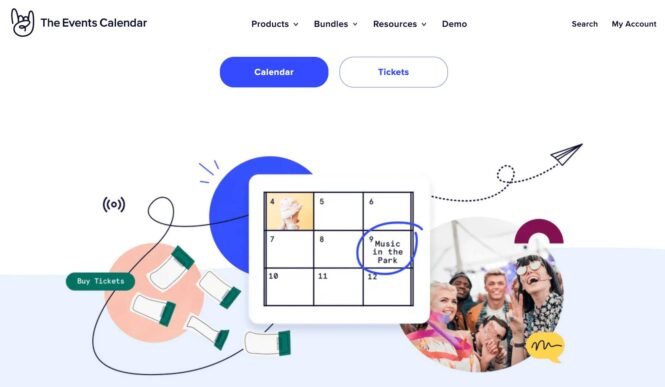
With The Events Calendar, you can:
- Easily create, customize, and share events in an intuitive calendar view on your WordPress website.
- Use the user-friendly interface to add event details, set recurring events, and categorize your events for easy navigation.
- Integrate with Google Maps to display event locations and provide directions for your attendees.
With the Event Tickets plugin, you can sell tickets directly on your website, set up custom registration forms, and manage attendee information. You can also send customized notifications to your attendees, keeping them informed and engaged throughout the event planning process.
Promoting your events is another key aspect of successful event management, and we’ve got you covered there too. With the Promoter plugin, you can easily engage your community with regular, automated, and personalized email notifications. You can create targeted email campaigns based on attendee preferences, send reminders leading up to the event, and follow up with post-event surveys and thank-you messages.
The California Bluegrass Association (CBA) has the right idea – they use The Events Calendar to showcase a wide range of traditional musical events and performances across the state and beyond. By using the calendar view, custom event fields, and email notifications, the CBA has been able to keep its community informed and engaged, resulting in increased attendance and participation!
Take your next step in event planning mastery
As we’ve seen, there are many factors to consider when planning an event , from setting clear goals and assigning roles to selecting vendors and event promotions. However, even with a well-crafted plan in place, you’ll still need the right tools to help you create, manage, and promote your events effectively. This is where The Events Calendar comes in, offering a powerful suite of plugins that streamline every aspect of event management.
Whether you’re a seasoned event planner or just getting started, The Events Calendar provides the flexibility and functionality you need to take your events to the next level. So why not take your next step in mastering event planning today?
Unlock the full potential of your events and create meaningful experiences that resonate with your audience. Take control of your event schedule like never before by getting started with The Events Calendar !

Get Started With Osum
Unlock the future of market research
Insight Engine
Get instant market analysis.
Persona Profiler
Discover your ideal customer.
SWOT Persona Profiler
Strengths, weaknesses, in seconds.
Trend Tracker
Spot opportunities, avoid threats.
Sharpen your brand's focus.
Journey Mapper
Chart customer experience effortlessly.
Sales Optimizer
Maximize ROI on each prospect.
Content Catalyst
Campaign ideas, crystallized.
And Much More...
Experience unparalleled market mastery.
Politics latest: 'Elephant in the room' at Starmer's first NATO summit - as allies stress support for Ukraine
Sir Keir Starmer is at his first NATO summit since becoming prime minister, with Ukraine top of the agenda. He will be meeting with plenty of world leaders for the first time too, including under-pressure Joe Biden.
Wednesday 10 July 2024 23:37, UK
- General Election 2024
PM at NATO summit
- The prime minister is in Washington DC for his first NATO summit, where he's meeting world leaders including Joe Biden and calling for the alliance's members to spend more on defence
- PM watches Harry Kane penalty - and will travel to Euros final
- Starmer pictured with Biden for first time
- PM to 'reset' relations with allies - and send message to Putin
- 'No change in UK support for Ukraine,' Starmer tells Zelenskyy
- 'Elephant in the room': Government urged to help 'Trump-proof' NATO
- Mark Stone analysis: Starmer in unusual position at all-important summit | Ukraine the focus - but something is going unsaid
- Deborah Haynes analysis: PM's pledge looks weak to allies and foes
- Sky News Daily: How does Starmer reach out to the world?
- Live reporting by Tim Baker
That's all from the Politics Hub for today.
Join us again tomorrow as the NATO summit continues.
We're also expecting a day of coverage on water, as Ofwat gives its ruling on prices early doors.
Sir Keir Starmer has met with Joe Biden in the White House.
The pair have been pictured together in the Oval Office laughing.
Sir Keir Starmer is set to address the NATO summit tomorrow, speaking at a session on Ukraine.
He will say: "NATO was founded by the generation who defeated fascism. They understood not just the value of our strength, but the strength of our values.
"Those values are under attack once again. Putin needs to hear a clear message ringing out from this summit – a message of unity and determination, that we will support Ukraine with whatever it takes, for as long as it takes to uphold our shared values and our shared security."
Sir Keir will also recommit to the £3bn per year support package for Ukraine promised under the previous government.
It follows today's announcement that the UK will be part of a £40m package to provide vital assistance to Kyiv - including on drone protection.
And a fresh order of 120,000 artillery shells, worth £300m, will also be placed by the UK-administered International Fund for Ukraine.
Overcrowding in Britain's prisons is one of the domestic crises facing the new government, one which saw the previous Tory administration allow for the early release of some prisoners.
Sir Keir Starmer had pressed Rishi Sunak to guarantee this wouldn't include any high-risk inmates - and has been asked whether he can make the same promise now he's prime minister.
Speaking from the sidelines of the NATO summit in Washington DC, the PM said: "We will make a statement, in relation to this in coming days."
Sir Keir said this would include the question of "risk categories", and "what we intend to do about it".
Thousands of inmates could be let out early
It comes after Sky News reported an announcement was due in the coming days.
Sky News understands one of the core proposals being considered is a lowering of the automatic release point, from the 50% mark in an inmate's sentence to 40% or 43%.
At the moment, prisoners serving standard determinate sentences - those with fixed end dates - are released at the halfway point.
Once released, they serve their sentence on licence - meaning they are supervised by the probation service in the community and must stick to certain conditions.
A lowering of the automatic release point could mean thousands of additional inmates being let out early.
Mark Icke, president of the Prison Governors Association., said they welcomed the announcement.
He said: "We look forward to the government announcing their proposed measures and are hopeful that it will be an approach that is clear and can be effectively delivered by staff in prisons and the probation service.
"We're hopeful that the penal populism of the last government is a thing of the past and that the new government is willing to invest in our service so that we can effectively protect the public by reducing the likelihood of reoffending by those in our prisons and under supervision in the community."
Following the meeting of NATO leaders, a declaration has been agreed by the members and published.
Part of this is in support of Ukraine.
It starts off by saying: "We fully support Ukraine's right to choose its own security arrangements and decide its own future, free from outside interference.
"Ukraine's future is in NATO."
The countries note that Ukraine is working to meet the requirements to join the alliance.
The declaration goes on to say: "As Ukraine continues this vital work, we will continue to support it on its irreversible path to full Euro-Atlantic integration, including NATO membership.
"We reaffirm that we will be in a position to extend an invitation to Ukraine to join the alliance when allies agree and conditions are met."
The declaration repeats criticisms of Russia, and calls for it to withdraw its troops from Ukraine.
In the last few minutes, England beat the Netherlands to make it through to the final of Euro 2024.
Downing Street has confirmed Prime Minister Sir Keir Starmer will be attending the match in Berlin on Sunday.
Sir Keir managed to watch part of tonight's match despite being at a NATO summit in the US.
Good evening. It's 10pm and here is your final bulletin of the day.
We've been focusing on the NATO summit in Washington this evening, as Sir Keir Starmer carries out his first engagement on the world stage as prime minister.
Here's what you need to know:
- Sir Keir Starmer has held his first meetings with world leaders at his first NATO summit as prime minister, including with Germany's Olaf Scholz and Ukraine's Volodymyr Zelenskyy;
- He has also taken part in a NATO council meeting, and been pictured alongside Joe Biden and Jens Stoltenberg;
- As well as the summit itself, Sir Keir will also be heading to the White House for talks with Mr Biden - where he and his wife Victoria will also join a special dinner tonight with other leaders and their partners;
- The PM has also found time to watch the England match with his Dutch counterpart.
- But the PM is under pressure to set a timeline for when the UK will hit the defence spending target of 2.5% of GDP given he wants NATO allies to spend more too;
- Our defence and security editor Deborah Haynes says the government being non-committal on a timescale will look weak to both its allies and foes;
- Nonetheless, our US correspondent Mark Stone reckons Sir Keir will be a welcome presence at the summit, given it comes less than a week after his landslide election win at a time when other Western leaders are struggling.
- The Conservative Party leadership competition plunged into further chaos, with rivals Suella Braverman and Kemi Badenoch clashing on social media;
- Former Tory MP and minister James Heappey revealed who he thought should be in the running to replace Rishi Sunak - and encouraged his party not to get in a battle with Reform;
- Rishi Sunak appeared before backbench Tory MPs, and once more apologised for his party's performance in the election.
On today's Daily, Niall Paterson is joined by Sky's political correspondent Tamara Cohen to discuss how Sir Keir is tackling his first international visit.
Plus, Lord Peter Ricketts, former diplomat and French Ambassador, joins Niall to take a look at Labour's wider foreign policy plans.
👉 Click to subscribe to the Sky News Daily wherever you get your podcasts 👈
As part of his visit to the US, Sir Keir Starmer has met political leaders in Washington.
This includes the US Republican speaker of the House Mike Johnson, and the Democrat minority leader Hakeem Jeffries.
Sir Keir is set to meet Joe Biden later this evening.
Sir Keir Starmer, the prime minister, has taken a step away from the NATO summit to catch up on the football.
He has shared a video of himself and his Dutch counterpart Dick Schoof watching the Harry Kane penalty.
As Sir Keir says in the tweet, he "picked the right moment" to watch.
Follow live updates on the England vs Netherlands game below...
As the new prime minister makes his international debut at the NATO summit in Washington – what does he need to do to make a quick impact with international colleagues?
On today's Daily, Niall Paterson is joined by political correspondent Tamara Cohen to discuss how Sir Keir is tackling his first overseas visit.
Plus, Lord Peter Ricketts, former diplomat and French ambassador, joins Niall to look at Labour's wider foreign policy plans.
Be the first to get Breaking News
Install the Sky News app for free


COMMENTS
Here are some important questions to consider before launching an event planning business, and a step-by-step guide to starting and scaling your business.
This guide will help you learn how to start a event planning business. Topics include market research, competitive analysis, registering an EIN, obtaining business insurance, and other important elements of a successful event planning business.
Quick Steps to Start an Event Planning Business. Conduct Industry and Market Research. Identify Your Event Planning Niche. Prepare an Event Planning Business Plan. Consider Startup and Operations Costs. Paperwork and Legal Registration. Figure Out Pricing Strategy. Get Licenses, Permits, and Insurance. Build a Core Team.
Master how to start an event planning business in 6 steps. Get expert tips on creating a solid business plan, marketing your services, and more.
In this guide, we'll discuss everything about event planning and provide a step-by-step guide on how to start your own event-planning business. This post covers everything from determining profitability to understanding the skills you need to run a successful business.
Entrepreneurs: Here's how to take your event planning skills to the next level. Follow this guide to start your own event planning and consulting firm.
Learn about event planning businesses, explore how to start your own in seven easy steps and review the value and benefits of businesses in this field.
Starting an event planning business can be an exciting and rewarding venture. This complete guide on how to start an event planning business will walk you through every step, from initial planning and market research to marketing strategies and client management.
Learn how to start your own event planning business with these 11+ easy steps. From branding to marketing, we cover it all. Start your business today! #eventplanning #businessstartup #entrepreneur
Follow these simple steps to start a successful event management business. Learn about Certifications, Marketing Analysis, Financial Plans & more.
Use our step-by-step guide to start your own event planning business and set it up for success. Discover expert tips and everything else you need to know.
Discover the key steps and insider tips to launch your successful event planning business. Turn your passion into a thriving career!
Follow these 15 actionable steps to help you start an event planning business, along with tips on attracting clients and earning repeat business.
Get your event planning business off the ground with 8 easy steps. Discover how to start an event planning business and launch your business today!
There's a lot to consider when you're starting an event planning business. Here are six key things you need to do before launching your company.
It takes a whole lot of creativity, energy, organization, and people skills to thrive in the event planning industry—but if you have those qualities, being an event planner can be a career to celebrate. Knowing how to start an event planning business is your first order of business.
Starting a new business in event planning can be a very profitable venture. However, it takes a lot of hard work and dedication to get started. In this blog post, we'll teach you how to start an event planning business from scratch in 6 easy steps!
To truly understand the event planning market, you must immerse yourself in its dynamics. This involves staying informed about the latest trends, emerging technologies, and shifts in consumer behavior. Analyze how global and local events impact the industry, keeping an eye on event statistics and other crucial data.
An event planning business is a service-oriented venture that specializes in organizing and coordinating various types of events, ranging from weddings and corporate gatherings to social parties and festivals. Event planners work closely with clients to conceptualize, plan, and execute events that meet their specific needs and preferences, ensuring a seamless and memorable experience for ...
A great way to ensure that your event planning business can handle these events is to have a solid business plan in place. This allows your business to approach each event with strategy and organization. Keep reading to learn more about the do's and don'ts when it comes to starting your own event planning business.
Need to know how to plan an event? If you're planning a big event like a conference, we can help you successfully create, structure and lay out your event plan. This blog will cover everything you need to consider when planning an event, including event planning steps, tips and an easy-to-use event checklist.
Step-by-step guide to creating your event schedule. Here's an overview of the key considerations and steps in creating a comprehensive event schedule. Long-term planning (6-12 months out) The first step in creating a successful event planning schedule is to start well in advance, typically 6-12 months before your event.
Event planning can be stressful, but it doesn't have to be. Get a list of all the essential steps for a successful event.
When planning your meeting, start with the basics. When planning a meeting, one of the first things you should do is determine the objective and purpose of the event and identify how it can promote your organization's brand. Developing an appropriate theme for the meeting can accomplish these first steps.
Essential Steps to Start. Starting a grazing table business requires careful planning and understanding of the event needs. By following essential steps, you can set a solid foundation for your business and ensure its success.
Politics latest: Starmer defends cabinet snub - as 'YIMBY' chancellor vows 'planning revolution' Chancellor Rachel Reeves has delivered her first major speech in the role, pledging a "planning ...